The Leading Voices in Food
 E289: Posting calorie counts on menus should be just one strategy of many
E289: Posting calorie counts on menus should be just one strategy of many
December 16, 2025
In April, 2022, England introduced a mandatory calorie labeling requirement for large food-away-from-home food outlets or out of home food outlets. The big idea behind the policy was that by showing the kilocalorie content of menu items, food businesses may reformulate their offerings, and consumers may choose lower calorie options. Results from a study that asked the question – Did the energy content of menu items actually change? – were recently published in the British Medical Journal. In today’s episode, researchers Jean Adams of the University of Cambridge and Mike Essman from Duke University’s World Food Policy Center will discuss the study in detail, including its strengths, limitations, and implications. And then explore how it fits into the wider policy landscape around food labeling and public health.
Related Podcasts: Diet & Nutrition | Eating Disorders | Food Industry Behavior & Marketing | Food Policy | Food, Psychology & Neuroscience |
 E288: Farmlink’s responsive, logistical success preventing food waste
E288: Farmlink’s responsive, logistical success preventing food waste
December 8, 2025
Today we’re speaking with Aidan Reilly, co-founder and chief of External Affairs at the Farmlink Project, a national nonprofit connecting farmers with surplus produce to communities facing insecurity. What’s especially interesting about Farmlink (https://www.farmlinkproject.org/) is that it was started by college students in 2020 as a response to the food supply challenges our nation experienced during the COVID-19 pandemic. The project is now a nationwide movement of college students who provide a key logistical link in a food system that currently sees up to a third of all food produced go to waste. The program delivers fresh produce to food banks as opposed to packaged or processed foods at zero cost, as opposed to charging delivery fees.
Related Podcasts: Agriculture & Tech | COVID-19 Pandemic Impacts on Food | Food Banks, Food Pantries & Soup Kitchens | Food Waste & Implications |
 E287: Food policy insights from government agency insider Jerold Mande
E287: Food policy insights from government agency insider Jerold Mande
November 25, 2025
We speak today to nutrition and policy expert Jerold Mande, the CEO of Nourish Science, a non-governmental organization focused on solving the country’s nutrition crisis. Jerry is also an adjunct professor of nutrition at the Harvard School of Public Health and a fellow at the Tisch College of Civic Life at Tufts University. Jerry has had a long and distinguished public policy career. Among his posts in government, he served in the Food and Drug Administration (FDA) and served as Deputy Undersecretary for Food Safety at the US Department of Agriculture in charge of Food Safety and Inspection Service (FSIS) from 2009 to 2011. He co-founded Nourish Science in 2022 with a goal of ensuring every child reaches age 18 at a healthy weight and in good metabolic health.
Related Podcasts: Addiction & Food | Diet & Nutrition | Economics of the food system | Food Industry Behavior & Marketing | Food Policy | History & Food |
 E286: How ‘least cost diet’ models fuel food security policy
E286: How ‘least cost diet’ models fuel food security policy
October 31, 2025
Governments use something called a ‘least cost diet’ to monitor food access, inform policy discussions, and target interventions to improve food security and nutrition. So, what is the least cost diet? Well, it’s a minimum amount of money needed to purchase a nutritionally adequate diet. Today we are lucky to have two researchers who share an interest in working with least cost diets, understanding their efficacy and thinking about that both domestically in the US and internationally. Our guests today are food and nutrition policy economists Will Masters and Parke Wilde from Tufts University’s Friedman School of Nutrition, science and Policy.
Related Podcasts: Climate Change, Environment & Food | COVID-19 Pandemic Impacts on Food | Economics of the food system | Food Policy | International Food & Ag Policy |
 E285: Gut instincts, food, and decision making
E285: Gut instincts, food, and decision making
October 23, 2025
The gut is in the news. It’s really in the news. Catapulted there from exciting developments coming from laboratories all around the world. Links of gut health with overall health are now quite clear and surprising connections are being discovered between gut health and things like dementia and Alzheimer’s. But how does the gut communicate with other parts of the body in ways that make it this important, and where does the brain figure into all this? Well, there’s some interesting science going on in this topic, and a leading person in this area is Dr. Diego Bohorquez. Dr. Bohorquez is the associate professor of medicine, of molecular genetics and microbiology and of cell biology at the Duke University School of Medicine.
Related Podcasts: Diet & Nutrition | Microbiome | Ultra-processed Food & Additives | Zero Calorie Sweeteners |
 E284: The Science of How Food Both Nourishes and Harms Us
E284: The Science of How Food Both Nourishes and Harms Us
October 16, 2025
An avalanche of information besets us on what to eat. It comes from the news, from influencers of every ilk, from scientists, from government, and of course from the food companies. Super foods? Ultra-processed foods? How does one find a source of trust and make intelligent choices for both us as individuals and for the society as a whole.A new book helps in this quest, a book entitled Food Intelligence: the Science of How Food Both Nourishes and Harms Us. It is written by two highly credible and thoughtful people who join us today.Julia Belluz is a journalist and a contributing opinion writer for the New York Times. She reports on medicine, nutrition, and public health. She’s been a Knight Science Journalism Fellow at MIT and holds a master’s in science degree from the London School of Economics and Political Science. Dr. Kevin Hall trained as a physicist as best known for pioneering work on nutrition, including research he did as senior investigator and section chief at the National Institutes of Health. His work is highly regarded. He’s won awards from the NIH, from the American Society of Nutrition, the Obesity Society and the American Physiological Society.
Related Podcasts: Addiction & Food | Food, Psychology & Neuroscience | History & Food | Obesity | Ultra-processed Food & Additives |
 E283: Taylor Hanson’s Food On The Move
E283: Taylor Hanson’s Food On The Move
September 24, 2025
Today we’re joined by Tulsa, Oklahoma, native Taylor Hanson, who at age nine with two of his brothers formed the band Hanson. Within five years, they released their initial album there were Grammy nominations and one of their songs hit number one in 27 countries. But more pertinent to our discussion today is Taylor’s commitment to social change, which includes work he’s done on extreme poverty in sub-Saharan Africa and the nonprofit grassroots organization addressing food insecurity he founded called Food On The Move. Food On The Move provides access, education and innovative solutions to transform food deserts and the legacy issues created by food insecurity. Since its founding, this organization has distributed millions of pounds of fresh produce to members of the Oklahoma community as a leader in the movement to reshape sustainable local food systems.
Related Podcasts: Advocacy & Food | Community & Economic Development | COVID-19 Pandemic Impacts on Food | Economics of the food system | Food Insecurity | Philanthropy & Food Systems | Urban Agriculture |
 E282: Are healthy, environmentally sustainable diets economically achievable for everyone?
E282: Are healthy, environmentally sustainable diets economically achievable for everyone?
September 17, 2025
In today’s episode, we’re discussing the complex and urgent topic of global food demand. The United Nations Sustainable Development Goals, or SDGs, ask countries to make measurable progress in reducing poverty, achieving zero hunger, and supporting every individual in realizing good health. While also mitigating climate change, sustaining the environment and responsible consumption and production habits. Researchers have recommended sustainable diets – planetary health diets. For example, the Eat Lancet Planetary Health Diet. However, others have criticized some of these diets for not addressing the economic and social impacts of transitioning to such diets. Is it possible to balance changing diets, rising incomes, and economic growth with economic feasibility, environmental impact, and long-term sustainability? Well, that’s what our goals are today. Our guests today are Andrew Muhammad of the University of Tennessee Institute of Agriculture, and Emiliano Lopez Barrera from Texas A&M. They are my co-authors on a new paper in the Annual Review of Resource Economics entitled Global Food Demand: overcoming Challenges to Healthy and Sustainable Diets.
Related Podcasts: Agriculture & Tech | Climate Change, Environment & Food | Community & Economic Development | Economics of the food system | International Food & Ag Policy |
 E281: Is ultra-processed food still food?
E281: Is ultra-processed food still food?
August 28, 2025
In this episode, Dr. Chris van Tulleken, a physician and professor from University College London, discusses the alarming reality of ultra-processed foods (UPFs) and their impact on our health. Van Tulleken details his own month-long experiment consuming UPFs, resulting in significant weight gain and various health issues. He explains the scientific definition of UPFs, their industry-driven design to enhance addictiveness, and the broader implications on public health. The conversation delves into the addiction potential of UPFs, their effect on brain chemistry, and the critical need for policy change to address these issues. Hosted by Kelly Brownell, this episode offers a thorough, eye-opening exploration of why we can’t stop eating food that isn’t really food.
Related Podcasts: Addiction & Food | Childhood Obesity | Diet & Nutrition | Food Industry Behavior & Marketing | Food Policy | Food Safety & Food Defense | Food, Psychology & Neuroscience | Obesity | Ultra-processed Food & Additives |
 E280: Industry user fees could fix a food safety loophole for FDA
E280: Industry user fees could fix a food safety loophole for FDA
August 25, 2025
The Food and Drug Administration or FDA regulates roughly 78% of the US food supply. This includes packaged products, food additives, infant formula, ultra-processed foods, and lots more. However, an analysis by the Environmental Working Group found that 99% of new food ingredients enter our food supply through a legal loophole that skirts FDA oversight and seems, to me at least, to be incredibly risky. Today we’re speaking with two authors of a recent legal and policy analysis published in the Journal Health Affairs. They explain what this loophole is and its risks and suggest a new user fee program to both strengthen the FDA’s ability to regulate food ingredients and address growing concerns about food safety. Our guests are Jennifer Pomeranz Associate Professor of Public Health Policy and Management at New York University School of Global Public Health and Emily Broad, director of Harvard Law School Center for Health Law and Policy Innovation.
Related Podcasts: Food Industry Behavior & Marketing | Food Policy | Food Safety & Food Defense |
 E279: Feed Us With Trees – the surprising importance of nuts
E279: Feed Us With Trees – the surprising importance of nuts
July 31, 2025
Every day, with few exceptions, I eat a handful of nuts. Usually a combination of almonds, walnuts, pecans, cashews, and pistachios. And they taste good for sure. But I’m responding mainly to research showing that consumption of nuts is related to less chronic disease. In particular, eating nuts lowers levels of inflammation related to heart disease and diabetes, and may improve cholesterol levels among other benefits. So, I saw it as welcome news that someone has just published a book about nuts, all aspects of nuts, actually. Today we’re joined by NPR, food Writer Elspeth Hay author of a new book called Feed Us with Trees- nuts, and The Future of Food. And I had no idea. Nuts were so interesting until I dove in a little bit. Elspeth has gathered stories from dozens of nut growers, scientists, indigenous knowledge keepers, researchers and food professionals. She writes that humans once grew their staple crops in forest gardens of perennial nuts, such as oaks, chestnuts, and hazelnuts in these species. Particularly important to the environment as well as to human wellbeing.
Related Podcasts: Agriculture & Tech | Alternative Proteins | Climate Change, Environment & Food | History & Food | Regenerative Agriculture |
 E278: Here’s how screen time affects our kids’ eating, activity, and mental health
E278: Here’s how screen time affects our kids’ eating, activity, and mental health
July 15, 2025
Parents, educators, public health experts, legal officials like State Attorneys General, and a surprisingly bipartisan collection of legislators have raised alarms and taken action to control the impact of digital media on children. There are a great many issues to be concerned about, one of which is food, nutrition, and health. Today’s guests are in a unique position to address this issue and help us think of a path forward. Dr. Amanda Staiano is associate professor in Pediatric Obesity and Health Behavior at the Pennington Biomedical Research Center, which is affiliated with Louisiana State University. Dr. Thomas Robinson is the Irving Schulman Endowed Professor in Child Health and professor of Pediatrics and of Medicine at the Stanford University Medical School. Dr. Staiano and Robinson have done groundbreaking work on children’s exposure to digital media.
Related Podcasts: Addiction & Food | Child Development & Nutrition | Childhood Obesity | Food Industry Behavior & Marketing | Food Policy | Obesity | Screen time and Food | Ultra-processed Food & Additives |
 E277: Food Fight – from plunder and profit to people and planet
E277: Food Fight – from plunder and profit to people and planet
June 27, 2025
Today we’re talking with health and nutrition expert Dr. Stuart Gillespie, author of a new book entitled Food Fight: from Plunder and Profit to People and Planet. Using decades of research and insight gathered from around the world, Dr. Gillespie wants to reimagine our global food system and plot a way forward to a sustainable, equitable, and healthy food future – one where our food system isn’t making us sick. Certainly not the case now. Over the course of his career, Dr. Gillespie has worked with the UN Standing Committee on Nutrition in Geneva with UNICEF in India and with the International Food Policy Research Institute, known as IFPRI, where he’s led initiatives tackling the double burden of malnutrition and agriculture and health research. He holds a PhD in human nutrition from the London School of Hygiene and Tropical Medicine.
Related Podcasts: Economics of the food system | Equity, Race & Food Justice | Food Industry Behavior & Marketing | Food Policy | History & Food | International Food & Ag Policy |
 E276: Climate Change – A little less beef is part of the solution
E276: Climate Change – A little less beef is part of the solution
June 20, 2025
Interest and grave concern have been mounting over the impact of agriculture and the food choices we all make on the environment, particularly on climate change. With natural weather disasters occurring much more frequently and serious threats from warming of the atmosphere in general, it’s natural to look for places to make change. One person who has thought a lot about this is our guest today, Dr. William Dietz of George Washington University. He’s been a prominent voice in this space. Bill, you’re one of the people in the field I respect most because our relationship goes back many years. Bill is professor and director of research and policy at the Global Food Institute at George Washington University. But especially pertinent to our discussion today is that Dr. Dietz was co-chair of the Lancet Commission on the global syndemic of obesity, under nutrition and climate change. Today, we’ll focus on part of that discussion on beef in particular.
Related Podcasts: Agriculture & Tech | Alternative Proteins | Climate Change, Environment & Food | Regenerative Agriculture |
 E275: Against the Grain – A Plea for Regenerative Ag
E275: Against the Grain – A Plea for Regenerative Ag
June 16, 2025
I was at a professional meeting recently and I heard an inspiring and insightful and forward-looking talk by journalist and author Roger Thurow. Roger was a reporter for the Wall Street Journal for 30 years, 20 of them as a foreign correspondent based in Europe and Africa. Roger has written a number of books including one on world hunger and another what I thought was a particularly important book entitled The First 1000 Days, A Crucial Time for Mothers and Children and the World. Now comes a new book on farmers around the world and how they are coping with the unprecedented changes they face. It was hearing about his book that inspired me to invite Mr. Thurow to this podcast and thankfully he accepted. His new book is entitled Against the Grain: How Farmers Around the Globe are transforming Agriculture to Nourish the World and Heal the Planet.
Related Podcasts: Advocacy & Food | Agriculture & Tech | Climate Change, Environment & Food | Voice of Farming |
 E274: Sweet and Deadly – Coca-Cola in the spotlight
E274: Sweet and Deadly – Coca-Cola in the spotlight
June 5, 2025
Recently I was asked to review a forthcoming book for American Scientist magazine. The book was entitled, Sweet and Deadly: How Coca-Cola Spreads Disinformation and Makes us Sick. I did the review, and now that the book has been published, I’m delighted that its author, Murray Carpenter, has agreed to join us. Mr. Carpenter is a journalist and author whose work has appeared in publications such as the New York Times, and the Washington Post, and has been featured in places like NPR’s All Things Considered and Morning Edition.
Related Podcasts: Addiction & Food | Food Industry Behavior & Marketing | Soda Taxes |
 E273: Feeding innovation by taste testing alternative proteins
E273: Feeding innovation by taste testing alternative proteins
May 29, 2025
As someone who’s been mostly vegetarian for a number of years, I have tried a lot of plant-based foods and there’s a variety of them. And so how do they really taste, not just from my perspective? Well, it’s really important to do really careful analysis, and this is going to be the subject of our conversation today. Plant-based foods are becoming increasingly healthier and cheaper. But one large question really remains for consumers. How do they taste. NECTAR, a nonprofit initiative on a mission to accelerate the alternative protein transition sets out to answer this question. Through large scale blind taste tests with thousands of consumers. NECTAR is amassing the largest publicly available sensory database on alternative protein products. In its latest report, Taste of the Industry 2025, NECTAR conducted blind sensory panels of 122 products across 14 categories and uncovered which products have achieved the taste that’s on par with their animal-based counterparts. Today we talk with NECTAR’s Director, Caroline Cotto, about which products are meeting and exceeding consumer taste expectations and what the alternative protein industry needs to do to get more products to this level. And how NECTAR’s novel dataset can be used to get there faster.
Related Podcasts: Agriculture & Tech | Alternative Proteins | Climate Change, Environment & Food |
 E272: Why getting food date labeling right is so darn tough
E272: Why getting food date labeling right is so darn tough
May 22, 2025
Do you pay attention to information printed on food labels? From eye-catching designs companies use to entice you to buy a product to nutrition facts panels to the tiny dates printed on packages. There’s a lot going on to be sure. For policymakers, they hope that refining date labels on food packaging will help reduce the amount of uneaten food ending up in landfills. Food Waste is a major contributor to greenhouse gas emissions. The Food and Drug Administration and the Food Safety and Inspection Service recently asked for public input on food date labels. So, we decided to gather some experts together to talk about this important policy tool. Roni Neff is a professor in the Johns Hopkins Bloomberg School of Public Health and Senior Advisor at the School’s Center for a Livable Future. Her research looks at the intersection of food waste policy, climate change, and food system resilience. Brian Roe is a professor at the Ohio State University Department of Agricultural, Environmental and Developmental Economics. His work focuses on issues including agricultural marketing, information policy, behavioral economics, and product quality. Ruiqing Miao is an associate professor of agricultural economics and rural sociology at Auburn University’s College of Agriculture. His research emphasizes sustainability, innovation, and decision making.
Related Podcasts: Climate Change, Environment & Food | Food Industry Behavior & Marketing | Food Waste & Implications |
 E271: Grappling with digital food and beverage marketing to youth
E271: Grappling with digital food and beverage marketing to youth
May 13, 2025
So even the people that follow the topic closely are stunned by the digital landscape that engulfs our children, how quickly it evolves, and the potential social cost. Two people in a unique position to explain all this are our guest today, Jeffrey Chester and Kathryn Montgomery, both from the Center for Digital Democracy. Jeff is executive director of the Center, and Kathryn is its research director and senior strategist, as well as professor emerita of communication at American University. Jeff and Kathryn have been pioneers in this work and have been uniquely strong voices for protecting children.
Related Podcasts: Advocacy & Food | Children Food Preferences | Food Industry Behavior & Marketing | Screen time and Food |
 E270: Do food labels influence kids shopping choices?
E270: Do food labels influence kids shopping choices?
April 16, 2025
As any parent knows, it is really important to help our children to make healthy food choices. I know as a father who cooks for my child, it is really critical that I introduce her to fruits and vegetables and encourage whole grains and try to manage the amount of additional sugars, but it’s hard. We do this with the goal of trying to make sure that our child is able to eat healthy once she leaves the home. That she’s able to make healthy choices there. But it’s not just about the future. My child is making choices even today at school and outside of school, and the question is, can we help her make those choices that are going to lead to healthy food outcomes?
Do food labels on products encourage children to make healthy food choices if it indicates good ingredients? Or would labels that warn against nutrients of concern actually discourage kids from using those or consuming those products? Today we’re going to actually explore those questions in a particular context- in Chile. In 2016, the Chilean government implemented a comprehensive set of obesity prevention policies aimed at improving the food environment for children. Last year on this podcast, we actually explored how the Chilean food laws affected school food purchases. But now today, we’re going to explore how food labels are influencing youth outside of school. It is my pleasure to welcome back my colleagues, Gabriela Fretes, who is an associate research fellow at the International Food Policy Research Institute, or IFPRI; and Sean Cash, who is an economist and chair of the Division of Agriculture, food and Environment at Tufts University at the Freedman School of Nutrition, Science and Policy.
 E269: Children, screen time and wellbeing – many reasons for concern
E269: Children, screen time and wellbeing – many reasons for concern
April 9, 2025
The amount of time children and adolescents spend with a screen is absolutely stunning. Lots of people, including parents, health leaders, educators, elected leaders from both parties I might mention, and even children themselves, are highly concerned and are discussing what might be done about all this. I’m delighted to begin this series of podcasts on children and screen time. Today we’re welcoming two very special guests who can talk about this topic in general, and especially about what’s being done to protect children and adolescents. Several podcasts will follow this one that deal with food and nutrition in particular. Our first guest, Kris Perry, is Executive Director of Children and Screens, an organization devoted to protecting children. In the digital world by addressing media’s impact on child development, communicating state-of-the-art information, and working with policymakers. Prior to joining children in Screens, Kris was senior advisor of the Governor of California and Deputy Secretary of the California Health and Human Services Agency. Our other guest, Dr. Dimitri Christakis is a professor of pediatrics at the University of Washington School of Medicine, and director of the Center for Child Health Behavior and Development at Seattle Children’s. He’s also editor-in-chief of JAMA Pediatrics and both Chief Scientific Officer and Chair of the Scientific Advisory Board of Children and Screens. He’s also the co-editor of a new book that I’m very excited to discuss.
Related Podcasts: Addiction & Food | Child Development & Nutrition | Food Industry Behavior & Marketing | Screen time and Food |
 E268: Why Corporate Control of Agriculture is Cause for Concern
E268: Why Corporate Control of Agriculture is Cause for Concern
March 26, 2025
How big is too big? When it comes to corporate concentration many observers raise concerns about the tech industry. However, in the new book, Titans of Industrial Agriculture: how a few giant corporations came to dominate the farm sector and why it matters, political economist Jennifer Clapp draws attention to the overwhelming shadow a small handful of transnational corporations cast over the global agricultural sector. Professor Clapp argues that these corporations hold concentrated power over the agricultural sector that keep industrial agricultural practices entrenched in patterns of production, despite the concerns of the social, ecological and health impacts to society. She explains how we got to this point and what it might take to make changes. Jennifer’s work at the intersection of the global economy, food security, and food systems, and the natural environment, looks specifically at issues of global governance. She is currently a member of the International Panel of Experts on Sustainable Food Systems, and a member of the Scientific Advisory Committee of the UN Food Systems Coordination Hub.
Related Podcasts: Agriculture & Tech | Climate Change, Environment & Food | Community & Economic Development | Economics of the food system | Food Industry Behavior & Marketing | History & Food | International Food & Ag Policy |
 E267: Nzatu uses bees and ancient grains to uplift African farmers
E267: Nzatu uses bees and ancient grains to uplift African farmers
March 24, 2025
The climate crisis is devastating the ability of African farmers to support themselves and their communities. Farmers struggle with a lack of running water, electricity, communications, and public transportation. Entire communities are often cut off from the larger world, exacerbating and extending the poverty crisis that grips large parts of the continent. To overcome these issues, our guest, Gwen Jones, co-founded Nzatu Food Group, a regenerative agriculture business designed to protect biodiversity and mitigate climate change. Nzatu Food Group has done some remarkable pioneering work. Gwen is connected to 15,000 Sub-Saharan farmers across 15 countries through beekeeping, sustainable agricultural and conservation training, and by building an increasingly international market for farm products.
Related Podcasts: Agriculture & Tech | Climate Change, Environment & Food | Community & Economic Development | Economics of the food system | History & Food | International Food & Ag Policy | Voice of Farming |
 E266: What’s next for school meal quality?
E266: What’s next for school meal quality?
March 13, 2025
The food and nutrition landscape in our schools is really important. School meals affect the health, wellbeing, energy, vitality, and ability to learn for millions and millions of children. And for those whose family struggled to buy food, the importance of school meals cannot be overstated. This makes decisions about what foods are served in schools and where they come from. Highly consequential and raises issues about national and state nutrition policies, the influence of big food companies in shaping this picture and lots more. It’s a good time to unravel all this, which we can do today. Thanks to two experts with us. Dr. Marlene Schwartz is Professor of Human Development and Family Sciences and Director of the Rudd Center for Food Policy health at the University of Connecticut. Mara Fleishman is CEO of the Chef Ann Foundation, where she has been a leader advancing school food change, advocating for scratch cook meals that promote children’s health and for more sustainable food systems.
Related Podcasts: Advocacy & Food | Child Development & Nutrition | Childhood Obesity | Community & Economic Development | School Meals | Ultra-processed Food & Additives |
 E265: Exercise vital for quality of health – especially during weight loss
E265: Exercise vital for quality of health – especially during weight loss
February 26, 2025
Everyone knows that it’s a good idea to be physically active, but behind that basic knowledge lies a fascinating field of research on the role that physical activity plays in health and in weight control, along with answers to questions such as how much exercise I should get, is there a best time of day to do it, is one type of exercise better than others, etc. Few people can rival Dr. John Jakicic in expertise in this arena. John is a professor in the Department of Internal Medicine in the Division of Physical Activity and Weight Management at the University of Kansas Medical Center. His work has led the field for many years.
Related Podcasts: Diet & Nutrition | Weight Stigma |
 E264: Citizen engagement in post-Brexit UK food and farming policy
E264: Citizen engagement in post-Brexit UK food and farming policy
February 17, 2025
Today we’re exploring civil society’s efforts to shape the food system and land use in the United Kingdom. Our guest today is Sue Pritchard, Chief Executive of the Food, Farming, and Countryside Commission (FFCC). The deeply grassroots work of the commission brings people together to find practical solutions to climate, nature, and health challenges. The goal is to shape fairer and more sustainable food systems and a just transition for rural communities and the countryside.
Related Podcasts: Advocacy & Food | Agriculture & Tech | Climate Change, Environment & Food | Community & Economic Development | Food System Narratives |
 E263: Explore the Daily Table non profit grocery store model
E263: Explore the Daily Table non profit grocery store model
February 5, 2025
Today, we’re going to explore Daily Table, an innovative non profit grocery chain dedicated to providing fresh, convenient, and nutritious food affordable to everyone, even those on the Supplemental Nutrition Assistance Program, or SNAP. In today’s economic climate, where rising food prices are impacting households across the country, the concept of a non profit grocery store seems to fill a real need. Our guest today is Daily Table CEO, Sasha Purpura, a software engineer who spent 15 years in the tech industry and product management and development roles.
Related Podcasts: Advocacy & Food | Community & Economic Development | Economics of the food system | Equity, Race & Food Justice | Food Banks, Food Pantries & Soup Kitchens | Food Insecurity | Philanthropy & Food Systems |
 E262: Impact of skimming and shimming fraud on SNAP recipients
E262: Impact of skimming and shimming fraud on SNAP recipients
January 30, 2025
On our podcast, we have often talked about the Supplemental Nutrition Assistance Program, or SNAP. In many of those conversations, we’ve talked about the benefits and eligibility, and ways to improve the work that SNAP does to help low-income families meet their food needs. In today’s podcast, we’re going to turn our attention to a particular challenge, and it’s the SNAP skimming fraud. To help us understand this and the larger context of SNAP, we have the great pleasure of talking with Salaam Bhatti, who is the director of SNAP at the Food Research and Action Center, or FRAC.
Related Podcasts: Advocacy & Food | Food Insecurity | Food Policy |
 E261: Here’s what you don’t know about food safety
E261: Here’s what you don’t know about food safety
January 23, 2025
For many years in talks that I gave, I showed a slide with an ingredient list from a food most people know. Just to see if the audience could guess what the food was, based on what it was made of. It was very hard for people to guess. A few people might come close, but very few people would guess. And it was pretty hard because the food contained 56 ingredients. This is in one food. And the ingredient list had chemical names, flavorings, stabilizers, and heaven knows what else. But 56 things in one, just one food in the food supply. Pretty amazing to think what kind of things we’re bombarded with in foods we eat in our everyday lives. So, one key question is do we know what all this stuff does to us, either individually or in combination? So, how does ingredient 42 interact with ingredient 17? Even if we happen to know what they do individually, which we may not. And, who’s looking out for the health of the population, and who has regulatory control over these things? Today we’re joined by the author of a new article on this topic published in the American Journal of Public Health. Jennifer Pomeranz is an attorney and is Associate Professor of Public Health Policy and Management in the School of Global Public Health at New York University. The food, by the way, was a chocolate fudge Pop Tart.
Related Podcasts: Diet & Nutrition | Food Industry Behavior & Marketing | Food Policy | Food Safety & Food Defense | Ultra-processed Food & Additives |
 E260: Food Recovery Network Urges Food Date Labeling Reform
E260: Food Recovery Network Urges Food Date Labeling Reform
January 14, 2025
I don’t know about you and your household, but in my home, we have a long history of opening the refrigerator and discovering pasta sauce or mayonnaise that we don’t remember when it was put in the refrigerator, when we last opened it, and we’re confused. We open the container; we smell it; we check out the date label. And if we’re confused, we have a mantra: when in doubt, throw it out. But aren’t those date labels supposed to help us make good decisions about whether or not a food product is safe? Currently, there is no federal regulation on what those labels should say. Best Buy, Use Buy, Sell Buy, or what have you. However, there is legislation in the Congress called the Food Date Labeling Act to help us address this issue. And today’s guest, Regina Harmon, will help us explore this particular issue. She is the executive director of the Food Recovery Network, the largest student led movement fighting food waste and hunger in the United States.
Related Podcasts: Climate Change, Environment & Food | Food Banks, Food Pantries & Soup Kitchens | Food Insecurity | Food Waste & Implications |
 E259: Your state of the science on weight loss drugs
E259: Your state of the science on weight loss drugs
January 8, 2025
About two years ago, we released a podcast with Dr. Thomas Wadden of the University of Pennsylvania describing work on a new generation of medications to treat diabetes and obesity. They were really taking the field by storm. Since then, much more is known since many additional studies have been published and so many people have been using the drugs. So many, in fact, the market value of the Danish company, Novo Nordisk, one of the two major companies selling the drugs, has gone up. It is now greater than the entire budget of the country of Denmark. This single company is responsible for about half of Denmark’s economic expansion this year. So, a lot of people are now taking the drugs and this is a great time for an update on the drugs. And we’re fortunate to have two of the world’s leading experts join us: Dr. Wadden, Professor of Psychology and Psychiatry at the University of Pennsylvania School of Medicine and the inaugural Albert J. Stunkard Professor of Psychiatry at Penn. Joining us as well as Dr. Robert Kushner, a physician and professor of medicine at Northwestern University and a pioneer in testing treatments for obesity.
Related Podcasts: Diet & Nutrition | Food, Psychology & Neuroscience | Obesity | Weight Stigma |
 E258: Do ‘market driven epidemics’ drive your food choices?
E258: Do ‘market driven epidemics’ drive your food choices?
December 18, 2024
For much of history, the word ‘epidemic’ applied to infectious diseases. Large numbers of cases of disease caused by organisms such as bacteria and viruses that spread through water, air, or other means, sometimes transmitted from person to person, or back and forth between people and animals. Then came epidemics of chronic diseases such as obesity, diabetes, heart disease – diseases occurring in very large numbers and created not by infectious agents, but by drivers in our day to day lives, such as a bad food environment. A new paper was just published in the PLOS global health literature that I found fascinating. It focuses on another use of the concept of epidemics: market driven epidemics. Let’s find out what these are and find out a little bit more about their implications for our health and wellbeing. Our guests today are two of the authors of that paper. Dr. Jonathan Quick is a physician and expert on global health and epidemics. He is an adjunct professor at Duke University’s Global Health Institute. Eszter Rimanyi joins us as well. She works on chronic disease and addiction epidemiology at Duke university.
Related Podcasts: Addiction & Food | Advocacy & Food | Food Industry Behavior & Marketing | Food Safety & Food Defense | Food, Psychology & Neuroscience |
 E257: Embracing convergence in the RECIPES Network
E257: Embracing convergence in the RECIPES Network
December 4, 2024
In 2021, American University and 15 partner institutions across the U. S. launched the Multiscale RECIPES Research Network with the goal of transforming our wasted food system into a sustainable and resilient one. Food loss and waste is a complex problem spanning societal issues such as food insecurity and food recovery, sustainable farming, food packaging and transportation, food marketing, sales and consumer preferences, family dynamics, and corporate profits, among others. A fascinating part of the RECIPES Network vision is a purposeful focus on convergence, making the research process more effective and creative in designing solutions to big problems such as these. In a recent article in the journal Ecology and Society, team members evaluated how well the network’s intentional convergence efforts have worked thus far.
Related Podcasts: Food Waste & Implications |
 E256: ATNI – driving market change towards nutrition
E256: ATNI – driving market change towards nutrition
November 21, 2024
Now more than ever, it’s important to challenge the world’s food and beverage manufacturers to address nutrition issues like obesity and undernutrition. Today, we’re going to discuss the 2024 Global Access to Nutrition Index, a very important ranking system that evaluates companies on their nutrition related policies, product portfolios, marketing practices, and engagement with stakeholders. The index is an accountability strategy produced by ATNI, the Access to Nutrition Initiative, a global nonprofit foundation seeking to drive market change for nutrition. Our guest today is Greg Garrett, Executive Director of ATNI.
Related Podcasts: Addiction & Food | Advocacy & Food | Diet & Nutrition | Economics of the food system | Food Industry Behavior & Marketing | Food Policy | Ultra-processed Food & Additives |
 E255: Reducing food waste: Less seafood wasted than thought in US
E255: Reducing food waste: Less seafood wasted than thought in US
November 18, 2024
The U. S. is the largest importer of aquatic foods, which includes fresh and saltwater fish, crustaceans, mollusks, and aquatic plants served in restaurants and homes. A critical piece of this global market is the cold chain, keeping these foods chilled or frozen during storage and transport to market. With 44 percent of aquatic foods sold live or fresh globally, the percentage of fresh over frozen aquatic foods creates an extra logistical cold chain challenge. What’s more, most aquatic foods become, well, fishy from cold chain disruptions, which can cause perceived food safety concerns, potentially resulting in food getting tossed into the bin. Until recently, research to understand just how much aquatic food gets wasted or lost has been spotty. However, in a recent Nature Food article, researchers argue that aquatic food loss and waste in the United States is actually half of earlier estimates. And that’s good news that we’ll explore today. This interview is part of an ongoing exploration of food loss and waste.
Related Podcasts: Agriculture & Tech | Climate Change, Environment & Food | Diet & Nutrition | Fisheries & Food Policy | Food Safety & Food Defense |
 E254: Why is food so expensive?
E254: Why is food so expensive?
October 31, 2024
If you feel like your grocery budget just doesn’t buy you as much as it once did, you’re not alone. According to U. S. Bureau of Labor Statistics, food prices rose 11. 4 percent last year alone – the highest annual increase in 23 years. The ongoing pinch at the grocery store has been in the news of a lot of media outlets, such as The Wall Street Journal, The New York Times, Times Magazine, Forbes, and so many others. Our guest today, food economics and policy professor David Ortega from Michigan State, is going to walk us through the food price inflation phenomenon.
Related Podcasts: COVID-19 Pandemic Impacts on Food | Economics of the food system | Food Industry Behavior & Marketing | History & Food |
 E253: Learnings from No Kid Hungry in New York
E253: Learnings from No Kid Hungry in New York
October 29, 2024
When we talk about problems with food insecurity and the food system, we tend to reference challenges at the national or international level. And of course, work at that level really needs to be done. But increasingly, there is a unique focus on regional food system strategies and right sizing solutions to best fit those unique characteristics of a particular locale. In today’s podcast, we will talk with Rachel Sabella, director of No Kid Hungry New York. She leads the planning, implementation, and evaluation of the No Kid Hungry campaigns across the state of New York.
Related Podcasts: Child Development & Nutrition | Community & Economic Development | Equity, Race & Food Justice | Food Policy |
 E252: Is farm-level environmental impact reporting needed or even possible?
E252: Is farm-level environmental impact reporting needed or even possible?
October 22, 2024
In today’s podcast, we’re discussing Fast and Furious. But it’s not the movie series starring Vin Diesel. Instead, the catchphrase describes rapidly increasing and somewhat confusing food system environmental impact reporting. Food firms, farmers, and governments all have a clear need for more quantitative environmental impact data in order to measure and understand factors such as carbon footprint, sustainable agricultural practices, and food supply chain processes. But there is no single standard for such reporting and different measurement methodologies make it difficult to assess progress. What’s more, greater transparency regarding environmental impacts and food systems will affect trade and supply chains. Our guest today is Koen Deconinck from the Trade and Agricultural Directorate of the Organization for Economic Cooperation and Development, or OECD for short.
Related Podcasts: Climate Change, Environment & Food | Economics of the food system | Food Industry Behavior & Marketing | Food Safety & Food Defense | International Food & Ag Policy |
 E251: The thoughtful transformation of Southern cooking
E251: The thoughtful transformation of Southern cooking
October 14, 2024
Today’s podcast is a gastronomic treat. I’m talking with Chef William Dissen, James Beard Award-winning chef and owner of the restaurant, The Marketplace, located in Asheville, North Carolina. William is the founder of four award winning restaurants and draws inspiration from traveling the world, creating dishes that tell a story, surprising guests with inventive food preservation techniques, and bringing classic dishes with explosive flavors to life. He published a debut cookbook in 2024 titled Thoughtful Cooking – Recipes Rooted in the New South. Food and Wine Magazine recognized it as the best spring cookbook and praised how he takes readers on a culinary journey organized by the four seasons of Appalachia’s most sought-after ingredients. William also enjoys the fame of being the first and only chef to beat Gordon Ramsay in a cook off on NatGeo TV’s Gordon Ramsay Uncharted Smoky Mountains.
Related Podcasts: Advocacy & Food | Chefs & Food Writers | Diet & Nutrition | Food Policy | North Carolina |
 E250: Roots of Change – Successful, incentive-based food and farm policy advocacy
E250: Roots of Change – Successful, incentive-based food and farm policy advocacy
October 8, 2024
Join Kelly Brownell in a conversation with Michael Dimock, Executive Director of Roots of Change, about transforming food systems through innovative policies. Discover how Roots of Change collaborates with various stakeholders to create nutrition incentive programs and support sustainable agriculture, focusing on community-first approaches. Learn about pioneering projects, insights into policy influence, and the future of agricultural practices. This episode provides an optimistic view of the evolving food system landscape and the potential for significant positive change.
Related Podcasts: Advocacy & Food | Climate Change, Environment & Food | Community & Economic Development | Equity, Race & Food Justice | Food Policy | Regenerative Agriculture |
 E249: History Fact Check: Impact of Corporate Influence on Research
E249: History Fact Check: Impact of Corporate Influence on Research
October 3, 2024
Study after study has shown that consumption of sugar sweetened beverages poses clear health risk. So how have the big soda companies, Coke and Pepsi in particular, reacted to this news and to public health policies that have aimed to restrict their business dealings like marketing, labeling, and even taxes? A fascinating and important part of this history has been told in a new book by Dr. Susan Greenhalgh called Soda Science: Making the World Safe for Coca Cola. Dr. Greenhalgh is the John King and Wilma Cannon Fairbank Professor of Chinese Society Emerita at Harvard University. But hold on, what in the heck does China have to do all this? Well, we’re about to find out. This will be a very interesting discussion.
Related Podcasts: Diet & Nutrition | Food Industry Behavior & Marketing | Soda Taxes |
 E248: Climate-smart strategies for small-scale fishing communities
E248: Climate-smart strategies for small-scale fishing communities
September 26, 2024
Join host Norbert Wilson and co-host Kerilyn Schewel in the latest episode of the Leading Voices in Food podcast as they dive deep into the world of small-scale fisheries with two distinguished guests: Nicole Franz from the Food and Agriculture Organization of the United Nations (FAO) and John Virdin from Duke University’s Nicholas Institute for Energy, Environment, and Sustainability. Discover the significant role small-scale fisheries play in food security, economic development, and community livelihoods. Learn about the unique challenges these fisheries face, and how community-led climate adaptation alongside top-down national policies can help build resilience. This episode also highlights collaborative efforts between academia and organizations like FAO, painting a comprehensive picture of the state and future of small-scale fisheries.
Related Podcasts: Agriculture & Tech | Climate Change, Environment & Food | Community & Economic Development | Fisheries & Food Policy | Food Insecurity | Food Policy | International Food & Ag Policy |
 E247: Cultivating food security and community stability in the Dry Corridor
E247: Cultivating food security and community stability in the Dry Corridor
With food insecurity rising the world over, we cannot escape the reality that climate change is changing our food supply. This means people’s livelihoods and lifestyles are changing too, particularly in developing countries. Join us on the Leading Voices in Food podcast as we discuss the rising impact of climate change on food security and livelihoods in Central America, specifically Honduras. Host Norbert Wilson, Director of the World Food Policy Center, along with co-host Sarah Bermeo, delve into the challenges and solutions with experts Marie-Soleil Turmel from Catholic Relief Services and Ana Andino from Duke University. Learn about the Dry Corridor, the effects of climate shocks, land restoration practices, and the role of international support in building community resilience.
Related Podcasts: Agriculture & Tech | Climate Change, Environment & Food | Community & Economic Development | Economics of the food system | International Food & Ag Policy |
 E246: New Book – Learning food economics makes ALL economics easier
E246: New Book – Learning food economics makes ALL economics easier
September 16, 2024
I’m Norbert Wilson, a professor of public policy at Duke university and director of the world food policy center. Now, I am an agricultural economist by training and today’s podcast, we will explore a creative and down-to-earth book titled Food Economics. Now stay with me, gentle listener. I already can sense the wave of anxiety, math anxiety, and discomfort with economics. but hear me out. To make the food system work for everyone, we must understand the economics of food, agricultural production, business decisions, consumer behavior, and of course, government policies. Tufts University Professor, economist William Masters, and Allegheny College economist and nutritionist Amelia Finaret, developed a wonderfully engaging textbook that is friendly for readers and learners who do not love math or who have a complicated relationship with economics.
Related Podcasts: Economics of the food system |
 E245: Menus of Change Collaborative – shaping university student eating habits and careers
E245: Menus of Change Collaborative – shaping university student eating habits and careers
September 9, 2024
When you hear university dining, you likely have images in your mind of college students with trays and hand waiting in a line for a meal in a dining hall. You may even think of a food court or a trendy food hall in the cool part of town. But there is so much more happening behind the scenes. Today we will learn about Menus of Change University Research Collaborative, MCURC for short, which is a nationwide network of colleges and universities using campus dining halls as living laboratories for behavior change. The collaborative’s goals are to move people towards healthier, more sustainable and delicious foods using evidence-based research, education and innovation. Our guest today is the collaborative’s co-founder and co-director, Stanford University’s Sophie Egan.
Related Podcasts: Chefs & Food Writers | Diet & Nutrition | Food Industry Behavior & Marketing | Food, Psychology & Neuroscience | School Meals |
 E244: US Food History – Food as a tool for oppression
E244: US Food History – Food as a tool for oppression
September 4, 2024
Today we discuss a new and provocatively titled book written by Southwestern Law School professor Andrea Freeman, an expert on issues of race, food policy, and health from both legal and policy perspectives. The book’s title, Ruin Their Crops on the Ground, the Politics of Food in the United States from the Trail of Tears to School Lunch, has been called the first and definitive history of the use of food in the United States law and politics as a weapon of conquest and control. Freeman argues that the U. S. food law and policy process has both created and maintained racial and social inequity. She documents governmental policies from colonization to slavery; to the commodities supplied to Native American reservations. She argues that the long-standing alliance between government and the food industry has produced racial health disparities to this day.
Related Podcasts: Equity, Race & Food Justice | Food Banks, Food Pantries & Soup Kitchens | Food Policy | Food System Narratives | History & Food |
 E243: Uplifting women in agriculture: a pathway to innovation
E243: Uplifting women in agriculture: a pathway to innovation
August 23, 2024
Empowering Women in AgriFood Tech: A Conversation with Amy Wu of From Farms to Incubators – In this episode of the Leading Voices in Food podcast, host Norbert Wilson speaks with Amy Wu, the creator and content director of From Farms to Incubators. Amy shares her inspiring journey in highlighting and supporting women, particularly women of color, in the agri-food tech industry. Learn about the origins of her groundbreaking documentary and book, her vision for a vibrant community of women innovators, and the crucial role of education, mentorship, and policy in advancing women’s roles in this sector. Tune in to hear fascinating stories of women’s innovations in ag tech and the ongoing challenges and opportunities they face.
Related Podcasts: Agriculture & Tech | Urban Agriculture | Voice of Farming |
 E242: Revamping debt for nature swaps could support resilient food systems
E242: Revamping debt for nature swaps could support resilient food systems
August 21, 2024
In today’s discussion, we will explore the application of debt relief to large investments in environmental sustainability, which can also support local development, including more resilient food systems. This is particularly timely, given the juxtaposition of enormous debt burdens with increasing environmental commitments by developing countries. Debt for relief swaps, such as financial forgiveness for cash strapped countries if they invest those funds to support global environmental goods, have been around since the 1980s. However, they haven’t achieved their full economic or environmental potential, says Duke University Economic and Environmental Policy Professor Alex Pfaff. Smart reforms to improve debt relief programs can allow nations to help themselves and fulfill commitments to preserve the planet. Pfaff and colleagues described needed reforms in a recent analysis in a policy forum for the journal Science, also summarized in Foreign Policy magazine. His co-authors are sustainability expert Elizabeth Losos and conservation professor Stuart Pimm from Duke University. They note that global society has now learned lessons, not only from past debt for nature swaps, but also decades of evaluation of climate change of environmental and development policies.
Related Podcasts: Climate Change, Environment & Food | Community & Economic Development | International Food & Ag Policy |
 E241: What is the connection between the gut and our brain?
E241: What is the connection between the gut and our brain?
August 13, 2024
We’ve recorded a series of podcasts on the microbiome and its wide ranging impacts. But boy is this a field that moves rapidly. As soon as you think you’ve covered much of the territory, along comes some new and exciting findings, and this is the case today. We’re going to describe research done by our guest, Dr. Ibrahim Javed. He has done innovative work on links between the gut microbiome and the brain, particularly focused on Alzheimer’s disease. Dr. Javed is an Enterprise Fellow and National Health and Medicine Research Council Emerging Leadership Fellow in Clinical and Health Sciences at the University of South Australia.
Related Podcasts: Child Development & Nutrition | Diet & Nutrition | Microbiome |
 E240: Do food companies manipulate us with sports sponsorships?
E240: Do food companies manipulate us with sports sponsorships?
July 30, 2024
Food companies market their products in a great many ways. Connecting their brands and products to sports and major sporting events is one such way and is drawing a lot of attention now. The reason is that the Summer Olympics are underway, which trains attention on the relationship between the International Olympic Committee and its longest running sponsor. Coca Cola has been a sponsor of every Olympics since 1928. So, it’s intuitively obvious why sponsorships would be important to the Olympics because They get lots of money in the door and it’s reliable.
It’s been happening since 1928. But let’s talk about why this relationship is so important to companies, Coca Cola in particular, and what the public health impact of that might be. Today’s guest, Dr. Marie Bragg, has contributed some of the key studies on this topic. She is Assistant professor at the NYU Grossman School of Medicine, where she also serves as director of diversity initiatives. She holds an affiliate faculty appointment in the marketing department at the NYU Stern School of business; directs the NYU food environment and policy research coalition; and she’s also a Food Leaders Fellow at the Aspen Institute.
 E239: National report – where the grocery stores are missing
E239: National report – where the grocery stores are missing
July 16, 2024
Today we’re talking about who has access to full-service supermarkets in America’s cities, suburbs, small towns and rural communities. According to The Reinvestment Fund’s “2023 Limited Supermarket Access Analysis Report,” 8.5% of people in the US live in areas with limited access to full-service supermarkets. This means that families must travel further to get fresh foods, and it creates a barrier to adequate nutrition. This is the 10th year The Reinvestment Fund has published the “Supermarket Access Report,” which provides data and context about grocery store access across the country. Here to discuss the latest figures is policy and analyst Michael Norton.
Related Podcasts: Community & Economic Development | Equity, Race & Food Justice | Food Insecurity | Philanthropy & Food Systems |
 E238: Celebrating the Successes of the Alliance for a Healthier Generation
E238: Celebrating the Successes of the Alliance for a Healthier Generation
June 27, 2024
Nonprofit organizations can play a very important role in building healthy communities by providing services that contribute to community stability, social mobility, public policy, and decision-making. Today we’re speaking with Kathy Higgins, CEO of the Alliance for Healthier Generation. The Alliance is a nonprofit organization, a well-known one at that, that promotes healthy environments so that young people can achieve lifelong good health.
Related Podcasts: Advocacy & Food | Child Development & Nutrition | Childhood Obesity | COVID-19 Pandemic Impacts on Food | Diet & Nutrition | Philanthropy & Food Systems | School Meals |
 E237: Agriculture impacts climate more than you think
E237: Agriculture impacts climate more than you think
May 24, 2024
Is it possible to decarbonize agriculture and make the food system more resilient to climate change? Today, I’m speaking with agricultural policy expert Peter Lehner about his climate neutral agriculture ideas and the science, law and policy needed to achieve these ambitious goals. Lehner is an environmental lawyer at Earthjustice and directs the organization’s Sustainable Food and Farming Program.
Related Podcasts: Agriculture & Tech | Climate Change, Environment & Food | Food Policy |
 E236: Why we need a new food labeling system
E236: Why we need a new food labeling system
April 29, 2024
The first nutrition labels mandated by the Food and Drug Administration appeared on food packages in 1994. A key update occurred in 2016, informed by new science on the link between diet and chronic disease. Along the way, things like trans fats and added sugars were required, but all along, the labels have been laden with numbers and appear on the back or side of packages. There has long been interest in more succinct and consumer-friendly labeling systems that might appear on the front of packages. Such systems exist outside the US, but for political reasons and lobbying by the food industry, have been blocked in the United States. There’s new hope, however, described in a recent opinion piece by Christina Roberto, Alyssa Moran, and Kelly Brownell in the Washington Post. Today, we welcome Dr. Christina Roberto, lead author of that piece. She is the Mitchell J. Blutt and Margot Krody Blutt Presidential Associate Professor of Health Policy in the School of Medicine at the University of Pennsylvania.
Related Podcasts: Diet & Nutrition | Food Industry Behavior & Marketing | Food Policy | Food, Psychology & Neuroscience |
 E235: A successful interactive obesity treatment approach
E235: A successful interactive obesity treatment approach
April 22, 2024
Traditional clinical weight loss interventions can be costly, time consuming, and inaccessible to low-income populations and people without adequate health insurance. Today’s guest, Dr. Gary Bennett, has developed an Interactive Obesity Treatment Approach, or iOTA for short, that represents a real advance in this area. Dr. Bennett is Professor of Psychology and Neuroscience, Medicine and Global Health at Duke University, where he is also Dean of Trinity College of Arts and Sciences.
Related Podcasts: Diet & Nutrition | Equity, Race & Food Justice | Obesity |
 E234: White Burgers, Black Cash – a history of fast food discrimination
E234: White Burgers, Black Cash – a history of fast food discrimination
April 8, 2024
Fast food is part of American life. As much a part of our background as the sky and the clouds. But it wasn’t always that way, and over the decades, the fast food landscape has changed in quite profound ways. Race is a key part of that picture. A landmark exploration of this has been published by today’s guest, Dr. Naa Oyo A. Kwate. She is an Associate Professor in the Department of Africana Studies and the Department of Human Ecology at Rutgers University. Her book, recently published, is entitled White Burgers, Black Cash: Fast Food From Black Exclusion to Exploitation. The book has been received very positively by the field. And was recently named the best book in the field of urban affairs by the Urban Affairs Association.
Related Podcasts: Equity, Race & Food Justice | Food Industry Behavior & Marketing | Food System Narratives |
 E233: Grocery and meal insight from the Baby’s First Years project
E233: Grocery and meal insight from the Baby’s First Years project
March 28, 2024
A growing number of research studies show that the cognitive and brain development of low-income children differs from that of children in higher income families. For any family, that is a concerning statement. Today’s podcast features a project called Baby’s First Years, a multi-year effort to test the connections between poverty reduction and brain development among very young children. Here to talk about what the study has revealed so far is Dr. Lisa Gennetian from Duke University’s Sanford School of Public Policy, and Dr. Sarah Halpern-Meekin from the La Follette School of Public Affairs at the University of Wisconsin, Madison.
Related Podcasts: Child Development & Nutrition | Diet & Nutrition | Food Insecurity | Social Safety Net & Food |
 E232: Carolina Farm Trust creating healthy food system disruption
E232: Carolina Farm Trust creating healthy food system disruption
March 18, 2024
Today’s podcast is a story of one man’s personal journey to making a difference by building communities. Zach Wyatt grew up caretaking an old 300-acre farm in Virginia. He went to college and ended up working in mortgage lending. And then something changed for Zack, and that’s where the story gets interesting. He now leads the Carolina Farm Trust, working to strengthen local food systems in the Carolinas. The trust cultivates urban farm networks, farm apprenticeships, supports local farmers in purchasing equipment or land, making informed-decisions, and more.
Related Podcasts: Agriculture & Tech | Community & Economic Development | Food Insecurity | North Carolina | Philanthropy & Food Systems | Urban Agriculture |
 E231: Insight from a national household food waste study
E231: Insight from a national household food waste study
February 27, 2024
If people knew how much food they threw away each week, would they change their food-wasting ways? That’s a question scientists explore in the 2023 State of Food Waste in America report. The research goal was to understand why and how households waste food, and what would motivate them to prevent food waste. In today’s podcast, we’ll talk with MITRE scientists Laura Leets and Grace Mika, members of a team who developed and launched the MITRE Food Waste Tracker app. This is a first of its kind app for households to log information about discarded food and learn ways to save money by reducing food waste. The Food Waste in America study team includes the Gallup Survey Company, researchers from the Ohio State University, the Harvard Law and Policy Clinic, ReFED, the Natural Resources Defense Council, and the World Wildlife Fund.
Related Podcasts: Climate Change, Environment & Food | Food Waste & Implications |
 E230: Results from a national consumer attitudes survey on dollar stores
E230: Results from a national consumer attitudes survey on dollar stores
February 22, 2024
Dollar stores are the fastest growing food retailer in the United States, both by sheer number of stores and consumer food purchases. Just two corporations, Dollar General and Dollar Tree, which also owns Family Dollar, operate more than 35,000 stores across the country. However, a growing body of research reveals that dollar stores offer limited healthy food options. Dollar stores shape the food environments of communities, especially in the South and Midwest regions and communities in rural areas with substantial shares of Black and Latin people and households with limited financial resources. What do we know about the impact dollar stores have on these communities and the overall wellbeing of community members? The Center for Science in the Public Interest conducted a national survey to understand how people perceive and actually use dollar stores. Today we will talk with lead author of this study, Senior Policy Scientist Sara John.
Related Podcasts: Diet & Nutrition | Food Industry Behavior & Marketing | Food Insecurity |
 E229: From label to table: Regulating food in America
E229: From label to table: Regulating food in America
February 14, 2024
How did the Nutrition Facts label come to appear on millions of food products in the U.S.? As Auburn University historian, Xaq Frohlich, reveals in his new book, “From Label to Table: Regulating Food in America in the Information Age,” these seemingly innocuous strips of information reveal the high stakes politics that can help determine what we eat and why. In today’s podcast, Frohlich will explore popular ideas about food, diet, and responsibility for health that have influenced what goes on the Nutrition Facts panel and who gets to decide that.
Related Podcasts: Food Industry Behavior & Marketing | Food Policy | Food Safety & Food Defense | History & Food |
 E228: Code for America’s Summer EBT Playbook for State Implementation
E228: Code for America’s Summer EBT Playbook for State Implementation
February 5, 2024
In 2022, Congress established Summer EBT, the first new permanent federal food assistance program in almost 50 years. The authorization of Summer EBT represents a historic investment in the nutrition and wellbeing of almost 30 million children who will qualify for the program. But states that piloted Summer EBT, or operated Pandemic EBT programs in the early years of the COVID-19 pandemic know that getting these benefits into the hands of families will involve overcoming complex challenges related to data and technology. That’s why Code for America and No Kid Hungry, a campaign of Share Our Strength joined forces to create the Summer EBT Playbook, a comprehensive free resource designed to help state agencies plan for and implement a human-centered Summer EBT program. Today we will talk with Eleanor Davis, director of Government Innovation on the Safety Net team at Code for America. In her role, she helps government agencies adopt best practices for human-centered digital benefit delivery.
Related Podcasts: Child Development & Nutrition | Food Policy | Social Safety Net & Food |
 E227: Big wins through the North Carolina Farmers Market Network
E227: Big wins through the North Carolina Farmers Market Network
January 31, 2024
In 2022, more than 6 million people visited farmers markets across North Carolina. Today, we’re talking with a team of people who are the driving force behind the North Carolina Farmers Market Network: Maggie Funkhouser, Catherine Elkins, and Nora Rodli. The goal of the North Carolina Farmers Market is to create and support a thriving network of marketplaces for the state’s local food and farm products. The nonprofit network, which was recently awarded a USDA Farmers Market Promotion Capacity-building grant, will provide education, programming, and partnership development assistance to farmers market managers, including resources to support historically underserved populations.
Related Podcasts: Agriculture & Tech | Community & Economic Development | Urban Agriculture | Voice of Farming |
 E226: Hope for regeneration: photographic documentary of rangeland conservation
E226: Hope for regeneration: photographic documentary of rangeland conservation
January 24, 2024
It has been said many times that a picture is worth a thousand words. Our guest today is documentary photographer Sally Thomson, the creative genius behind the book “Homeground.” She hopes her photos of 24 ranchers and land managers can broaden people’s understanding of the impact conservation ranching has on the health of the land, the animals, and the people who live, work, and recreate in Southwestern and Rocky Mountain rangelands. Her book also includes rancher quotes and essays from land managers working to address challenges of climate change and diminishing resources and to find sustainable land management solutions.
Related Podcasts: Agriculture & Tech | Climate Change, Environment & Food | Regenerative Agriculture |
 E225: Efficient Food Recovery and Waste Prevention – a Business Strategy
E225: Efficient Food Recovery and Waste Prevention – a Business Strategy
January 17, 2024
Our guest today is Jasmine Crowe-Houston, social entrepreneur, and founder of Goodr.co. Jasmine started her journey cooking soul food for hungry unhoused people in her kitchen in her one-bedroom apartment in Atlanta. She fed upwards of 500 people a week for years with pop-up kitchens and parks and parking lots. Then in 2017, she founded Goodr, a technology-based food waste management company that connects firms with food surpluses to nonprofit organizations that can use the food. She has worked with organizations that have food waste issues, such as the Atlanta International Airport, Hormel Foods, and Turner Broadcasting. Today, Goodr has expanded nationwide and sponsors free grocery stores and schools. She has combined charity, innovation, and market-based solutions into a for-profit waste management company that Inc. Magazine called a rare triple win.
Related Podcasts: Climate Change, Environment & Food | Equity, Race & Food Justice | Food Banks, Food Pantries & Soup Kitchens | Food Insecurity | Food Safety & Food Defense | Food Waste & Implications |
 E224: Mississippi Delta History Describe Food Power Against and For Blacks in US
E224: Mississippi Delta History Describe Food Power Against and For Blacks in US
January 16, 2024
Stories from the past help us understand who we are and who we can be. In today’s podcast, we will explore a gripping new book titled “Food Power Politics: The Food Story of the Mississippi Civil Rights Movement,” written by African American Studies Assistant Professor Bobby J. Smith II at the University of Illinois at Urbana-Champaign. The book tells how food was used as a political weapon against African Americans and describes how black people fought against oppressive regimes by creating their own food systems, Bobby sets the stage for understanding how black youth today in Mississippi and beyond are building food justice movements and grappling with inequalities that attempt to contort their lives.
Related Podcasts: Equity, Race & Food Justice | Food Insecurity | Food System Narratives | History & Food |
 E223: Food Policy Lessons from Removing Trans Fats from our Diet
E223: Food Policy Lessons from Removing Trans Fats from our Diet
December 20, 2023
In August of 2023, the Food and Drug Administration issued something known as a direct final rule, disregarded trans fats in the food supply. Consumers won’t notice changes as the rule just finalizes FDA’s 2015 ruling that partially hydrogenated oils – trans fats – no longer had “GRAS status.” GRAS stands for generally regarded as safe. We cover this issue today because this trans fat ban was the product of lots of work by a key group of scientists, the advocacy community, and others. The anatomy of this process can teach us a lot about harnessing scientific discovery for social and policy change. At the center of all this is today’s guest, Dr. Walter Willett. Walter Willett is one of the world’s leading nutrition researchers. He is professor of epidemiology and nutrition at the Harvard T.H. Chan School of Public Health, and for many years served as chair of its Department of Nutrition. He’s published extensively, been elected to the National Academy of Medicine, and it turns out, is the world’s most cited nutrition researcher.
Related Podcasts: Advocacy & Food | Diet & Nutrition | Food Industry Behavior & Marketing | Food Policy | Food Safety & Food Defense |
 E222: The Regenerative Ag Legacy of White Oak Pastures
E222: The Regenerative Ag Legacy of White Oak Pastures
December 7, 2023
White Oak Pastures is a sixth generation, 156-year-old family farm in Bluffton, Georgia. It’s also the home of Rancher Will Harris who runs an expansive, zero waste production system with the animals he pasture raises and butchers on the farm. White Oak Pastures produces grass fed beef, lamb, goat, and Heritage pork, and pastured turkeys, chicken, duck, geese, and more. Will is a vocal and passionate champion of radically traditional farming as the path to regenerative land management, humane animal husbandry, and revitalizing rural communities. This is the second time we’ve spoken with Will Harris. The first time came right on the heels of a really interesting national meeting held in Tennessee on regenerative farming, where I became very impressed with Will and the work he’s doing. He was kind enough to join us for a podcast at that time. Our discussion today happens to coincide with the release of a book that Will has written entitled, “A Bold Return to Giving a Damn: One Farm, Six Generations, and the Future of Food.”
Related Podcasts: Agriculture & Tech | Climate Change, Environment & Food | Regenerative Agriculture | Voice of Farming |
 E221: Understanding Poverty, Wellbeing, and Food Security for US Children
E221: Understanding Poverty, Wellbeing, and Food Security for US Children
November 30, 2023
As the parent of a 12-year-old child, I know that raising a child is one of the most profound and rewarding experiences of a person’s life. It is also shockingly expensive. The high cost of child rearing is particularly difficult for families with limited resources. To help us think through this issue, it is my great pleasure to welcome a colleague here at Duke: Dr. Christina Gibson-Davis, Professor of Public Policy. Christina studies economic inequality, and particularly how it affects families with children.
Related Podcasts: Child Development & Nutrition | Diet & Nutrition | Equity, Race & Food Justice | Food Insecurity | Food Policy | School Meals | Social Safety Net & Food |
 E220: Largest study to date on Produce Prescription Program health impacts
E220: Largest study to date on Produce Prescription Program health impacts
November 6, 2023
Diet-related disease such as cardiovascular disease and diabetes create a crushing burden on individuals, families, and the healthcare system in the United States. However, Produce Prescription Programs where medical professionals prescribe fruits and vegetables and health insurers pay, promise to improve nutrition and health. Today we will talk with Dr. Kurt Hager from the University of Massachusetts Chan Medical School and lead author of the largest assessment of Produce Prescription Programs to date.
Related Podcasts: Child Development & Nutrition | Childhood Obesity | Diet & Nutrition | Food Insecurity | Social Safety Net & Food |
 E219: Training Chefs for Food Advocacy
E219: Training Chefs for Food Advocacy
October 25, 2023
Does the term Policy Advocate conjure up the image of a chef? Today we’re speaking with Katherine Miller, Founding Executive Director of the Chef Action Network, and author of the book “At The Table, The Chef’s Guide to Advocacy”. Katherine formerly served as the Vice President of Impact at the James Beard Foundation and serves as an adjunct professor at the Culinary Institute of America. She’s worked for 20 years at the intersection of policy, politics, and social impact, and says chefs have an important role to play in this space.
Related Podcasts: Advocacy & Food | Chefs & Food Writers |
 E218: SNAP benefits still not enough for many families
E218: SNAP benefits still not enough for many families
October 19, 2023
With record-breaking food prices in 2022, it has become more expensive for families to buy the foods that they need. The Supplemental Nutrition Assistance Program, or SNAP, helps families purchase foods but families frequently spend their benefits before the next benefit cycle. USDA modifies SNAP benefits every year as a cost-of-living adjustment. But was the change in fiscal year 2023 enough to keep pace with food price inflation? Today, we talk with Elaine Waxman from the Urban Institute to find out.
Related Podcasts: Child Development & Nutrition | Food Insecurity | Food Policy | Social Safety Net & Food |
 E217: When babies inherit Mom’s trauma-affected gut microbiome
E217: When babies inherit Mom’s trauma-affected gut microbiome
October 12, 2023
A diversity of bacteria and microorganisms making up the gut microbiome supports both our physical and our mental health. Research has shown that stress and trauma can negatively impact the microbiome. But a recent study took that finding to a new level. This was a study published in the Proceedings of the National Academy of Sciences. Scientists now see inflammation-related microbiomes in babies born to women who experienced mistreatment or adversity during their own childhood. These microbiomes predispose children to physical and mental health problems. We’ll talk today with the co-author of that paper, Fran Querdasi, from the University of California, Los Angeles.
Related Podcasts: Child Development & Nutrition | Diet & Nutrition | Food, Psychology & Neuroscience | Microbiome |
 E216: Who are the biggest beef eaters of all?
E216: Who are the biggest beef eaters of all?
October 5, 2023
I read a study recently featuring a term I had not heard or seen before: “disproportionate beef eaters.” The study was done by Dr. Amelia Willits-Smith, Diego Rose and colleagues at Tulane University. So, who are such beef eaters and how are their consumption patterns associated with environment and climate change? Today we’re joined by one of the authors of that study, Dr. Diego Rose, who is a professor and nutrition program director in the School of Public Health at Tulane.
Related Podcasts: Climate Change, Environment & Food | Diet & Nutrition |
 E215: When Kids Age Out of WIC Support
E215: When Kids Age Out of WIC Support
September 25, 2023
The third largest food assistance program in the United States is the Special Supplemental Nutrition Program for Women, Infants, and Children, or WIC for short. WIC is designed to safeguard the health of low-income women, infants, and children up to the age of five who are at risk of inadequate nutrition. WIC provides funds for specific foods to supplement diets, information on healthy eating, and referrals to healthcare. However, regardless of school attendance and access to school meals, children age out of the program the month after their fifth birthday. Today, I am talking with the University of Georgia’s Travis Smith, an agricultural economist who, along with his co-author, Pourya Valizedah studied the effects of aging out of WIC on children’s diets.
Related Podcasts: Child Development & Nutrition | Food Insecurity | Food Policy | School Meals | Social Safety Net & Food |
 E214: Championing MyPlate – USDA’s Director of Food & Nutrition Service Caree Cotwright
E214: Championing MyPlate – USDA’s Director of Food & Nutrition Service Caree Cotwright
September 13, 2023
Our guest today is Dr. Caree Cotwright, director of Nutrition Security and Health Equity at the Food and Nutrition Service at the US Department of Agriculture. Dr. Cotwright is leading a USDA-wide approach to advancing food and nutrition security in the United States. Part of her responsibility includes the charge from Secretary of Agriculture Tom Vilsack to make MyPlate a household name. MyPlate is the official visual reminder of the US government to make healthy food choices from each of the five food groups. Now, this turns out to be a tall but important order. About a quarter of US adults have heard of MyPlate, according to a recent survey.
Related Podcasts: Child Development & Nutrition | Childhood Obesity | Diet & Nutrition | Food Policy |
 E213: Righting the Wrongs of Heirs Property
E213: Righting the Wrongs of Heirs Property
August 25, 2023
In the United States, food insecurity is unevenly distributed. Recent data suggests that white households have nearly a third to one half the food insecurity rate of Black and Hispanic households. While research on the reasons for food insecurity typically focuses on income, a body of research suggests that wealth could be an important factor in food security. According to today’s guest, Conner Bailey, professor emeritus of Rural Sociology at Auburn University: “Land is one of the major sources of wealth controlled by Black families in the South, and much of this land continues to be owned as heirs property.” Thus, if we want to understand differential food and security, we need to consider that the wealth implications of heirs property.
Related Podcasts: Equity, Race & Food Justice | Food Insecurity | History & Food |
 E212: Do SNAP work requirements encourage self sufficiency or hurt those who need help the most?
E212: Do SNAP work requirements encourage self sufficiency or hurt those who need help the most?
August 17, 2023
The Supplemental Nutrition Assistance Program is one of the largest poverty alleviation programs in the United States and provides help to around 14% of the US population. Since 1996, the program has required able-bodied adults without dependents to work in order to receive food assistance. Proponents of work requirements say it prevents government dependency. Critics, however, argue work requirements push out the people who need food assistance the most. Today we’ll talk with two economists about the impact of SNAP work requirements: University of Rochester’s Elena Prager. and Adam Leive at the University of California, Berkeley.
Related Podcasts: Equity, Race & Food Justice | Food Policy | Social Safety Net & Food |
 E211: Soil Wealth Areas: a Tool to Spur Investment in Regenerative and Organic Ag
E211: Soil Wealth Areas: a Tool to Spur Investment in Regenerative and Organic Ag
August 1, 2023
There’s much excitement out there about regenerative and organic agriculture, but how can they be financed and how can capital providers support these important approaches to agriculture? A new report by the Croatan Institute addresses this issue by emphasizing soil wealth areas. So, what does this mean? Well, we’re going to learn about that from researcher Jamie Silverstein, an author of that report.
Related Podcasts: Community & Economic Development | Philanthropy & Food Systems | Regenerative Agriculture |
 E210: Clinical Trial Evidence: Metabolic Effect of Sweeteners
E210: Clinical Trial Evidence: Metabolic Effect of Sweeteners
July 24, 2023
Sugar replacements, known generally as artificial sweeteners or non-nutritive sweeteners, have been in the news a lot. Rising concerns exist about safety and the effects of the sweeteners on many key features of health, including the microbiome. We need the help of talented scientists to sort through this complex web of information. Today’s guest, Professor Eran Elinav, has done some of the seminal research in this area. He’s an expert on systems immunology at the Weizmann Institute of Science in Israel.
Related Podcasts: Diet & Nutrition | Food Policy | Food Safety & Food Defense | Microbiome | Zero Calorie Sweeteners |
 E209: Microbiome Research and a Vision of Precision Medicine
E209: Microbiome Research and a Vision of Precision Medicine
July 13, 2023
The microbiome is fascinating and how diet affects it is something we all want to know. The work of today’s guest, Dr. Abigail Johnson, tells us a lot. She’s on the faculty and the School of Public Health at the University of Minnesota and is an expert on diet and the microbiome and their impact on health and disease.
Related Podcasts: Diet & Nutrition | Food, Psychology & Neuroscience | Microbiome |
 E208: Improve Your Microbiome – Improve Your Health
E208: Improve Your Microbiome – Improve Your Health
July 6, 2023
If you want to improve your digestion, your immune system, and your overall health, one might begin with a focus on a healthy gut microbiome. Today we’re talking with Stanford University professor of microbiology and immunology Dr. Justin Sonnenburg, co-author of the book entitled, “The Good Gut: Taking Control of Your Weight, your Mood, and Your Long-Term Health.” He and his wife, research scientists Dr. Erica Sonnenburg, argue that our typical modern diet has caused the microbial diversity or intestine to shrink substantially. Turns out that’s a big problem.
Related Podcasts: Diet & Nutrition | Microbiome | Ultra-processed Food & Additives |
 E207: World Health Organization’s Recommendations on Non-Sugar Sweeteners
E207: World Health Organization’s Recommendations on Non-Sugar Sweeteners
June 28, 2023
Today’s podcast is a continuation of our series exploring the safety of non-sugar sweeteners in both food and beverages. In 2022, the World Health Organization conducted a systematic review of the most current scientific evidence on the health effects of non-sugar sweeteners. This analysis of 283 studies reveals that non-sugar sweeteners can impact health conditions such as cardiovascular disease, type 2 diabetes, adiposity, bladder cancer, and preterm birth. In 2023, the WHO released a guideline on the use of non-sugar sweeteners based on this 2022 review. Our guests today are Dr. Jason Montez, scientist with the World Health Organization, and technical lead on the systematic review and guideline. And, the director of the Department of Nutrition and Food Safety at the World Health Organization, Dr. Francesco Branca.
Related Podcasts: Childhood Obesity | Diet & Nutrition | Food Policy | Food Safety & Food Defense | Microbiome | Obesity | Zero Calorie Sweeteners |
 E206: Results from a National Household Food Waste Survey
E206: Results from a National Household Food Waste Survey
June 6, 2023
No one actually wants to waste food, right? And yet, a new national study on food waste at home shows we’ve become more wasteful recently. US families self-reported a 280% increase in discarded food between early 2021 and early 2022. What’s more, households tossed out more food during weeks they ate out. Today, we will explore results from a national tracking study published in the Journal of the Agricultural and Applied Economics Association. Our guests to help us learn more about this topic are economist Kathryn Bender. Katherine studies consumer behavior and food waste at the University of Delaware. We also have Brian Roe, who is an agricultural economist from the Ohio State University. Brian’s research focuses on food waste and consumer economics.
Related Podcasts: Climate Change, Environment & Food | Food Waste & Implications | Food, Psychology & Neuroscience |
 E205: Here’s what sugar and zero-calorie sweeteners do to your body
E205: Here’s what sugar and zero-calorie sweeteners do to your body
May 17, 2023
Today we speak with an expert on sugar and things meant to replace it. The stakes are high. Very high. Sugar consumption in the population is astronomical and so is the use of sugar replacements. Knowing the impacts of both could help experts provide dietary guidance and help consumers make decisions. Dr. Robert Lustig is Professor Emeritus of Pediatrics in the Division of Endocrinology at the University of California, San Francisco. He specializes on the regulation of energy balance by the central nervous system; body weight regulation, appetite, metabolism, and is very well known for his work on sugar and their substitutes and on policies aimed at improving the diet of the population. A YouTube video on the effects of consuming sugar called “Sugar: The Bitter Truth,” has now been viewed 24 million times.
Related Podcasts: Addiction & Food | Diet & Nutrition | Food Industry Behavior & Marketing | Food Safety & Food Defense | Microbiome | Zero Calorie Sweeteners |
 E204: The troubling unknowns of non-caloric sweeteners
E204: The troubling unknowns of non-caloric sweeteners
May 4, 2023
As a society, we are eating and drinking low-calorie sweeteners more and more. Researchers are working to understand the long-term impact of such sweeteners for adults and, of course, for children. This interview is part of a series on the impact of sweeteners. Our guest today is Dr. Allison Sylvetsky, Associate Professor in the Department of Exercise and Nutrition Sciences at the George Washington University – Milken Institute School of Public Health.
Related Podcasts: Child Development & Nutrition | Diet & Nutrition | Food Safety & Food Defense | Microbiome | Ultra-processed Food & Additives | Zero Calorie Sweeteners |
 E203: It works – Chile’s Law on Food Labeling and Marketing
E203: It works – Chile’s Law on Food Labeling and Marketing
April 18, 2023
In 2016, the Chilean government implemented a comprehensive set of obesity prevention policies aimed at improving the food environment for children. Results from a multi-year study of that regulation, published in the International Journal of Behavioral Nutrition and Physical Activity, can now tell us if Chilean children are better off as a result of the policy. Guests on this podcast include: Dr. Gabriela “Gabi” Fretes. She is an Associate Research Fellow at the International Food Policy Research Institute. Dr. Camila Corvalan is the Director of the Center for Research in Food Environments and the Prevention of Chronic Diseases Associated with Nutrition at the University of Chile. And, Dr. Sean Cash is an economist, Associate Professor of Agriculture, Food, and the Environment, and the Bergstrom Foundation Professor in Global Nutrition at Tufts University
Related Podcasts: Child Development & Nutrition | Childhood Obesity | Children Food Preferences | Diet & Nutrition | Food Industry Behavior & Marketing | Food Policy | School Meals |
 E202: Impact of non-caloric sweeteners on the microbiome – what we know now
E202: Impact of non-caloric sweeteners on the microbiome – what we know now
April 13, 2023
With the widespread presence of artificial sweeteners in the food system, scientists and consumers want to know about their safety. Safety concerns have been expressed for years, and lots of research has been done, but relatively new on the scene is work examining the effect of sweeteners on the microbiome. This interview is part of a series on the impact of artificial sweeteners. Our guest today, Dr. Jotham Suez, is doing fascinating work on this topic. He’s Assistant Professor of Molecular Microbiology and Immunology and the Public Health Johns Hopkins University.
Related Podcasts: Diet & Nutrition | Food Safety & Food Defense | Microbiome | Zero Calorie Sweeteners |
 E201: Junk Food Politics – the price of outsized corporate influence
E201: Junk Food Politics – the price of outsized corporate influence
April 10, 2023
Processed food industries are thriving in developing countries, despite government commitment to eradicating non-communicable diseases, prevention programs aim at reducing obesity, type two diabetes, and sugary beverage consumption. What’s more, political leaders in some countries are reluctant to regulate the marketing and sale of these products, particularly among vulnerable groups, like children and the poor. Like me, you might be asking yourself: why? Our guest today is the author of a new book, “Junk Food Politics: How Beverage and Fast Food Industries Are Reshaping Emerging Economics.” His name is Professor Eduardo Gomez, Director of the Institute of Health Policy and Politics, at Lehigh University.
Related Podcasts: Advocacy & Food | Childhood Obesity | Food Industry Behavior & Marketing | Food Policy | Soda Taxes |
 E200: Learning which food waste reduction strategies people would actually do
E200: Learning which food waste reduction strategies people would actually do
March 29, 2023
The average American family of four loses roughly $1,500 annually, not eating the foods they purchased. This uneaten food, at best, ends up in a compost heap or goes to household pets, or worst, this wasted food ends up in the trash, a total loss. Of course, no one wants to waste food, but there is often a disconnect between what people know they should do, as opposed to what they would do. This podcast is part of a series on food waste. My colleagues, Agricultural Economist, Brenna Ellison of Purdue University, and Penn State’s Applied Economist, Linlin Fan, and I, asked people to tell us what food waste prevention measures they would support. And we asked which strategies they thought would work. The study was published recently in the “Journal of Cleaner Production.”
Related Podcasts: Food Waste & Implications |
 E199: How USAID is working to reduce wasted food in developing countries
E199: How USAID is working to reduce wasted food in developing countries
March 14, 2023
Today we’re looking at food waste and loss on an international scale. Did you know that over 1/3 of the world’s food is lost or wasted? In low- and middle-income countries, over 40% of food loss occurs before a crop even makes it to the market. This food loss undermines efforts to end hunger and malnutrition. Wasted food contributes 8 to 10% of global greenhouse gas emissions. Addressing this challenge is critical to global food security, nutrition, and climate change mitigation.
Related Podcasts: Agriculture & Tech | Climate Change, Environment & Food | Food Insecurity | Food Policy | Food Waste & Implications |
 E198: Why SNAP pandemic benefits for college students should continue
E198: Why SNAP pandemic benefits for college students should continue
March 7, 2023
There has been increasing attention to the issue of food insecurity among college students. Estimates vary, but to provide some perspective, one report found that a staggering 30% of all college students experienced food insecurity at some point in their college careers. In response to the COVID-19 pandemic, the US temporarily extended the Supplemental Nutrition Assistance Program benefits to college-aged students. But now this pandemic help is set to expire, impacting more than three million college students who have relied on this program for food. Today we speak with Heather Taylor, a former US delegate to the United Nations, and now managing director of Bread for the World. Having experienced severe food insecurity as an undergraduate student at Georgetown University, she now advocates for SNAP expansion for college students and other marginalized groups facing food insecurity.
Related Podcasts: Diet & Nutrition | Equity, Race & Food Justice | Food Insecurity | Food Policy | Social Safety Net & Food |
 E197: USDA plans for online WIC Benefits
E197: USDA plans for online WIC Benefits
February 28, 2023
In February, 2023, the US Department of Agriculture announced plans to streamline and modernize WIC – the Women Infants and Children Program focused on supplemental nutrition. We’ll talk about the future of WIC today with Stacy Dean, the Deputy Undersecretary for USDA’s Food, Nutrition and Consumer Services.
Related Podcasts: Child Development & Nutrition | COVID-19 Pandemic Impacts on Food | Equity, Race & Food Justice | Food Insecurity | Food Policy | Social Safety Net & Food |
 E196: Why do we need zero calorie sweeteners, and are they safe?
E196: Why do we need zero calorie sweeteners, and are they safe?
February 23, 2023
Artificial sweeteners, known more recently as non-nutritive or low-calorie sweeteners, have been a source of great hope. What could be better than enjoying sweetness in foods but without the calories? Sucralose, xylitol, stevia, saccharin, aspartame, there are a lot of them out there. You may add them to food yourself, you may consume them in beverages, and if not, there’s a good chance they’ll show up in foods that you buy. But, do they work and are they safe? Few know this area like Dr. Richard Mattes, distinguished Professor of Nutrition Science at Purdue University.
Related Podcasts: Diet & Nutrition | Food Safety & Food Defense | Obesity | Zero Calorie Sweeteners |
 E195: How USDA is tackling food waste and loss
E195: How USDA is tackling food waste and loss
February 1, 2023
In the United States, over one third of all available food goes uneaten through loss or waste. That is a hard number to ignore when more than 10% of the US population is food insecure. What’s more, uneaten food is the single largest category of material sent to landfills. So what is the USDA doing to address food loss and waste? Our guest today is Dr. Jean Buzby, the Food Loss and Waste Liaison in the US Department of Agriculture’s Office of the Chief Economist.
Related Podcasts: Climate Change, Environment & Food | Food Policy | Food Waste & Implications |
 E194: Foodborne illness and the struggle for food safety
E194: Foodborne illness and the struggle for food safety
January 25, 2023
When I was growing up, people didn’t fret much about food safety. Trichinosis from undercooked pork was about all I heard about. But today people hear about much more: norovirus, salmonella, campylobacter, staphylococcus, listeria, and there’s much more. So what in the world is happening? Our guest, Timothy Lytton, distinguished university professor and professor of law at Georgia State University knows an awful lot about this. He’s the author of a seminal book entitled “Outbreak: Foodborne Illness and the Struggle for Food Safety.”
Related Podcasts: Food Policy | Food Safety & Food Defense |
 E193: Challenges and opportunities: turning food waste into valuable products
E193: Challenges and opportunities: turning food waste into valuable products
January 17, 2023
According to the Environmental Protection Agency, food is the single largest category of material sent to landfills in the US, where it emits the greenhouse gas methane. It would be a win for climate if food waste could instead be transformed into commercially valuable products. Today, we’re talking with two researchers who are working out the feasibility of just that. Welcome to the Leading Voices in Food podcast. Our guests for today are sustainability and energy science researcher Thomas Trabold of the Golisano Institute for Sustainability at Rochester Institute of Technology. And second, we have food science and technology researcher Ned Spang from the University of California Davis Food Loss and Waste Collaborative.
Related Podcasts: Climate Change, Environment & Food | Food Policy | Food Waste & Implications |
 E192: How to achieve food equity with SNAP
E192: How to achieve food equity with SNAP
January 4, 2023
Today we’re speaking with coauthors of a new report by the Center for Law and Social Policy, entitled “A Community-Driven Anti-Racism Vision for SNAP.” Senior policy analyst, Parker Gilkesson, and community organizer, Tamika Moore, argue that although public benefits such as the Supplemental Nutrition Assistance Program provide critical care and support for families with low incomes, they also reinforce racism and structures of oppression.
Related Podcasts: Advocacy & Food | Diet & Nutrition | Equity, Race & Food Justice | Food Insecurity | Food Policy | Social Safety Net & Food |
 E191: Is today’s food waste a consequence of historical public policy?
E191: Is today’s food waste a consequence of historical public policy?
December 14, 2022
Today’s podcast is part of a series on food waste. When farmers produce more of a product than people are willing to buy, or when the demand for a product falls unexpectedly, food is wasted. What role do agricultural policies and politics play in creating and perpetuating cycles of supply challenges? Our guest today is Dr. Garrett Graddy-Lovelace of American University. Garrett is an agricultural policy expert and she studies the problem of food gluts through the lens of social sciences, international affairs, history and analysis of USDA data.
Related Podcasts: Agriculture & Tech | Food Industry Behavior & Marketing | Food Policy | Food Waste & Implications | International Food & Ag Policy |
 E190: Insights from 2nd Global Survey of School Meals
E190: Insights from 2nd Global Survey of School Meals
December 13, 2022
School meal programs provide children with needed meals, snacks, and even take home foods throughout the world. These programs have a tremendous impact on children’s overall nutrition, physical, and emotional development, and their academic performance, as you can imagine. Much can be learned from a project that is entitled The Global Survey of School Meal Programs. Today we will be speaking about the second such survey with Global Child Nutrition Foundation Research Coordinator, Ayala Wineman, from Michigan State University.
Related Podcasts: Child Development & Nutrition | Equity, Race & Food Justice | Food Insecurity | School Meals |
 E189: FDA Plans to Update Health Claim on Food Packaging
E189: FDA Plans to Update Health Claim on Food Packaging
December 5, 2022
Food packaging can make shopping a pretty difficult process. Packaging can be a blitz of marketing strategies, where fact and misdirection are hard to distinguish. Plainly put, food labels are often confusing for consumers. So what is the Food and Drug Administration doing about this? We’re happy today to have Dr. Susan Mayne join us. She is the director of the Center for Food Safety and Applied Nutrition at the FDA. She has done a lot of work on this topic.
Related Podcasts: Diet & Nutrition | Food Industry Behavior & Marketing |
 E188: Can we achieve sustainable management of food waste?
E188: Can we achieve sustainable management of food waste?
November 28, 2022
When you hear the words food waste do you think about forgotten leftovers? In the journey from farm to stores to the dinner table, some food is lost during the processing and transportation and at home some purchase food simply goes uneaten. How can transportation science help reduce food waste and loss and make the food system more resilient and climate friendly?
Related Podcasts: Agriculture & Tech | Climate Change, Environment & Food | Food Waste & Implications |
 E187: FDA role in national strategy to end hunger
E187: FDA role in national strategy to end hunger
November 14, 2022
In September of 2022, the White House held the first conference focused on hunger, nutrition, and health, in 50 years. The convening served as the Biden-Harris administration’s call-to-action to end hunger, and increase healthy eating, and the physical activity among Americans, by the year 2030. But how successful was this event in actually catalyzing a national strategy? We’ll hear perspectives on this from Dr. Susan Mayne, Director of the Center for Food Safety and Applied Nutrition at the Food and Drug Administration.
Related Podcasts: Diet & Nutrition | Equity, Race & Food Justice | Food Insecurity | Food Policy | Social Safety Net & Food |
 E186: Deep dive into challenges people face accessing food pantries
E186: Deep dive into challenges people face accessing food pantries
November 7, 2022
The COVID-19 pandemic deeply impacted the US food chain and has heightened attention on nonprofit food pantries and soup kitchens. Today’s guest argues that sometimes the people most in need of food face the most challenges in getting it because of food pantry operating procedures. Our guest, Alana Stein has conducted research on these issues at the University of California at Davis.
Related Podcasts: COVID-19 Pandemic Impacts on Food | Diet & Nutrition | Equity, Race & Food Justice | Food Banks, Food Pantries & Soup Kitchens | Food Insecurity |
 E185: How and why do households waste food?
E185: How and why do households waste food?
November 2, 2022
Did you know that each year the average American family of four loses $1,500 to uneaten food? What’s more, consumer food waste is the largest category of waste sent to landfills. When food is wasted, so is the land, water, labor, and energy that were used in producing, processing, transporting, preparing, storing and disposing of the discarded food. So why does household food waste and plate waste happen? We have two guests today to help us explore this topic. First, Dr. Roni Neff from Johns Hopkins University. Roni studies wasted food, food system resilience, and climate change through a public health lens. Second, we have Dr. Brian Roe from the Ohio State University. Brian focuses on food waste and behavioral and consumer economics.
Related Podcasts: Climate Change, Environment & Food | Food Waste & Implications | Food, Psychology & Neuroscience |
 E184: Carolina Farm Stewardship Association – Connecting Farmers & Communities
E184: Carolina Farm Stewardship Association – Connecting Farmers & Communities
October 26, 2022
Today we’re speaking with Roland McReynolds, Executive Director of the Carolina Farm Stewardship Association which is a member-based farmer-driven, non-profit organization based in Pittsboro, North Carolina, that helps farmers and consumers in both North and South Carolina grow and eat local organic food.
Related Podcasts: Agriculture & Tech | Community & Economic Development | COVID-19 Pandemic Impacts on Food | North Carolina | Voice of Farming |
 E182: Memoir and Marion Nestle – Slow Cooked
E182: Memoir and Marion Nestle – Slow Cooked
October 3, 2022
Pioneer, path breaker, field builder. These are all descriptions that apply to our guest today, Dr. Marion Nestle. Marion Nestle is the Paulette Goddard Professor of Nutrition, Food Studies, and Public Health emerita at New York University. She has been a major force in food policy for decades, partly because she is a brilliant communicator and a prolific author. Her groundbreaking book, “Food Politics,” has been published in several editions. Another book, “Unsavory Truth: How The Food Companies Skew The Science of What We Eat,” is a classic. And this just begins the list. But today we’re talking about Marion’s newest book, which is a memoir called, “Slow Cooked: An Unexpected Life in Food Politics”. It offers an unprecedented look into the life, the thinking, and the passions of one of the top figures in the field.
Related Podcasts: Diet & Nutrition | Equity, Race & Food Justice | Food Policy | History & Food |
 E181: UK Stands Firm in Ruling Against Kellogg Cereals
E181: UK Stands Firm in Ruling Against Kellogg Cereals
September 21, 2022
In July, 2022 food giant Kellogg lost a court challenge of the United Kingdom’s high sugar cereal rule. The multinational food company had argued that the UK government’s inclusion of their serials among and I quote, less healthy foods is unfair because it doesn’t take into account the milk that is usually added to the cereals. The UK court dismissed the claim and is enforcing regulations, is limiting the promotion of foods that are high in fat, salt and sugar in UK supermarkets as part of their efforts to curb obesity. Here to speak with us today about the implications of this ruling is Anna Taylor, executive director of The Food Foundation in London.
Related Podcasts: Advocacy & Food | Childhood Obesity | Diet & Nutrition | Food Industry Behavior & Marketing | Food Policy | Food, Psychology & Neuroscience | International Food & Ag Policy |
 E180: Chris Carter and the Spirit of Soul Food
E180: Chris Carter and the Spirit of Soul Food
September 14, 2022
Soul food has played a critical role in preserving black history, community and culinary genius and has also been a response to centuries of food in justice. Today we’re speaking with author, Dr. Christopher Carter about these new book entitled, “The Spirit of Soul Food.” Chris Carter is a professor of theology and religious studies at the University of San Diego and also a pastor in the United Methodist church.
Related Podcasts: Equity, Race & Food Justice | Faith & Food | Food System Narratives | History & Food |
 E179: Investing in Soil Regeneration for Human Health & Environmental Health
E179: Investing in Soil Regeneration for Human Health & Environmental Health
August 31, 2022
Today, we’re speaking with geologist David Montgomery, co-author with Anne Bikle, of a new book called “What Your Food Ate.” Very interesting title. David is professor in the College of the Environment at the University of Washington and earlier had been awarded a MacArthur fellowship. You may already be familiar with him through his acclaimed book called “Dirt: The Erosion of Civilizations.” Dr. Montgomery has long argued that the root of good health begins with dirt, a factor that we ignore at our peril.
Related Podcasts: Agriculture & Tech | Climate Change, Environment & Food | Regenerative Agriculture |
 E178: A Call to Invest in Agriculture’s Missing Middle
E178: A Call to Invest in Agriculture’s Missing Middle
August 24, 2022
We’ve done many podcasts on the topic of regenerative agriculture, which is a conservation and rehabilitation approach to farming and ranching that enriches and restores the environment while also producing more nutrient dense food. Today, we are speaking with Anna Aspenson of the Croatan Institute about the need for financial investment in regional food production, and processing infrastructure, such as meat packing, grain milling and malting and produce canning, or even freezing facilities.
Related Podcasts: Agriculture & Tech | Climate Change, Environment & Food | Community & Economic Development | Regenerative Agriculture |
 E177: Introducing Operation Good Food & Beverages – New Way to Think about Black Activism
E177: Introducing Operation Good Food & Beverages – New Way to Think about Black Activism
July 27, 2022
What can be done to reverse racialized marketing of unhealthy foods to Black Americans? What if healthy eating could be seen as a radical act, or even as a form of Black activism and liberation? Today, we’re talking about these issues with Dr. Shiriki Kumanyika about a new campaign called Operation Good Food and Beverages. This is an advocacy movement developed by and for Black youth who want to reclaim healthy food as part of Black lives. Shiriki is an emeritus professor of biostatistics and epidemiology at the Perelman School of Medicine at the University of Pennsylvania, and research professor at the Drexel University Dornsife School of Public Health.
Related Podcasts: Addiction & Food | Advocacy & Food | Childhood Obesity | Equity, Race & Food Justice | Food Industry Behavior & Marketing |
 E176: Insights from a nationwide survey of hunger relief organizations during COVID
E176: Insights from a nationwide survey of hunger relief organizations during COVID
July 20, 2022
During the early days of the COVID-19 pandemic in 2020, much of the US was in lockdown. Many people had lost jobs or could not work from home during that time and struggled to pay their bills. Shortages of food and other basic necessities were common. Many people needed help during this time. Charitably-funded volunteer staff organizations like soup kitchens and food pantries suddenly found themselves on the front line of a massive ongoing food relief emergency. Many of them did heroic work. We’re speaking today with the co-authors of a new report titled, “The Impact of the COVID-19 Pandemic on US Hunger Relief Organizations, from August and November of 2020.” Gizem Templeton is a researcher at Duke University’s World Food Policy Center. Alison Cohen, formerly of WhyHunger, is a research consultant on the project. And Suzanne Babb is the director of US programs at WhyHunger.
Related Podcasts: COVID-19 Pandemic Impacts on Food | Equity, Race & Food Justice | Food Banks, Food Pantries & Soup Kitchens | Food Insecurity | Food Policy | Philanthropy & Food Systems |
 E175: Striving for Black Food Sovereignty – Stewards for the Land
E175: Striving for Black Food Sovereignty – Stewards for the Land
July 14, 2022
Today, we’re talking to Dr. Jasmine Ratliff, who goes by Dr. Jas, and is an applied food systems research and policy specialist, and co-executive director of the National Black Food and Justice Alliance. She believes that your zip code should not determine your life expectancy and that building relationships are essential to creating a sustainable and just food system.
Related Podcasts: Advocacy & Food | Agriculture & Tech | Community & Economic Development | Equity, Race & Food Justice | Food System Narratives | Philanthropy & Food Systems |
 E174: Down to Earth with NC Farm Bureau’s Shawn Harding
E174: Down to Earth with NC Farm Bureau’s Shawn Harding
July 7, 2022
Today, we’re talking with the President of North Carolina Farm Bureau, Shawn Harding. Farm Bureau is the state’s largest farming organization and is often referred to as the voice of North Carolina agriculture. In this interview, we’ll explore the diverse ways this vital association supports North Carolina farmers and growers. I might also say that there are Farm Bureaus in all 50 states, and from what I understand, North Carolina is one of the largest. So it’s a special pleasure to have Shawn with us.
Related Podcasts: Agriculture & Tech | Climate Change, Environment & Food | Community & Economic Development | Food Policy | North Carolina | Voice of Farming |
 E173: Special Episode | Power & Benefit on the Plate: A History of Food in Durham, NC
E173: Special Episode | Power & Benefit on the Plate: A History of Food in Durham, NC
June 29, 2022
So why is the food history of a community so important? And can Durham’s food history be applied to other places? Who owns land, who can grow food and make a living doing so, and who has access to food, any food, least of all healthy food? The answers are deeply influenced by historical policies and practices. These in retrospect, clearly exacerbated, supported, and even created food related calamities, the dual burden communities face of both food insecurity and diet related chronic diseases, such as diabetes and obesity. Understanding these practices is important in creating change. And in understanding that conditions imposed on neighborhoods rather than personal failings of residents explain what we see today.
Related Podcasts: Community & Economic Development | Diet & Nutrition | Equity, Race & Food Justice | Food Insecurity | History & Food | North Carolina |
 E172: The Power & Potential of Co-ops for Economic Development Through Food
E172: The Power & Potential of Co-ops for Economic Development Through Food
June 22, 2022
Today, we’re talking to a change management leader, a person who is advancing social justice through food co-ops. Darnell Adams co-leads Firebrand Cooperative, a new consultancy helping nonprofits, cooperatives, and other socially responsible organizations throughout the US. In a recent article, she wrote for “Nonprofit Quarterly” that a food co-op isn’t a luxury item, but the lifeblood of their communities.
Related Podcasts: Community & Economic Development | Equity, Race & Food Justice |
 E171: Vertical Farming in Qatar – Promise & Challenges
E171: Vertical Farming in Qatar – Promise & Challenges
June 16, 2022
Today, we’re exploring an agricultural innovation in the state of Qatar in Western Asia. Qatar is a wealthy, densely populated country located on the Northeast coast of the Arabian peninsula and leads the world in liquified natural gas exports. But the country’s desert climate is harsh and the agriculture there is challenging. That’s where shipping containers, artificial light and vertical farming techniques come into play. Our guest today is horticulturalist Mohamed Hassouna from the Qur-anic Botanic Garden in Qatar. He and his partners at the University of Arizona are developing a shipping container vertical farming model as a way to expand local food production.
Related Podcasts: Agriculture & Tech | Climate Change, Environment & Food | Urban Agriculture |
 E170: Why the US Must Reduce Sodium Intake: It’s Costing Lives
E170: Why the US Must Reduce Sodium Intake: It’s Costing Lives
June 10, 2022
Today, we’re going to talk salt with Dr. Michael Jacobson, former president and co-founder of the Center for Science in the Public Interest. Dr. Jacobson is one of the authors of an important article published recently in the journal Hypertension. The article comes to a startling conclusion that delays in implementing voluntary sodium reduction targets by the food and restaurant industry may result in nearly 265,000 preventable deaths between 2017 and 2031.
Related Podcasts: Advocacy & Food | Diet & Nutrition | Food Industry Behavior & Marketing | Food Policy | Food Safety & Food Defense | Ultra-processed Food & Additives |
 E169: Ending Childhood Malnutrition is Within our Grasp
E169: Ending Childhood Malnutrition is Within our Grasp
June 1, 2022
So what percentage of the world’s children do you believe suffer from physical or mental stunting due to nutrition and food shortages? How lasting do you think these effects are and what can be done? Today’s guest is Sharman Russell, author of the new book, Within Our Grasp: Childhood Malnutrition Worldwide and the Revolution Taking Place to End It. Among the reviews for the book, The Sunday Times of London said “Every page holds a revelation.”
Related Podcasts: Child Development & Nutrition | Childhood Obesity | Diet & Nutrition | Equity, Race & Food Justice | Food Insecurity | Food Policy | International Food & Ag Policy |
 E168: Nutrition Security now a Clear Focus for USDA
E168: Nutrition Security now a Clear Focus for USDA
May 26, 2022
Poor nutrition is the leading cause of health issues in the United States, with nearly three in four American adults being overweight or obese, and obesity in children and young people being equally concerning. Today, we’re talking with Dr. Sara Bleich, the new Director of Nutrition Security and Health Equity at the Food and Nutrition Service at the US Department of Agriculture. Dr. Bleich is leading the department’s overall effort to tackle food and nutrition insecurity in the United States.
Related Podcasts: Equity, Race & Food Justice | Food Insecurity | Food Policy | Social Safety Net & Food |
 E167: Muller Shepherding Regenerative and Restorative Agricultural Practices
E167: Muller Shepherding Regenerative and Restorative Agricultural Practices
May 19, 2022
Today’s podcast is part of our Regenerative Agriculture series. I’m speaking with Mark Muller, Executive Director of the Regenerative Agriculture Foundation (RAF). The RAF seeks to foster the economic policy and knowledge conditions that support land stewardship, climate solutions, racial equity, adjust economy, and thriving rural communities.
Related Podcasts: Agriculture & Tech | Climate Change, Environment & Food | Regenerative Agriculture |
 E166: New Efforts to Combat Diabetes and Obesity Stigma in Clinical Settings
E166: New Efforts to Combat Diabetes and Obesity Stigma in Clinical Settings
May 17, 2022
So there’s much talk these days about weight stigma, in fact, we recorded a number of podcasts ourselves on the topic, and I believe it’s very important, but this is our first podcast on another form of stigma. One that is powerful, often overlooked, and highly important to address. Our guests today are Matthew Garza and Nick Cuttriss. Matthew is Managing Editor at The diaTribe Foundation. And the dia in diaTribe derives from diabetes. The foundation’s mission is to, and I’m quoting here, “to improve the lives of people with diabetes, prediabetes, “and obesity, and to advocate for action.” I’ve served on an advisory board for diaTribe, and very much admire their work. Nicolas Cuttriss is a pediatric endocrinologist, and is founder of the ECHO Diabetes Action Network, and also has served on an advisory committee for the diaTribe Foundation. Matthew and Nick have been integral to a novel and welcome program on diabetes stigma that launched recently, that can be seen at the website, dstigmatize.org.
Related Podcasts: Diet & Nutrition | Eating Disorders | Obesity | Weight Stigma |
 E165: North Carolina Youth Food Initiative Brings Young People into Social Transformation
E165: North Carolina Youth Food Initiative Brings Young People into Social Transformation
May 5, 2022
Today, we’re going to explore one way that young people in North Carolina are working to improve their local food system. The Food Youth Initiative is a program based in the Center for Environmental Farming Systems, which is housed at North Carolina State University. Now we’ll be talking with the Program Coordinator, Bevelyn Ukah, and the Program Partner, Ree Ree Wei, of Transplanting Traditions Community Farm.
Related Podcasts: Advocacy & Food | Climate Change, Environment & Food | North Carolina |
 E164: Highly Successful Weight Loss Drug Semaglutide Explained
E164: Highly Successful Weight Loss Drug Semaglutide Explained
May 3, 2022
Much attention has been paid recently in both scientific circles and in the media to a drug for weight loss newly approved by the FDA. A flurry of articles in the media hailed this drug as a breakthrough. This was prompted by the publication of a landmark article in the New England Journal of Medicine addressing the impact of this medication in a large clinical trial. Today’s guest is one of the authors of that paper. Another flurry of media attention occurred as the drug became available, with news that supply couldn’t keep up with demand. Dr. Thomas Wadden is the Albert J. Stunkard Professor and former Director of the Center for Weight and Eating Disorders at the University of Pennsylvania School of Medicine. He is one of the most highly regarded experts on treatments for obesity, having done some of the most important research on very low-calorie diets, a variety of medications, bariatric surgery, intervention in primary care settings, and more.
Related Podcasts: Addiction & Food | Obesity | Weight Stigma |
 E163: Malik Yakini on the Inspiration of Urban Ag and Community Self Determination
E163: Malik Yakini on the Inspiration of Urban Ag and Community Self Determination
April 14, 2022
Today, we’re talking to Malik Yakini, the executive director of the Detroit Black Community Food Security Network, a nonprofit that advocates for access to healthy food in the black community. Malik is a former K-8 school principal who’s also developed a food security curriculum for young people. He is a nationally known champion for food sovereignty and personal food security.
Related Podcasts: Equity, Race & Food Justice | Food Insecurity | Urban Agriculture |
 E161: New Movie “El Susto” Tackles the Tragedy of Sugary Drinks in Mexico
E161: New Movie “El Susto” Tackles the Tragedy of Sugary Drinks in Mexico
March 29, 2022
Consumption rates of sugared beverages in Mexico are extraordinary and take a very real toll on the health and well-being of the people who live there. Today’s guest tells that story in a film called “El Susto.” In response to the health crisis precipitated by soda consumption, the Mexican government passed a soda tax in 2014. While Mexico is one of more than 50 countries with such taxes, it is a place where the story has been told in the most detail, in a combination of scientific studies, press coverage, and now the film “El Susto.” This award winning film was created by documentary filmmaker, Karen Akins, who joins us today.
Related Podcasts: Addiction & Food | Advocacy & Food | Food Policy | International Food & Ag Policy | Movies & Food | Soda Taxes | Weight Stigma |
 E160: Deep Community Connection at the San Diego Food System Alliance
E160: Deep Community Connection at the San Diego Food System Alliance
March 24, 2022
Today, we’re speaking with leaders of the San Diego Food System Alliance about their far reaching 10 year vision for a healthier, more sustainable and more just food system in San Diego County. Our guests today are Elly Brown and Sona Desai, co-executive directors of the Alliance, who can speak about how this work is grounded in both community needs and evidence based research. It’s an inspiring story of relationships, the transformational potential of food sovereignty and the belief that people can create a better food system when they work together. Welcome to the leading voices and food podcast.
Related Podcasts: Advocacy & Food | Community & Economic Development | Food Insecurity | Food Policy |
 E159: Ultra-processed Foods Have Addiction Impact on our Bodies
E159: Ultra-processed Foods Have Addiction Impact on our Bodies
March 17, 2022
Much has been written and said about ultra-processed foods, first in scientific circles and now more broadly in the media. This concept is relatively new, but what is even newer in this discussion is how such foods figure into the issue of food and addiction. Our guest, Dr. Ashley Gearhardt is doing pioneering work on this. So, we eat a lot of these foods. A paper published several months ago, found that as much as 80% of all calories consumed in the US and in Canada come from such foods. Such diets are high in added sugar, in fat and saturated fat and low in fiber and key vitamins and minerals. We’ve recorded earlier podcasts on ultra-processed foods, most notably with Dr. Carlos Monteiro, who created the term. But now let’s talk addiction. Ashley Gearhardt is Associate Professor in the department of psychology at the University of Michigan and as a leading expert on the issue of food and addiction.
Related Podcasts: Addiction & Food | Food Safety & Food Defense | Ultra-processed Food & Additives |
 E162: Ultra-processed Foods Need a Warning Label to Protect Consumers
E162: Ultra-processed Foods Need a Warning Label to Protect Consumers
March 3, 2022
In today’s podcast, we’re talking about ultra-processed foods. Our guest today is Trish Cotter from the global public health organization Vital Strategies. She’s the author of a new commentary published in the BMJ Global Health calling for warning labels on ultra-processed foods.
Related Podcasts: Addiction & Food | Food Industry Behavior & Marketing | Food Policy | Food Safety & Food Defense | Ultra-processed Food & Additives |
 E158: CAFOs, Communities, and Alternatives to Industrial Agriculture
E158: CAFOs, Communities, and Alternatives to Industrial Agriculture
February 24, 2022
Are there models for livestock production that support both farmers and communities? Today, we’re going to explore the complex nature of relationships between farmers and nearby communities and the impact of industrial agricultural practices, such as CAFOs, stands for concentrated animal feeding operations, on those relationships. Our guests today are policy advocate Sarah Carden with Farm Action and community organizer Monica Brooks from the Maryland State Commission for Environmental Justice and Sustainable Communities.
Related Podcasts: Advocacy & Food | Agriculture & Tech | Climate Change, Environment & Food | Community & Economic Development | Equity, Race & Food Justice | Food Policy |
 E157: Adam Zipkin on Transitioning to an Agricultural System that Benefits Everyone
E157: Adam Zipkin on Transitioning to an Agricultural System that Benefits Everyone
February 17, 2022
Today, we’re going to explore industrial agriculture and what that means to farmers and ranchers, to farm workers, to corporations, and consumers. Our guest today, Adam Zipkin, serves as council to New Jersey Senator, Cory Booker. He advises Senator Booker on issues related to food policy, agriculture, and animal welfare. Booker has been deeply engaged in legislation such as the Farm System Reform Act, Black Farmers Act, and the Climate Stewardship Act.
Related Podcasts: Agriculture & Tech | Community & Economic Development | Equity, Race & Food Justice | Food Insecurity | Food Policy | Regenerative Agriculture | Urban Agriculture |
 E156: Myths About Industrial Agriculture That Affect Us All
E156: Myths About Industrial Agriculture That Affect Us All
February 10, 2022
So there’s a big question out there that’s being asked over and again: do massive multinational corporations have an outsized control of our food system, and what does this mean for all of us? Disruptions in food supply chains recently have highlighted the vulnerabilities of an industrialized agriculture system that according to some does not benefit farmers, farm workers or even consumers. Today, we’re going to explore a new report from the organization Farm Action entitled “The Truth About Industrial Agriculture: A Fragile System Propped Up By Myths and Hidden Costs.” Our guest today is Dee Laninga, senior communications manager for Farm Action.
Related Podcasts: Agriculture & Tech | Climate Change, Environment & Food | Community & Economic Development | Food Industry Behavior & Marketing | Food Policy | Voice of Farming |
 E155: How Industry and Farming Practices Contribute to Antibiotic Resistant Superbugs
E155: How Industry and Farming Practices Contribute to Antibiotic Resistant Superbugs
February 3, 2022
Antibiotic resistance has long been considered one of the greatest threats to global health. More recently, we’re seeing growing public awareness around the overuse of antibiotics used in the US livestock system – a system that produces much of our meat supply. Widespread antibiotic use on US farms has evolved from something that only a small group of advocates and scientists worried about to something many more people are talking about now. The term antibiotic free is showing up on products and supermarkets and the way fast food chains are advertising their products. With drug resistant pathogens or superbugs, as some people know them, now being called the slower moving pandemic, it’s time to check in on both how the science and the policy are evolving in this important part of our food system. And there’s no one better than our guest to help deal with this. Dr. David Wallinga is senior health officer for the Food, Agriculture and Health, Healthy People & Thriving Communities Program at NRDC, the Natural Resources Defense Council, a leading environmental organization. David is a physician, and has led the way on connecting science with policy in the area of food and environment. He is highly regarded for his work on antibiotics and the food supply.
Related Podcasts: Antibiotic Resistance | Food Industry Behavior & Marketing | Food Safety & Food Defense |
 E154: Micropantries and Community Resilience during the COVID-19 Pandemic
E154: Micropantries and Community Resilience during the COVID-19 Pandemic
January 21, 2022
Today, we’re going to speak about micropantries as a form of community resilience in the face of the food insecurity exacerbated by the COVID-19 pandemic. Our guests today are Reverend Wendy Miller Olapade of the United Church of Christ in Medford, Massachusetts, professor Norbert Wilson, who’s Professor of Food Economics and Community at Duke University, and lead author of a recent paper on micropantries in the Journal of Nutrition Education and Behavior, Sara Folta, with the Tufts Friedman School of Nutrition, Science, and Policy.
Related Podcasts: Community & Economic Development | COVID-19 Pandemic Impacts on Food | Faith & Food | Food Insecurity | Social Safety Net & Food |
 E153: The Farmer’s Language of Climate Change and Land Regeneration
E153: The Farmer’s Language of Climate Change and Land Regeneration
January 20, 2022
Today, we’re talking with ecologist, Steven Apfelbaum, author of “Nature’s Second Chance”, a book that was named a top 10 environmental book in 2009, and was one of the top 10 books for understanding what you can do about climate change. So Steve is going to talk about his work to improve soil health, a really amazingly interesting and important topic, but also how grazing and how farming can be improved, and how to restore land using nature’s own processes. He’ll also speak about how such work minimizes climate impact, while also reducing flooding, increasing food quality and nutrition, and improving land health. Steven Apfelbaum is a senior ecologist and science advisor at RES, Resource Environmental Solutions, and Founder and Chairman of Applied Ecological Services. This podcast is part of our Regenerative Agriculture series.
Related Podcasts: Agriculture & Tech | Regenerative Agriculture | Voice of Farming |
 E152: The Underrated Power of Self Talk and Self Care in Weight Loss and Wellness
E152: The Underrated Power of Self Talk and Self Care in Weight Loss and Wellness
January 13, 2022
Our guest today is Dr. Gary Foster, Chief Scientific Officer of WW, the company that many of us remember as Weight Watchers. Gary is one of the most respected scientists in the obesity field and is the author of a book released recently called “The Shift: 7 Powerful Mindset Changes for Lasting Weight Loss.”
Related Podcasts: Addiction & Food | Childhood Obesity | Obesity | Weight Stigma |
 E151: MAZON’s support for Indian Food Sovereignty, Puerto Rico, and Quick Response Food Advocacy
E151: MAZON’s support for Indian Food Sovereignty, Puerto Rico, and Quick Response Food Advocacy
December 16, 2021
We’re speaking today with Mia Hubbard, vice president of programs at MAZON, a Jewish response to hunger, which is a national advocacy organization working to end hunger among people of all phase and backgrounds in the United States and in Israel. This is the fifth and final episode in our series partnership with MAZON. This time we will focus on the organization’s work to increase access to nutritious foods in the charitable food network.
Related Podcasts: Advocacy & Food | COVID-19 Pandemic Impacts on Food | Equity, Race & Food Justice | First Nations Food Issues | Food Insecurity |
 E150: What Food Policy Advocates Can Learn from Tobacco Industry Strategies
E150: What Food Policy Advocates Can Learn from Tobacco Industry Strategies
December 2, 2021
This is “The Leading Voices in Food” podcast but today we’re speaking with a leading voice in tobacco control. “How come,” you might ask, “why?” So I believe for many years that the parallels between the tobacco industry and food industry practices are nothing short of stunning, and that our field would do very well to learn lessons learned from the pioneers in the tobacco wars. Our guest today is Dr. Kenneth Warner, Distinguished Emeritus Professor and former Dean of the School of Public Health at the University of Michigan. Ken’s research focuses on the economic and policy aspects of tobacco and health.
Related Podcasts: Addiction & Food | Advocacy & Food | Food Policy | Soda Taxes | Ultra-processed Food & Additives |
 E149: “We’ve had it backwards” – New model explains weight gain and obesity
E149: “We’ve had it backwards” – New model explains weight gain and obesity
November 27, 2021
A paper just released in the American Journal of Clinical Nutrition challenges, and I mean really challenges conventional thinking about nutrition, weight gain, and what has caused the very rapid and profound increase in obesity rates over the last 50 years. This is a landmark paper by any standard, and saying that it will raise eyebrows is an understatement. The paper is authored by a number of distinguished nutrition scientists. The lead author is Dr. David Ludwig from Harvard University.
Related Podcasts: Addiction & Food | Childhood Obesity | Eating Disorders | Obesity | Weight Stigma |
 E148: Weight Loss Study Drives New Insight into Role of Carbohydrates
E148: Weight Loss Study Drives New Insight into Role of Carbohydrates
November 16, 2021
For nearly 70 years now, Americans have been bombarded with advice on how to lose weight. Countless diet books have become bestsellers. Some diets like Atkins keep coming back in sort of a recycled way. And there really hasn’t been agreement, even among nutrition scientists, about which approach is best. Lots of attention has focused in recent years on carbohydrates, but over the years, protein and fat have had plenty of attention. In this podcast, our guest, Dr. David Ludwig of Harvard University, discusses this history and the reason for re-envisioning how best to lose weight – and for people to maintain the weight loss, perhaps the most important issue of all. Ludwig recently published a landmark, exquisitely designed and controlled study that tests whether limiting carbohydrates actually makes sense. This study, published in the “American Journal “of Clinical Nutrition 2021,” has been generating lots of attention.
Related Podcasts: Addiction & Food | Childhood Obesity | Eating Disorders | Obesity | Weight Stigma |
 E147: Farmer-scientist Measures the Real Benefits of Regenerative Agriculture
E147: Farmer-scientist Measures the Real Benefits of Regenerative Agriculture
November 1, 2021
Today’s podcast is part of our Regenerative Agriculture series of podcasts. We’re talking with agroecologist Dr. Jonathan Lundgren, CEO for Blue Dasher Farm in South Dakota, and also founder and director of the ECDYSIS Foundation. Dr. Lundgren connects the worlds of science and agriculture, and his working regenerative farm is also a scientific research hub.
Related Podcasts: Agriculture & Tech | Climate Change, Environment & Food | Regenerative Agriculture | Voice of Farming |
 E146: Organic Vs Regenerative Agriculture – What You Need to Know
E146: Organic Vs Regenerative Agriculture – What You Need to Know
October 19, 2021
So what does it mean for something to be considered organic, or to be considered regenerative or sustainably produced? Defining these concepts in agriculture production and in food labeling is complicated, but very important. So government defines and oversees certain terms, while other terms are generally overseen by producers, by industry experts, or even by non-governmental organizations. The politics and governance structures of labeling can be very important in how sustainably produced goods are made and marketed. In today’s podcast, we’ll speak with Dr. Samantha Mosier, political scientist on the faculty of East Carolina University, as part of our Regenerative Agriculture podcast series.
Related Podcasts: Agriculture & Tech | Food Industry Behavior & Marketing | Food Safety & Food Defense | Regenerative Agriculture |
 E145: A Strategy to Improve SNAP Impact Through the Next Farm Bill
E145: A Strategy to Improve SNAP Impact Through the Next Farm Bill
October 12, 2021
In 2023, the U.S. will reauthorize the Supplemental Nutrition Assistance Program, known as SNAP, as part of the massive Farm Bill. In the aftermath of the COVID-19 lockdowns and unprecedented innovations to SNAP benefits and delivery, what should the future program look like? As one of the country’s most important social safety nets, SNAP is a proven policy for stabilizing the economy, lifting Americans out of poverty, reducing food insecurity, and improving health while also reducing healthcare costs. In anticipation of this reauthorization, the Robert Wood Johnson Foundation’s Healthy Eating Research Program published a new report entitled “Strengthening the Public Health Impacts of SNAP: Key Opportunities for the Next Farm Bill.” The report identified the evidence-based changes that have the greatest potential to improve SNAP participants’ nutrition and their overall health. And the stakes on this are really high because the lives of so many people are affected. Today, we’ll be talking with Duke University’s Megan Lott, deputy director of the Robert Wood Johnson Foundation’s Healthy Eating Research Program, and coauthor Catherine Woteki, former under secretary for the USDA’s Research, Education, and Economics mission areas, who is now on the faculty of Iowa State University and at the University of Virginia, and she’s also the president of the Charles Valentine Riley Memorial Foundation.
Related Podcasts: Advocacy & Food | Child Development & Nutrition | COVID-19 Pandemic Impacts on Food | Equity, Race & Food Justice | Food Insecurity | Food Policy | Social Safety Net & Food |
 E144: New York’s Successful Model for Reducing Sugar and Salt
E144: New York’s Successful Model for Reducing Sugar and Salt
October 4, 2021
How much sugar and salt do you and others eat each day? What are reasonable and healthy amounts? And when does it become too much? It’s a serious question, given that diet is a key driver for health conditions, such as diabetes and heart disease. The National Salt and Sugar Reduction Initiative, the NSSRI, is working to make it easier for people to make healthy choices. Today’s guest is Andrea Sharkey, a project manager in the Bureau of Chronic Disease Prevention at the New York City Department of Health and Mental Hygiene, an agency long known for its innovation in this area. Andrea coordinates the National Salt and Sugar Reduction Initiative and is going to explain why education, consumer behavior changes, and policies can help our community stay healthy.
Related Podcasts: Addiction & Food | Childhood Obesity | Diet & Nutrition | Food Industry Behavior & Marketing | Food Policy | Obesity | Ultra-processed Food & Additives |
 E143: Improved Child Tax Credit Will Lift Many Out of Poverty
E143: Improved Child Tax Credit Will Lift Many Out of Poverty
September 28, 2021
As many as 13 million children in the United States live in food insecure homes, meaning that these households don’t have enough food for every family member to lead a healthy life. Hunger is a problem that most often affects children from low-income families. And today we’re going to discuss the Child Tax Credit aimed at helping low-income families and the historic increases in the credit made through the American Rescue Plan in 2021. Our guest today is Billy Shore, the founder and executive chair of Share Our Strength, a nonprofit working to solve problems of hunger and poverty, both in the United States and around the world. Share Our Strength is also the parent organization for the well-known No Kid Hungry campaign, the national policy, advocacy, outreach, and research effort to improve childhood nutrition, support school meals, and provide resources to schools, food banks, and community groups working to end hunger.
Related Podcasts: COVID-19 Pandemic Impacts on Food | Food Insecurity | Food Policy | Social Safety Net & Food |
 E141: Gary Sacks on Curbing Corporate Control of the Food System
E141: Gary Sacks on Curbing Corporate Control of the Food System
September 22, 2021
Think for a moment about how much influence the food and agriculture industries have over food policy. Too much influence, too little influence, maybe? People look at this in very different ways. One thoughtful voice in this discussion is today’s guest, Gary Sacks, a person who has written extensively on corporate influence on food policy. He has considered corporate control of the food system, running the gamut from global brand consolidation to lobbying and direct involvement in policymaking to actual litigation against country governments, seeking to curb corporate influence. He asks a very key question, is it pastime to question the outsize role of food corporations in our lives? Dr. Gary Sacks is associate professor at the Global Obesity Center at Deakin University in Australia. His research focuses on policies for improving population diets and preventing obesity and he has coauthored international food policy reports, such as the Lancet Commission on Obesity and several reports for the world health organization on obesity prevention.
Related Podcasts: Advocacy & Food | Food Industry Behavior & Marketing | Food Policy | Food Safety & Food Defense | Obesity | Ultra-processed Food & Additives |
 E142: Recognizing the Connection Between Obesity and Endocrine Disrupting Chemicals
E142: Recognizing the Connection Between Obesity and Endocrine Disrupting Chemicals
September 15, 2021
A paper published recently by the journal Obesity Reviews brings attention to the role of EDCs – endocrine disrupting chemicals – in weight gain, and in the very high rates of obesity around the world. The results of this review are enlightening and alarming, I must say, even to the two of us who wrote the paper. Our guest today is the lead author of the paper, Dr. Timothy Lobstein. Tim recently retired as director of policy at the World Obesity Federation in London, UK, and is currently visiting professor at Sydney University in Australia. He is an advocate scholar and policy expert, and one of the world’s most effective and impactful voices in addressing obesity. He has several decades experience on obesity efforts around the world, working with groups, such as the World Health Organization and the United Nations Children’s Agency UNICEF. And in 2020, he was the inaugural winner of the Philip James award.
Related Podcasts: Childhood Obesity | Food Industry Behavior & Marketing | Food Safety & Food Defense | Obesity |
 E140: Russ Conser on Regenerative Ag, Beef, and the Birds
E140: Russ Conser on Regenerative Ag, Beef, and the Birds
September 14, 2021
How does someone who spent 30 years at Shell, the massive energy company, and leading its GameChanger innovation program turn into a leader for regenerative agriculture? Today, we’re talking with Russ Conser, the CEO of Blue Nest Beef. He’s an expert on disruptive innovation, scaling up ideas, and has a passion for soil and ecosystem science.
Related Podcasts: Agriculture & Tech | Climate Change, Environment & Food | Regenerative Agriculture | Voice of Farming |
 E139: MAZON’s Tipping Point – Driving Nutrition in the Food Bank Safety Net
E139: MAZON’s Tipping Point – Driving Nutrition in the Food Bank Safety Net
September 2, 2021
This podcast focuses on why now is the right time to fix the US food system. I’m talking today with Marla Feldman, Senior Program Director at MAZON: A Jewish Response to Hunger, which is a national advocacy organization working to end hunger among people of all faiths and backgrounds, in both the United States and Israel. As our regular listeners will know from previous podcasts, for 36 years, MAZON has worked towards systemic change to address hunger and its root causes. This is done through a combination of initiatives, including programs with low-income populations or problems that have previously been overlooked or ignored, including food insecurity among currently serving military families, among veterans, single mothers, Native Americans, LGBTQ seniors, and the people of Puerto Rico and the territories. This is the fourth in our series of episodes in partnership with MAZON. And this time, we’ll focus on the organization’s work to increase access to nutritious foods in the charitable food network.
Related Podcasts: Advocacy & Food | Equity, Race & Food Justice | Food Insecurity | Philanthropy & Food Systems |
 E138: Inside the International Dietary Data Expansion Project
E138: Inside the International Dietary Data Expansion Project
August 30, 2021
Researchers and policy makers in agriculture, food security and nutrition share a common need for accurate and timely information on the what, when, where, and why people eat and what they eat, of course, this is particularly true in low and middle income countries where the data infrastructure is less well developed. To put this challenge in perspective, in 2015 the Global Panel on Agriculture and Food Systems for Nutrition reported that, and I quote “more than half of the countries in the world do not collect the statistics, which are needed to assess whether or not they are making progress toward their nutrition goals.” So today we’re talking with two researchers who are working to solve this very data challenge. Our guests are food policy and applied nutrition researcher, Jennifer Coates, Associate Professor at the Tufts Friedman School of Nutrition, Science, and Policy and senior researcher Winnie Bell. Jennifer and Winnie are leading development of the International Dietary Data Expansion Project
Related Podcasts: Diet & Nutrition | Food Insecurity | Food Policy | International Food & Ag Policy |
 E137: Why Grocery Taxes Hurt Low Income Families More – Evidence for Policymakers
E137: Why Grocery Taxes Hurt Low Income Families More – Evidence for Policymakers
August 25, 2021
Taxes fund many important services, such as education, transportation, parks, and healthcare that benefit us all and our society. But does it make sense to tax groceries? Today, we’re exploring research on the impact of grocery taxes, particularly, on low income families. We have two guests today who have collaborated on a really interesting project. Agricultural economist, Yuqing Zheng, of the University of Kentucky, and Norbert Wilson of Duke University. They’re co-authors on a research paper entitled Putting Grocery Taxes on the Table, Evidence for Food Security Policy Makers.
Related Podcasts: Equity, Race & Food Justice | Food Insecurity | Food Policy |
 E136: When North Carolina Schools Offer Free Meals Academic Success Follows
E136: When North Carolina Schools Offer Free Meals Academic Success Follows
August 19, 2021
For youngsters in school, nutritional meals really do lead the higher grades and better performance across the board. Today we’ll explore a policy called the Community Eligibility Provision or CEP that allows schools in low-income areas to offer free meals to all students. We have two guests today. Marianne Hedrick Weant, Programs Manager at the North Carolina Alliance for Health and Dr. Sarah Crittenden Fuller, Research Associate Professor at The University of North Carolina and a proud Duke alum from our own program. She’s also the coauthor of a new policy brief on this topic, entitled Meals Matter, The Community Eligibility Provision and Students’ Success in North Carolina.
Related Podcasts: Child Development & Nutrition | Childhood Obesity | Diet & Nutrition | Food Insecurity | Food Policy | North Carolina | School Meals | Social Safety Net & Food |
 E135: How did SNAP do during COVID and What Changes Need to Stay?
E135: How did SNAP do during COVID and What Changes Need to Stay?
July 20, 2021
The COVID-19 pandemic changed our lives and led to mandated business and school closures, families and communities all around the country experienced record levels of unemployment and record levels of food insecurity. This led to unprecedented policy innovation designed to increase access to nutritious food through the supplemental nutrition assistance program, known as SNAP. The program that was formerly known as Food Stamps. In today’s podcast, we’ll talk with the authors of a new report entitled, Supplemental Nutrition Assistance Program Waivers and Adaptations During the COVID-19 Pandemic, A Survey of State Agency Perspectives in 2020.
Related Podcasts: COVID-19 Pandemic Impacts on Food | Food Insecurity | Food Policy | Social Safety Net & Food |
 E134: How Big Data is Fueling Youth Obesity
E134: How Big Data is Fueling Youth Obesity
July 13, 2021
America’s children and teenagers spend tremendous amount of time on the internet and never more than during the Coronavirus pandemic, with families at home so much, people ordered food, got news and engaged with family and friends online. Youngsters whose schools closed relied on YouTube for educational videos, attended virtual classes on Zoom and to Google Classroom and flocked to TikTok, Snapchat and Instagram for entertainment and social interaction. The cost of digital immersion has a serious health downside however, because the nation’s youth have been exposed to a steady flow of marketing for fast foods, soft drinks, and other unhealthy products. Today we’ll be discussing a new report from the Center For Digital Democracy entitled, “Big Food, Big Tech, and the Global Childhood Obesity Pandemic.”
Related Podcasts: Advocacy & Food | Child Development & Nutrition | Childhood Obesity | Diet & Nutrition | Food Policy |
 E133: Measuring Fish for Food & Nutrition Security – Improving Metrics to Advance Policy
E133: Measuring Fish for Food & Nutrition Security – Improving Metrics to Advance Policy
July 8, 2021
Public Policy relies on strong data and measurements. So if you want to improve a development target like nutrition, you need to be able to measure that. But with fisheries and aquaculture, we often don’t have the metrics we need to make sound policy decisions. This podcast is a part of a series on fisheries and nutrition and a movement to bring fisheries into international food policy and programming.
Related Podcasts: Diet & Nutrition | Fisheries & Food Policy |
 E132: Connecting Food with our Environment in Daily Life
E132: Connecting Food with our Environment in Daily Life
June 16, 2021
Most people think about the connection between food and their budget, or food and their health, but more and more people are concerned about the connection between food and the environment. Someone who cares about this a great deal is food campaigner, Jennifer Molidor, from the Center for Biological Diversity.
Related Podcasts: Climate Change, Environment & Food | Equity, Race & Food Justice | Food Waste & Implications |
 E131: Fisheries Need Stronger Role in Food Policy and Food Security Planning
E131: Fisheries Need Stronger Role in Food Policy and Food Security Planning
June 9, 2021
Fish is food, right? Well, it hasn’t always been treated that way in policy dialogues and development funding, according to a recent paper in AMBIO. Fisheries management practices and policies most often treat fish as a natural resource or a trade commodity, rather than an important contributor to food security. At the same time, food security policy and funding have focused primarily on agriculture instead of fish. This podcast is part of a series on fisheries and nutrition and a movement to bring fisheries into international food policy and programming.
Related Podcasts: Climate Change, Environment & Food | Diet & Nutrition | Fisheries & Food Policy | Food Policy |
 E130: Can Software Help Cities Solve Food Insecurity?
E130: Can Software Help Cities Solve Food Insecurity?
May 27, 2021
Can software help urban planners tackle food access in big cities? The UrbanFootprint organization says yes. Fast Company named it one of the most innovative social good companies in 2021. Our guest today is the company’s co-founder and CEO, Joe DiStefano. He’s going to explain how city data and geospatial information can inform critical planning decisions about where to invest and to deploy resources to achieve urban food system resilience and to better support communities.
Related Podcasts: Community & Economic Development | Diet & Nutrition | Equity, Race & Food Justice | Food Insecurity | Social Safety Net & Food |
 E129: An Eating Addiction Revealed – Susan Burton on Empty
E129: An Eating Addiction Revealed – Susan Burton on Empty
May 18, 2021
People who fight against anorexia and binge eating also struggle with secrecy, isolation and shame. Eating disorders such as these are incredibly powerful and relentless forces in the lives of an estimated 70 million people both male and female, by the way, according to the National Eating Disorders Association. For almost 30 years, author and storyteller Susan Burton of the hugely popular public radio program “This American Life” hid her obsession with food and the secret life of compulsive eating and starving that dominated her adolescence. She recently published a memoir entitled “Empty” as a way to confront her disordered eating and claim the recovery that comes from telling her story.
Related Podcasts: Addiction & Food | Chefs & Food Writers | Eating Disorders |
 E128: MAZON Series – Why are Some US Military Families and Veterans Going Hungry?
E128: MAZON Series – Why are Some US Military Families and Veterans Going Hungry?
May 11, 2021
Food insecurity strikes all corners of American life including the lives of military families. For the currently serving military families there is a barrier that makes it more difficult for them to qualify for needed assistance from the SNAP program. A person who knows a great deal about this is Josh Protas, Vice President of Public Policy at MAZON, A Jewish Response to Hunger, which is a national advocacy organization working to end hunger among people of all faiths and backgrounds in the United States and in Israel. This is the third in our series of episodes on food insecurity, done in partnership with MAZON.
Related Podcasts: Advocacy & Food | Food Insecurity | Food Policy |
 E127: Paarlberg Tackles Misinformation about Food We Grow and Eat
E127: Paarlberg Tackles Misinformation about Food We Grow and Eat
May 5, 2021
Today’s guest, Dr. Robert Paarlberg, is the author of a provocative new book entitled: Resetting the Table: Straight Talk About the Food We Grow and Eat. The book is presented as a clear-eye, science-based corrective, to misinformation about our food: how it’s produced, food companies, nutrition labeling, ethical treatment of animals, the environmental impact of agriculture, and even more.
Related Podcasts: Advocacy & Food | Agriculture & Tech | Antibiotic Resistance | Community & Economic Development | Diet & Nutrition | Equity, Race & Food Justice | Food Insecurity | Food Policy | History & Food | Obesity |
 E126: Global Development Financing – What Can the Agriculture Sector Learn from Healthcare
E126: Global Development Financing – What Can the Agriculture Sector Learn from Healthcare
April 22, 2021
If the world is ever going to end hunger, ensure food security and embrace sustainable agriculture practices, we’ve got to invest more in agriculture. Particularly, in developing countries. Now, governments and international organizations do invest in agriculture of course, but less than in healthcare, for example. And we wondered why? It turns out it’s not so much a question of why healthcare receives more funding, it’s how such funds are raised and distributed that makes a difference. In this podcast, we’re going to explore findings from our new report on agricultural development financing and highlight some innovative practices from healthcare sector that could be used to boost resources for agriculture in low and middle income countries. Our guests are global health policy professor Gavin Yamey of the Duke University Center for Policy Impacting Global Health and global health financing and policy expert, Marco Schaeferhoff of Open Consultants.
Related Podcasts: Agriculture & Tech | Food Policy | International Food & Ag Policy | Philanthropy & Food Systems |
 E125: Women, Food Insecurity and the Feminization of Poverty in the US
E125: Women, Food Insecurity and the Feminization of Poverty in the US
April 14, 2021
Hunger affects all communities, but you may not know that 40% of single mothers struggle with food security. Women dominate our central workforce, yet they face persistent structural barriers to food security and economic stability. COVID-19 has only exacerbated these challenges. Today, Abby J. Leibman, President and CEO of MAZON: A Jewish Response to Hunger, discusses the urgent and unique needs single mothers face, and the work she’s leading to advance the anti-hunger movement.
Related Podcasts: Advocacy & Food | Child Development & Nutrition | Equity, Race & Food Justice | Food Insecurity | Food Policy |
 E123: Rashid Nuri and a Vision for Urban Agriculture
E123: Rashid Nuri and a Vision for Urban Agriculture
April 6, 2021
The term urban agriculture is becoming more familiar, but relatively few people know how this works on the ground in real world settings, and can fully appreciate the promise it has for the future. Our guest, Rashid Nuri, is the ideal person to explain. In 2006, Nuri founded the Truly Living Well Center in Atlanta to realize a vision for community food, sovereignty, and equity. This urban Ag organization grows tons of chemical-free, nutritious food, provides jobs, and works to educate communities.
Related Podcasts: Advocacy & Food | Agriculture & Tech | Equity, Race & Food Justice | Food Insecurity | Food Policy | Urban Agriculture | Voice of Farming |
 E124: Food Insecurity Issues are Community Issues
E124: Food Insecurity Issues are Community Issues
March 30, 2021
So what comes to mind when you think of these words: life around the table? Do you think of good food or family or sharing maybe? But what about spirituality and faith? So we’re continuing our exploration of food and faith issues in today’s podcast. And I’m speaking with Reverend Dr. Michelle Lewis, the executive director of an organization called, Life Around the Table, an ecumenical non-profit organization focused on food and on environmental justice.
Related Podcasts: Advocacy & Food | Community & Economic Development | Faith & Food | Food Insecurity | Food Policy | North Carolina | Philanthropy & Food Systems |
 E122: Food RX Program Brings Helpful Changes to the Navajo
E122: Food RX Program Brings Helpful Changes to the Navajo
March 18, 2021
American Indians and Alaska natives face challenging economic, environmental, and political conditions that are in many ways similar to those experienced in developing countries. About 37%, for example, of Navajo or Dine people live in poverty. Access to preventive services such as cancer screening, immunizations, and early detection is often limited. And patients must travel long distances to obtain medical services. The situation is made worse by the lack of access to healthy foods. As a result, the life expectancy for American Indians is about six years shorter than that for the general population. Additionally, American Indians suffer disproportionately high rates of obesity, diabetes, heart disease, mental illness, and substance abuse. Today, we are speaking with two impressive people working to change that, Dr. Sonya Shin and Kymie Thomas. They run the Navajo Nation Community Outreach and Patient Empowerment or COPE Program. This is a community-based outreach and food security program made possible through a formal collaboration between Brigham and Women’s Health in Boston, Tribal Leadership and Indian Health Services to address health disparities in the Navajo Nation.
Related Podcasts: Diet & Nutrition | Equity, Race & Food Justice | First Nations Food Issues | Food Insecurity |
 E121: Marcia Chatelain on the Golden Arches and Black America
E121: Marcia Chatelain on the Golden Arches and Black America
March 16, 2021
Today, we’re exploring the intricate relationship among African-American politicians, civil rights organizations, communities and the fast food industry. We’re talking with Dr. Marcia Chatelain, Professor of History and African-American Studies at Georgetown University. She is the author of a fascinating new book entitled, “Franchise: The Golden Arches in Black America.”
Related Podcasts: Chefs & Food Writers | Community & Economic Development | Equity, Race & Food Justice | Food Industry Behavior & Marketing | History & Food |
 E120: GOODR Tackles the Logistics of Redirecting Healthy Food to the Hungry
E120: GOODR Tackles the Logistics of Redirecting Healthy Food to the Hungry
March 9, 2021
If you go to the website of an organization called GOODR, at goodr.co, you will be rewarded with inspiration to be sure but you’ll also find some startling information. While one in seven Americans is food insecure, 72 billion pounds of edible food goes to landfills each year and $218 billion is spent growing, transporting and disposing this food. You will also learn from our guest, Jasmine Crowe and I quote, hunger is not an issue of scarcity, it is a matter of logistics. Jasmine Crowe founded the tech-enabled sustainable food waste management company, GOODR. The ingenious work she has done in Atlanta, which simultaneously addresses food waste and food insecurity, has received national and global attention and is featured in a terrific TED Talk that Jasmine’s given.
Related Podcasts: Climate Change, Environment & Food | Food Insecurity | Food Waste & Implications |
 E119: Chef Deborah Madison – An Onion in my Pocket
E119: Chef Deborah Madison – An Onion in my Pocket
March 4, 2021
Ever wonder how a groundbreaking, pioneering, and award-winning chef and cookbook author came to such a place? Today, we’ll find out from Deborah Madison. After working at breakthrough restaurants Chez Panisse in Berkeley and Greens in San Francisco, Deborah Madison made her mark in Rome, opened Cafe Escalera in Santa Fe, and became a prolific writer of cookbooks and articles about foods for places like “Gourmet” magazine and “Food & Wine.” Her latest book, which is entitled, “An Onion In My Pocket,” is a memoir. It has been very positively reviewed in many places with terms like “beguiling, honest, and captivating.” And in the words of Marion Nestle, a well-known figure in the food area, the book shows how the path that carried Deborah to become what Marian said is, “The consummate vegetarian cook and cookbook writer.”
Related Podcasts: Chefs & Food Writers |
 E118: Joel Pitkowsky on MAZON – A Jewish Response to Hunger
E118: Joel Pitkowsky on MAZON – A Jewish Response to Hunger
March 2, 2021
You may not automatically think of faith organizations as advocates for a stronger food system, but boy are they ever. I’m talking today with Rabbi Joel Pitkowsky of Teaneck, New Jersey. Rabbi Pitkowsky, in addition being a rabbi, is a leader and is on the board of directors for MAZON: A Jewish Response to Hunger. This is a national advocacy organization working to end hunger among people of all faiths and backgrounds in the United States and in Israel.
Related Podcasts: Advocacy & Food | Equity, Race & Food Justice | Food Insecurity | Food Policy |
 E117: Society’s Hunger Conundrum: Who is to blame, and who is responsible now?
E117: Society’s Hunger Conundrum: Who is to blame, and who is responsible now?
February 25, 2021
Food and security, poses one of the most pressing development and human challenges in the world. This has been true for a very long time. And still there is a little social consensus on who ought to do what to solve the hunger problem. Today we’re talking with Dr. Michelle Jurkovich, Author of a new book entitled “Feeding The Hungry Advocacy and Blame in the Global Fight Against Hunger.” She argues that food is a critical economic and social right, and presents a toolkit of ideas for more effective rights advocacy. Dr. Jurkovich is a Political Scientist on the Faculty of the University of Massachusetts in Boston.
Related Podcasts: Equity, Race & Food Justice | Food Insecurity | Food Policy | International Food & Ag Policy |
 E116: The Origins and Vision for the Native American Agriculture Fund
E116: The Origins and Vision for the Native American Agriculture Fund
February 23, 2021
Knowing that Native Americans were our country’s first farmers and have a rich and very special history with the land, one might consider it surprising and of course discouraging that some of the most challenging food and agriculture issues in our country confront Native Americans. Our guest, attorney Janie Simms Hipp is one of the most passionate and thoughtful voices in addressing these issues. Simms Hipp is an enrolled member of the Chickasaw Nation and leads the Native American Agriculture Fund, the largest philanthropic organization devoted solely to serving Native American farming and ranching communities. The Native American Agriculture Fund is a charitable trust that provides grants to eligible organizations for business assistance, agricultural education, technical support and the advocacy services to support native farmers and ranchers.
Related Podcasts: Agriculture & Tech | Community & Economic Development | Equity, Race & Food Justice | First Nations Food Issues | Food Policy | History & Food |
 E115: How Precision Diet Might Overcome Some Genetic Roadblocks
E115: How Precision Diet Might Overcome Some Genetic Roadblocks
February 18, 2021
Could there come a day when an optimal diet could be recommended not just for the population overall or for people with special conditions such as diabetes but a diet that would be unique for you? A diet based on your genetics let’s say on the condition of your microbiome perhaps? Or on your environmental exposures or other factors? This futuristic possibility may be closer than you think. Thanks to the work of researchers, including today’s guest Dr. Steven Zeisel, Director of the Nutrition Research Institute and Director of the Nutrition Obesity Research Center at the University of North Carolina.
Related Podcasts: Diet & Nutrition | Microbiome |
 E114: Why Nutrition is So Important In the First 1000 Days of Life
E114: Why Nutrition is So Important In the First 1000 Days of Life
February 16, 2021
At a conference on early child development and nutrition – comprised of leading experts on brain development, child development and public policy – one of the most memorable things said, in my mind, was that “poor nutrition early in life confers a life sentence.” Those striking words were issued by today’s guest, Dr. Michael Georgieff the Executive Vice Chair of Pediatrics and head of the Neonatology Division at the University of Minnesota.
Related Podcasts: Child Development & Nutrition | Childhood Obesity | Children Food Preferences | Diet & Nutrition | Equity, Race & Food Justice | Food Insecurity | Food Policy | Obesity |
 E113: The Power of Policy and Parents in School Meals
E113: The Power of Policy and Parents in School Meals
February 11, 2021
It wasn’t that long ago that there was a nutrition free-for-all in schools where sugary beverages, high calorie snack foods, and even things like pizzas and cheeseburgers direct from fast food chains were part of the food landscape in schools. What do you think the situation is today? Has it deteriorated even further? Has it improved or stayed about the same? Today’s guest, Dr. Marlene Schwartz, is a champion for improved nutrition and physical activity in schools and one of the leading experts in the field. Schwartz is director of the Rudd Center for Food Policy and Obesity and Professor of Human Development and Family Studies at the University of Connecticut. She’s an expert on nutrition and physical activity policies in schools and preschools nationwide, and has collaborated in particular with the Connecticut Department of Education on their policies.
Related Podcasts: Child Development & Nutrition | Childhood Obesity | Children Food Preferences | Diet & Nutrition | Food Insecurity | Food Policy | School Meals | Social Safety Net & Food |
 E112: Food Banks, Food Pantries, and the Promise of More
E112: Food Banks, Food Pantries, and the Promise of More
February 9, 2021
Food banks and food pantries provide life-saving help for families all around the country. Like other institutions addressing food issues, there is growing focus on providing not just food, but healthy food. There are complex issues in this picture, however, issues we can address with today’s guest, Dr. Marlene Schwartz. Schwartz is director of the Rudd Center for Food Policy and Obesity and Professor of Human Development and Family Studies at the University of Connecticut.
Related Podcasts: Food Banks, Food Pantries & Soup Kitchens | Food Insecurity | Food Policy | Philanthropy & Food Systems | Social Safety Net & Food |
 E111: Teaching Responsive Feeding to Parents Create Lifelong Healthy Habits in Children
E111: Teaching Responsive Feeding to Parents Create Lifelong Healthy Habits in Children
February 4, 2021
There is very interesting work going on the topic of responsive feeding. Our guest today, Dr. Rafael Perez-Escamilla published commentary with several colleagues on feeding practices in the context of nurturing young children. And they began the paper with this statement: “Dietary guidelines provide advice on what to eat “to different subsets of the population, but often do not take into account the how to eat. It turns out that the how is pretty darn important.”
Related Podcasts: Child Development & Nutrition | Childhood Obesity | Children Food Preferences | Diet & Nutrition |
 E110: Policy and Medical Practice Need to Better Support Breastfeeding
E110: Policy and Medical Practice Need to Better Support Breastfeeding
February 2, 2021
Breastfeeding is front and center in discussions of maternal and child health. But optimizing breastfeeding practices is anything but simple. There’s no person better suited to discuss the challenges and opportunities in this area than our guest, Dr. Rafael Perez-Escamilla. Perez-Escamilla is director of the Office of Public Health Practice, and professor of epidemiology and public health at the Yale University School of Public Health.
Related Podcasts: Child Development & Nutrition | Childhood Obesity | Children Food Preferences | Diet & Nutrition | Food Policy | Social Safety Net & Food |
 E109: The FABLE of International Sustainable Development
E109: The FABLE of International Sustainable Development
January 28, 2021
To meet the challenge of feeding the world’s growing population and safeguarding the planet’s land and resources in perpetuity, nations are going to have to work together like never before. Today’s guests are part of a 20 country research consortium, dubbed FABLE, which stands for Food, Agriculture, Biodiversity, Land-Use and Energy. Guests: environmental policy specialist, Jordan Poncet, who coordinates FABLE for the Sustainable Development Solutions Network and Justin Baker, Associate Professor and forest resource economist at North Carolina State University.
Related Podcasts: Agriculture & Tech | Climate Change, Environment & Food | Food Policy | International Food & Ag Policy |
 E108: Can we Trust Industry to Reformulate Food for Health?
E108: Can we Trust Industry to Reformulate Food for Health?
January 26, 2021
When the food industry promises to police itself and pledges to improve nutrition in public health, can it be trusted to make meaningful change or must government mandate those changes? Our two guests today have done groundbreaking work to help address this very question. Dr. Jessica Fanzo, Professor of Global Food and Agricultural Policy and Ethics at Johns Hopkins University, and Dr. Jennifer Harris is Senior Research Advisor for Marketing Initiatives at the Rudd Center for Food Policy and Obesity at the University of Connecticut.
Related Podcasts: Advocacy & Food | Diet & Nutrition | Food Industry Behavior & Marketing | Food Policy | Food Safety & Food Defense | International Food & Ag Policy | Ultra-processed Food & Additives |
 E107: Fish Need a Stronger Role in Global Food Security Planning
E107: Fish Need a Stronger Role in Global Food Security Planning
January 19, 2021
In a recently released January 2021 paper, scientists urge global policy makers and funders, to think of fish as a solution to food insecurity and malnutrition, not just as a natural resource, that provides income and livelihoods. The research team argues that fish can play a larger role in addressing global hunger and malnutrition, but fisheries governance would need to change. Welcome to the Leading Voices in Food podcast. Our guest today is lead author Abigail Bennett, an assistant professor of Global Inland Fisheries Ecology and Governance at Michigan State University.
Related Podcasts: Diet & Nutrition | Fisheries & Food Policy | Food Policy | International Food & Ag Policy |
 E103: Film Discussion – Sanjay Rawal on GATHER
E103: Film Discussion – Sanjay Rawal on GATHER
January 16, 2021
Today, we’re celebrating the power of stories in creating shared understanding. We’re talking with James Beard award-winning filmmaker Sanjay Rawal. The creative force behind a new movie about Native American food ways called “Gather.” Gather is an intimate portrait of the growing movement amongst Native Americans to reclaim their spiritual, political and cultural identities through food sovereignty, while battling the trauma of centuries of genocide.
Related Podcasts: Chefs & Food Writers | Equity, Race & Food Justice | First Nations Food Issues | History & Food | Movies & Food |
 E106: Behind the Scenes of LA’s Good Food Zone Policy
E106: Behind the Scenes of LA’s Good Food Zone Policy
January 14, 2021
In today’s episode, we’re digging into the Good Food Zone Policy that will be implemented in Los Angeles, California. The goal is to expand access to healthy food in neighborhoods considered food deserts and to create economic opportunity and jobs for residents living on low incomes. If you follow food policy work, you’ll be interested in the Good Food Zone, food entrepreneurship and Community Development Framework. Guests in this podcast include three people deeply engaged in developing this place-based policy strategy: Ronnell Hampton, of the Los Angeles Food Policy Council, Samantha Salmon, of the Local Initiatives Support Corporation, and Community Organizer and Media Specialist, Matt Sanderson.
Related Podcasts: Advocacy & Food | Community & Economic Development | Equity, Race & Food Justice | Food Insecurity | Food Policy |
 E105: Culinary Historian Adrian Miller on Food Justice
E105: Culinary Historian Adrian Miller on Food Justice
January 11, 2021
Food justice is a term heard more and more. Captured in that term is a view of how historical factors have shaped inequity in food systems, and powerful ideas for addressing issues such as food security, obesity, and the welfare of farmers. Listen in to a discussion with well-known author Adrian Miller, a very thoughtful voice on these issues.
Related Podcasts: Advocacy & Food | Chefs & Food Writers | Equity, Race & Food Justice | Movies & Food |
 E104: Adrian Miller on the History of Soul Food
E104: Adrian Miller on the History of Soul Food
January 7, 2021
Two commonly known words “soul” and “food” capture so much meaning. There are the foods themselves–wonderfully diverse and prepared in homes, churches and restaurants–but there’s so much more to this. There’s a history, a culture, religion and the blending of cuisines from surprising places according to culinary historian Adrian Miller.
Related Podcasts: Chefs & Food Writers | History & Food |
 E102: Lyla June on Returning to Native American Agricultural Traditions
E102: Lyla June on Returning to Native American Agricultural Traditions
December 15, 2020
What if we cultivated our environment instead of intensive crop planting and animal farming, and in turn created an abundance of food to meet our needs? Is this what First Nations people did here in the Americas? This concept is the focus of doctoral research of today’s guest, Indigenous musician, scholar, and community organizer, Lyla June. June is an Indigenous woman of Dine (Navajo), Tsetsehestahese (Cheyenne) and European lineage. She’s pursuing a doctoral degree at the University of Alaska Fairbanks. And she’s fascinated by the intersection of Indigenous food systems and Indigenous land management.
Related Podcasts: Advocacy & Food | Agriculture & Tech | Climate Change, Environment & Food | Equity, Race & Food Justice | First Nations Food Issues | Fisheries & Food Policy | Food Policy | History & Food |
 E101: Virginia Takes Equity Approach to Community Development Through Food
E101: Virginia Takes Equity Approach to Community Development Through Food
December 9, 2020
As the governments the world over try to solve the thorny issue of equitable food access in underserved communities, the state of Virginia is trying something new. Led by Dr Jewel Bronaugh, the only black woman agriculture commissioner in the United States, Virginia passed legislation this spring, to establish something very special: The Virginia Food Access Investment Program and Fund which will give communities grants to create food businesses.
Related Podcasts: Community & Economic Development | Diet & Nutrition | Equity, Race & Food Justice | Food Policy |
 E100: Blueprint for a National US Food Strategy
E100: Blueprint for a National US Food Strategy
November 24, 2020
This podcast focuses on the need for a national food strategy and why now is the right time to fix the US food system. I’m talking today with two food policy experts who have collaborated on an effort with an ambitious title of Blueprint for a National Food Strategy. They argue it’s time to coordinate policymaking that identifies national food systems priorities, and develop a process that gives the public an opportunity to weigh in on the trade offs inherent in food policymaking. Emily Broad Lieb is the Faculty Director of the Harvard Law School Food Law and Policy Clinic. And Laurie Beyranevand is the Director of the Center for Agriculture and Food Systems at Vermont Law school.
Related Podcasts: Food Insecurity | Food Policy |
 E99: How Soda Taxes Can Drive Equity and Community Wellbeing
E99: How Soda Taxes Can Drive Equity and Community Wellbeing
November 17, 2020
Soda taxes now exist in about 50 countries around the world and in a number of US cities. They raise lots and lots of money. How would you suggest that the revenues be used? This podcast focuses on the connection between sugar-sweetened beverage taxes and racial and social equity. We’re speaking today with a champion of community-driven approaches to health equity and environmental justice. My guest is Xavier Morales, the executive director of The Praxis Project, the national organization headquartered in Oakland and dedicated to supporting communities, building power for health.
Related Podcasts: Addiction & Food | Childhood Obesity | Food Policy | Obesity | Soda Taxes |
 E98: The COVID-19 Pandemic Response of No Kid Hungry
E98: The COVID-19 Pandemic Response of No Kid Hungry
November 9, 2020
This podcast is part of a series focused on the far-reaching impact of the COVID-19 pandemic on the food system. Today we’re looking at how responses to the pandemic have affected food availability and nutrition for one of America’s most vulnerable populations – young children. Joining me is Eleni Towns, the Associate Director of the No Kid Hungry Campaign at Share Our Strength.
Related Podcasts: Advocacy & Food | COVID-19 Pandemic Impacts on Food | Diet & Nutrition | Food Banks, Food Pantries & Soup Kitchens | Food Insecurity | Food Policy | Philanthropy & Food Systems | Social Safety Net & Food |
 E97: Can a New Commission Jumpstart Progress Towards Zero Hunger?
E97: Can a New Commission Jumpstart Progress Towards Zero Hunger?
November 3, 2020
Progress towards Sustainable Development Goal 2: Zero Hunger is stalling, and the Covid-19 Pandemic is erasing the progress of the last decade in many parts of the world. Is it possible to re-energize on this issue? Could a new commission make a difference? Today, we’re talking with the authors of a new report entitled “High Level Commissions and Global Policymaking Prospects for Accelerating Progress Toward SDG2.” Geoff Gertz is a fellow in the Global Economy and Development Program at the Brookings Institution. And Sarah Zoubek, is the Associate Director of the World Food Policy Center here at Duke University.
Related Podcasts: Diet & Nutrition | Equity, Race & Food Justice | Food Insecurity | Food Policy | International Food & Ag Policy |
 E96: The Role & Promise of Rural Faith Communities in Solving Hunger
E96: The Role & Promise of Rural Faith Communities in Solving Hunger
October 27, 2020
Food insecurity in children is a tragic issue around the world and in the US. In America, the issue is especially challenging in rural areas. Rural faith communities often play a central role in addressing rural child hunger, and the support needs and desires of these organizations are nuanced by their faith tradition. This is the subject of a report done jointly by the Duke World Food Policy Center and the No Kid Hungry program of Share Our Strength. It is entitled, Rural Child Hunger and Faith Community Engagement. Joining us today are three experts on this issue. Emma Lietz Bilecky, the chief author of this report, received her graduate training at Duke University and is now Research Fellow with Princeton Theological Seminary’s Farminary project. Norman Wirzba and Robb Webb are some of the nation’s leading thinkers on issues of food and faith. Norman Wirzba a faculty member of the Duke Divinity School and has written some of the most influential texts on food and faith, and Robb Webb is Director of the Rural Church Division of The Duke Endowment and Chair of the Rural Life Committee of the North Carolina Council of Churches.
Related Podcasts: Faith & Food | Food Insecurity | Philanthropy & Food Systems |
 E95: COVID-19 Disruptions to Nutrition for Mothers and Children Could Cost the World a Generation
E95: COVID-19 Disruptions to Nutrition for Mothers and Children Could Cost the World a Generation
October 20, 2020
This podcast is part of a series focused on the far-reaching impact of the COVID-19 pandemic on the food system. Today, we’re looking at how the pandemic is driving up numbers, children experiencing or at risk for malnutrition, for wasting, and for possible death. Our guest expert is Dr. Saskia Osendarp, Executive Director of The Micronutrient Forum in Washington, DC.
Related Podcasts: Child Development & Nutrition | COVID-19 Pandemic Impacts on Food | Diet & Nutrition | Equity, Race & Food Justice | Food Insecurity | Food Policy | International Food & Ag Policy |
 E94: 8 Ways White Bias Can Misdirect Food System Work
E94: 8 Ways White Bias Can Misdirect Food System Work
October 12, 2020
This podcast is part of our series on racial equity in the food system. Today, we’re talking with Alison Conrad, a research associate here at the World Food Policy Center. She has just published a research brief on Identifying and Countering White supremacy Culture in the Food System.
Related Podcasts: Equity, Race & Food Justice | Food Insecurity | Food Policy |
 E88: How to Sugarproof Your Kids
E88: How to Sugarproof Your Kids
September 18, 2020
This is the second of two podcasts with the authors of the new book Sugarproof, The Hidden Dangers of Sugar that are Putting Your Child at Risk and What You Can Do. Our first podcast offered a fascinating view of the effects of sugar on children and this podcast will discuss what might be done. University of Southern California’s Michael Goran leads the program in Diabetes and Obesity at Children’s Hospital of Los Angeles, his co-author Emily Ventura is a nutrition educator, public health advocate, writer and cook.
Related Podcasts: Addiction & Food | Child Development & Nutrition | Childhood Obesity | Children Food Preferences | Diet & Nutrition | Food Policy | Ultra-processed Food & Additives |
 E87: The Hidden Dangers of Sugar for your Kids
E87: The Hidden Dangers of Sugar for your Kids
This is the first of two podcasts with the authors of a new book entitled, Sugarproof: The Hidden Dangers of Sugar that are Putting Your Child’s Health at Risk and What You Can Do. This podcast will cover the wide-ranging effects of sugar on children, and the second podcast will address what can be done in the home and with policy. University of Southern California, Michael Goran, leads the program in diabetes and obesity at Children’s Hospital in Los Angeles. His co-author, Dr. Emily Ventura, is a nutrition educator, public health advocate, writer and cook.
Related Podcasts: Addiction & Food | Child Development & Nutrition | Childhood Obesity | Children Food Preferences | Diet & Nutrition | Microbiome | Ultra-processed Food & Additives |
 E86: How One NC Farming Business is Weathering the COVID-19 Pandemic
E86: How One NC Farming Business is Weathering the COVID-19 Pandemic
September 3, 2020
This podcast is part of a series on the impact of the COVID-19 pandemic on our food system. And in this interview, we’ll be exploring how one North Carolina farming business has coped with the unique challenges of the pandemic and particularly disruptions to longstanding markets and supply chains for farm products. Our guest is Jim Warenda from Wilson, North Carolina. Jim runs a diverse organization that includes Fresh-Pik Produce, the Southeastern Growers Association and Dean’s Farm Market. He’s also the President of North Carolina’s Strawberry Association.
Related Podcasts: Agriculture & Tech | COVID-19 Pandemic Impacts on Food | North Carolina | Voice of Farming |
 E85: Changes to SNAP and WIC in Response to the Pandemic are Innovations
E85: Changes to SNAP and WIC in Response to the Pandemic are Innovations
August 27, 2020
This podcast is part of a series focused on the impact of the COVID-19 pandemic on our food system. Today, we are talking about the changes policymakers have made to SNAP and WIC, the country’s largest federal nutrition assistance programs. Our guest is Public Policy Professor Carolyn Barnes from the Sanford School of Public Policy at Duke University.
Related Podcasts: Child Development & Nutrition | COVID-19 Pandemic Impacts on Food | Diet & Nutrition | Equity, Race & Food Justice | Food Insecurity | Food Policy | Social Safety Net & Food |
 E84: COVID Highlights Need to Change Food Security Strategy
E84: COVID Highlights Need to Change Food Security Strategy
August 18, 2020
This podcast is part of a series focused on the impact of the COVID-19 pandemic on our food system. We’re interviewing Caitlin Welsh, director of the Global Food Security Program at the Center for Strategic and International Studies based in Washington DC. Caitlin is a leading expert on global and US food security and particularly on the relationship between food security, urbanization, climate change, and conflict.
Related Podcasts: Advocacy & Food | Climate Change, Environment & Food | COVID-19 Pandemic Impacts on Food | Equity, Race & Food Justice | Food Policy | International Food & Ag Policy |
 E80: Janet Poppendieck – COVID Highlights the Problems with Charity Food
E80: Janet Poppendieck – COVID Highlights the Problems with Charity Food
July 30, 2020
This podcast is part of a series focused on the impact of the COVID-19 pandemic. We’re exploring today, the role of charitable efforts to address food access. Places such as food banks, soup kitchens and food pantries. Janet Poppendieck has studied the emergency food system in the U.S. for decades. She is professor emerita of sociology at Hunter College, City University of New York and the author of the book, “Sweet Charity, Emergency Food and the End of Entitlement.”
Related Podcasts: Advocacy & Food | COVID-19 Pandemic Impacts on Food | Equity, Race & Food Justice | Food Banks, Food Pantries & Soup Kitchens | Food Insecurity | Food Policy | Social Safety Net & Food |
 E83: Hopi Farming – Agriculture, Culture, and Environment in Balance
E83: Hopi Farming – Agriculture, Culture, and Environment in Balance
July 28, 2020
Today, we’re digging in to the little known origins of regenerative agriculture, a conservation approach to farming and raising animals that focuses on soil health, biodiversity, improving the water cycle, and resilience to climate change. My guest today is Dr. Michael Kotutwa Johnson, a 450th generation Hopi farmer in the dry lands of Arizona and a research associate with the Native American Agriculture Fund.
Related Podcasts: Agriculture & Tech | Climate Change, Environment & Food | First Nations Food Issues | Regenerative Agriculture |
 E82: Rediscovering Navajo Indigenous Agricultural Wisdom
E82: Rediscovering Navajo Indigenous Agricultural Wisdom
There’s a great deal to learn from the deep connections between regenerative agriculture and the farming traditions of First Nations people. My guest today is James Skeet, a member of the Navajo Nation and the founder of Spirit Farm in New Mexico, a demonstration farm that draws both Native Americans and others to learn more about issues like composting and regenerative farming techniques.
Related Podcasts: Agriculture & Tech | Community & Economic Development | Diet & Nutrition | Equity, Race & Food Justice | First Nations Food Issues | Regenerative Agriculture |
 E81: Time for Universal Free School Meals
E81: Time for Universal Free School Meals
This podcast is part of series focused on the impact of the COVID-19 pandemic on our food system. When the pandemic forced schools to close, school districts and states scrambled to keep a nutritional safety net working for vulnerable students. Millions of US students rely on school meals and summer feeding programs to get food each day. I am delighted to welcome Janet Poppendieck from the City University of New York Urban Food Policy Institute to this podcast. She is the author of “Free for All: Fixing School Lunch in America.”
Related Podcasts: Child Development & Nutrition | Childhood Obesity | Children Food Preferences | COVID-19 Pandemic Impacts on Food | Diet & Nutrition | Equity, Race & Food Justice | Food Insecurity | Food Policy | School Meals |
 E79: Andy Fisher on Exploring the Connection Between Industry and Food Banks
E79: Andy Fisher on Exploring the Connection Between Industry and Food Banks
July 20, 2020
This podcast is part of a series focused on the impact of the COVID-19 pandemic. The pandemic is exposing a deep flaw in the country’s food system, namely stunning levels of food insecurity, but also the transformation of emergency food assistance into what some have characterized as an industry as food charity become big business. Andy Fisher, our guest today is a leader in the Food Security and Food Justice Movement. He founded and led The National Community Food Security Coalition and led Federal Legislation campaigns to gain more than $200 million for community-based food security and farm to school projects.
Related Podcasts: COVID-19 Pandemic Impacts on Food | Equity, Race & Food Justice | Food Banks, Food Pantries & Soup Kitchens | Food Industry Behavior & Marketing | Food Policy | Philanthropy & Food Systems |
 E78: How NC School Nutrition Programs are Grappling with Covid
E78: How NC School Nutrition Programs are Grappling with Covid
June 16, 2020
On March 14th of this year when Governor Cooper issued his Executive Order and closed North Carolina public schools statewide, the first challenge was how do we continue to offer this essential service and feed our students? This podcast is part of a series focused on the impact of the COVID-19 pandemic on our food system. Today we’re looking at how North Carolina’s School Meal Programs have adapted during the pandemic and how some school children are continuing to get the nutrition that they need.
Related Podcasts: Child Development & Nutrition | Childhood Obesity | Children Food Preferences | COVID-19 Pandemic Impacts on Food | Diet & Nutrition | Equity, Race & Food Justice | Food Policy | North Carolina | School Meals |
 E77: School Meals During a Pandemic – What Works with Katie Wilson
E77: School Meals During a Pandemic – What Works with Katie Wilson
June 3, 2020
About 33 million children access school meals every day across the country. Today, we’re exploring the impact of the COVID-19 pandemic on young students: children who receive much needed nutrition through their school. We interviewed Dr. Katie Wilson, executive director of the Urban School Food Alliance. The Urban School Food Alliance is a nonprofit coalition of the largest school districts in the U.S, including New York, LA, Chicago, Dallas, Philadelphia, Baltimore and Boston.
Related Podcasts: Advocacy & Food | Child Development & Nutrition | Childhood Obesity | Children Food Preferences | COVID-19 Pandemic Impacts on Food | Diet & Nutrition | Equity, Race & Food Justice | Food Insecurity | Food Policy | School Meals |
 E76: Food Fights – A Civil Conversation About Contemporary Food Debates
E76: Food Fights – A Civil Conversation About Contemporary Food Debates
February 20, 2020
Understanding our current food system, where it came from and especially where it might go is much easier if one understands history. Our field needs historians, thoughtful scholars who can do deep exploration of what has preceded the snapshot in time that represents what we’re experiencing today. This is why an exciting development was the recent publication of a book entitled Food Fights edited by two historians at North Carolina State University, Charles Ludington and Matthew Booker. We’re joined today by both of the editors.
Related Podcasts: Agriculture & Tech | Chefs & Food Writers | Climate Change, Environment & Food | Food Policy | History & Food | Ultra-processed Food & Additives |
 E75: Land Grant University Gold for North Carolina
E75: Land Grant University Gold for North Carolina
February 11, 2020
Agriculture is a remarkably complex, fascinating, and important topic. We all eat of course, but often we don’t know much about the story of our food, how it gets produced, where it comes from, how technology, for example, can help provide wholesome, healthy, and safe food, and more. There are some remarkable people out there who see the big picture and who understand both the past and future of agriculture. One such person is our guest, Richard Linton.
Related Podcasts: Agriculture & Tech | Food Policy | North Carolina | Regenerative Agriculture | Urban Agriculture |
 E73: Weight Stigma 101 with Rebecca Pearl
E73: Weight Stigma 101 with Rebecca Pearl
February 3, 2020
People who experience weight discrimination are more likely to gain more weight over time than people with obesity who don’t describe these kinds of experiences. Weight bias, stigma and discrimination have received more and more attention among researchers, but also in the public. Think, for example, of the term “fat shaming.” Among the researchers doing path-breaking work in this area is Dr. Rebecca Pearl at the Perlman School of Medicine. Her research focuses on weight bias and its associated outcomes in patients with obesity.
Related Podcasts: Addiction & Food | Childhood Obesity | Diet & Nutrition | Eating Disorders | Weight Stigma |
 E71: Louise Metz on Weight Inclusive Medical Care
E71: Louise Metz on Weight Inclusive Medical Care
January 27, 2020
Weight stigma, bias and discrimination can have very profound impacts on individuals. Medical settings are a place where there are real opportunities to make change and today’s guest, Dr. Louise Metz is a change maker. She is passionate about providing weight-inclusive medical care, and committed to helping to change the paradigm surrounding the way we address weight and health.
Related Podcasts: Addiction & Food | Childhood Obesity | Diet & Nutrition | Eating Disorders | Obesity |
 E67: Weight Bullying Backfires and Causes Harm
E67: Weight Bullying Backfires and Causes Harm
Stigmatizing people based on factors such as race and sexual identity is being tolerated less and less. But what about stigmatizing people with issues that some believe are under personal control, such as use of drugs and alcohol or obesity? Can negative attitudes encourage people to change? Dr. Janet Tomiyama explains.
Related Podcasts: Addiction & Food | Childhood Obesity | Diet & Nutrition | Eating Disorders | Obesity |
 E74: How Eating Mindfully Can Change Your World
E74: How Eating Mindfully Can Change Your World
January 16, 2020
Do you eat mindfully? Could an approach to eating derived from one religious tradition be helpful to us all? Today’s guest, Dr. Lilian Cheung is an expert on just these questions.
Related Podcasts: Addiction & Food | Diet & Nutrition |
 E72: Will Harris on White Oak Pastures Success with Regenerative Ag
E72: Will Harris on White Oak Pastures Success with Regenerative Ag
January 10, 2020
Imagine being a fourth-generation owner of a business and deciding to completely change things to upend tried-and-traditional ways of doing things in favor of something brand new, untraditional, and potentially pretty risky. Such is the story of our guest today, farmer Will Harris.
Related Podcasts: Agriculture & Tech | Regenerative Agriculture | Voice of Farming |
 E69: Gabe Brown on the Desperate Need for Regenerative Agriculture
E69: Gabe Brown on the Desperate Need for Regenerative Agriculture
January 9, 2020
Imagine a farm doing such creative work that more than 2,000 people come to visit each year from all 50 states and more than 20 countries outside the US. What do you think such a farm might be doing? Our guest Gabe Brown can explain.
Related Podcasts: Agriculture & Tech | Climate Change, Environment & Food | Regenerative Agriculture | Voice of Farming |
 E70: Myths and Misperceptions about the Pork Industry
E70: Myths and Misperceptions about the Pork Industry
December 9, 2019
Have you ever wondered whether they are antibiotics or hormones in your grocery store pork chops? Or what swine farmers do with their pig waste? Or maybe you’re interested in buying locally grown foods, but you’re not sure what that really means when you’re in the grocery store. In this podcast, Marlowe Vaughn and Bob Ivey of Razorback farms in Goldsboro, North Carolina, tackle myths and misperceptions about the pork industry.
Related Podcasts: Agriculture & Tech | Antibiotic Resistance | North Carolina | Voice of Farming |
 E61: Awilo Ochieng Pernet on the Global Complexity of Food Safety
E61: Awilo Ochieng Pernet on the Global Complexity of Food Safety
November 18, 2019
Food safety is a very important international issue and few people have been as engaged on this topic as our guest today, Awilo Ochieng Pernet, a senior advisor on international matters related to food safety, nutrition, water and veterinary issues at the Swiss Federal Food Safety and Veterinary Office.
Related Podcasts: Food Safety & Food Defense | International Food & Ag Policy |
 E64: Technology, Transition and Family at Triple B Farms
E64: Technology, Transition and Family at Triple B Farms
Today I’m talking with Brandon Batten of Triple B Farms, a sixth generation farmer in Johnston County, North Carolina. Brandon’s passion for agriculture comes from growing up on the farm and learning the ropes from his late grandfather. A graduate in biological and agricultural engineering from North Carolina State University. He advocates for using farm level research to make sure that the latest technology and advancements in all aspects of agriculture to reach the farmers that need them.
Related Podcasts: Agriculture & Tech | Climate Change, Environment & Food | North Carolina | Voice of Farming |
 E66: Jeremy Everett: Ending Hunger Takes Coordinated Action
E66: Jeremy Everett: Ending Hunger Takes Coordinated Action
November 12, 2019
Faith-based efforts can be powerful and compelling ways to address a number of social issues, including food insecurity.
Related Podcasts: Equity, Race & Food Justice | Faith & Food | Food Insecurity | Philanthropy & Food Systems |
 E62: Bert Pitt on Today’s Farming Challenges
E62: Bert Pitt on Today’s Farming Challenges
November 11, 2019
At the age of 68, Bert Pitt is lean and tan, with Robert Redford blue eyes and a working man’s hands. He’s a seventh generation farmer, raising cotton and sweet potatoes now, and lives in his family’s ancestral home in Edgecombe County, North Carolina. Farming is both his job and his heritage, and he passionately believes in the value of small family farms.
Related Podcasts: Agriculture & Tech | North Carolina | Voice of Farming |
 E57: How FoodCorps and Walmart are Driving Food Security in the US
E57: How FoodCorps and Walmart are Driving Food Security in the US
November 7, 2019
Imagine you would like to address food, and food insecurity in particular, and could start with a blank slate. What kind of programs and practices would make sense given the incredible array of possibilities? Our guests today, Curt Ellis and Karrie Denniston have addressed this issue in their own work. Welcome to The Leading Voices in Food.
Related Podcasts: Advocacy & Food | Food Banks, Food Pantries & Soup Kitchens | Food Industry Behavior & Marketing | Food Insecurity | Philanthropy & Food Systems |
 E60: A Visit to Middlecreek Farms in the Blacklands of North Carolina
E60: A Visit to Middlecreek Farms in the Blacklands of North Carolina
November 4, 2019
Driving along the North Carolina coastline protected by the Outer Banks barrier islands, I pass swamps, canals and fields. I’m visiting an agricultural region called the Blacklands. The soil is black and fertile and the Blacklands range across eight counties. I’m visiting Middlecreek Farms, a family operation in Engelhard, North Carolina, now run by Dawson and Bethany Pugh. The day’s plan to begin harvesting corn has been scrapped in the aftermath of a heavy rain and the farm crew works in the shop making repairs and doing equipment maintenance.
Related Podcasts: Agriculture & Tech | Climate Change, Environment & Food | North Carolina | Voice of Farming |
 E68: Tobacco, Hemp & Trade Wars
E68: Tobacco, Hemp & Trade Wars
October 29, 2019
Some farmers see industrial hemp as an opportunity to transition away from tobacco. Hemp is widely grown worldwide as a source of both fiber and oil seed. Harvesting equipment and dryers used for tobacco can also be used to harvest and cure hemp, allowing farmers to repurpose equipment they already own. North Carolina legalized hemp production in 2014 as part of a pilot program. Brandon Batten is one of the farmers producing industrial hemp as part of this program.
Related Podcasts: Agriculture & Tech | North Carolina | Voice of Farming |
 E57: Tom Bollyky on How Food Drives International Instability
E57: Tom Bollyky on How Food Drives International Instability
October 28, 2019
When Americans hear the term national security, I suspect few people would think about food in this context. Our guest, Thomas Bollyky is an ideal person to explain why this may be a glaring oversight.
Related Podcasts: Food Safety & Food Defense | International Food & Ag Policy |
 E58: Pig Farming Family Style at Razorback Farms
E58: Pig Farming Family Style at Razorback Farms
It’s August in North Carolina and I’m here with Marlowe Vaughan and her father Bob Ivey at Razorback Farm, a family-owned pig farm in Goldsboro.
Related Podcasts: Agriculture & Tech | North Carolina | Voice of Farming |
 E59: Hunt Allcott on the Optimum Soda Tax
E59: Hunt Allcott on the Optimum Soda Tax
October 21, 2019
Today’s guest, Dr. Hunt Allcott, had two recent papers with colleagues Benjamin Lockwood and Dmitry Taubinsky, on whether soda taxes are effective, and how an optimal soda tax might be established. They were published by the National Bureau of Economic Research. These are important papers at an important time, given all the activity around the world on soda taxes.
Related Podcasts: Food Industry Behavior & Marketing | Food Policy | Soda Taxes |
 E56: Gwen Pitt on the Changing Roles of Women in Farming
E56: Gwen Pitt on the Changing Roles of Women in Farming
According to the US Department of Agriculture’s census of agriculture, women now make up 36% of farmers and 56% of farms have at least one woman farmer. But this isn’t a surprise to today’s guest, Gwen Pitt of Pitt Family Farms in Edgecombe County, North Carolina.
Related Podcasts: North Carolina | Voice of Farming |
 E55: Allan Savory on Regenerative Agriculture
E55: Allan Savory on Regenerative Agriculture
October 15, 2019
Regenerative agriculture is a highly visible, interesting and promising approach to raising animals. The person credited for conceiving this approach, testing it and helping it spread around the world is our guest today, Allan Savory.
Related Podcasts: Climate Change, Environment & Food | Regenerative Agriculture |
 E54: Farming with Hurricanes in the Blacklands of North Carolina
E54: Farming with Hurricanes in the Blacklands of North Carolina
October 14, 2019
At Middlecreek Farms, hurricanes shape the way Dawson Pugh farms his land. His property lies just two feet above sea level, and managing water is his biggest challenge.
Related Podcasts: Agriculture & Tech | North Carolina | Voice of Farming |
 E53: Michael Osterholm on Food Safety and Killer Germs
E53: Michael Osterholm on Food Safety and Killer Germs
October 10, 2019
With our daily food now coming from around the world, keeping food safe needs to be a practice of prevention–at home and in commercial factories. Food safety and infectious disease expert Michael Osterholm helps to explain.
Related Podcasts: Food Policy | Food Safety & Food Defense |
 E52: Hogs and Hurricanes in North Carolina
E52: Hogs and Hurricanes in North Carolina
October 7, 2019
We’re talking today with Bob Ivey and his daughter, Marlowe Vaughan, owners of Razorback Farms in Goldsboro where they raise pigs as a contractor for Maxwell Farms. Ivey and Vaughan closely follow the news, debates, and lawsuits over pig manure lagoons, odors, and water safety concerns, and they welcomed the opportunity to talk about their own farm operations, and they believe in the value of open communications.
Related Podcasts: Agriculture & Tech | Food Waste & Implications | North Carolina | Voice of Farming |
 E51: Neena Prasad on the Sound Benefits of Soda Taxes
E51: Neena Prasad on the Sound Benefits of Soda Taxes
October 2, 2019
Imagine you’ve come to work for a major foundation and were asked to create a program on obesity prevention. With the vast array of possible things one might do, how in the world would you choose what might have the most impact, and what would be the most cost effective? This was the task of our guest Dr Neena Prasad, who joined Bloomberg Philanthropies in 2008.
Related Podcasts: Childhood Obesity | Food Policy | Obesity | Soda Taxes | Ultra-processed Food & Additives |
 E50: Gwen’s Cotton
E50: Gwen’s Cotton
Today we’re talking with Gwen Pitt at the Pitt Family Farm located in Macclesfield, North Carolina, a rural city in Edgecombe County with a population of just 477 people. Gwen is the scout at the Pitt Farm. She scours cotton and sweet potato fields on the 1100 acres she farms with Burt Pitt, her husband of 40 years, looking for insects and testing the soil.
Related Podcasts: Agriculture & Tech | North Carolina | Voice of Farming |
 E49: Pitt Family Farm Story
E49: Pitt Family Farm Story
September 26, 2019
More than 90% of farms in the US are small or family owned and operated businesses. These farms play a vital role in our economy and help to maintain rural populations. But small farms face many challenges, including encroaching urban development, dramatically changing weather patterns, young people moving to urban areas for work, low commodities pricing, and farm financing. What’s more, our farming core is aging. The average age of farmers in the US today is 58. Today we share the story of Bert and Gwen Pitt, seventh generation farmers in Edgecombe County, North Carolina.
Related Podcasts: Agriculture & Tech | North Carolina | Voice of Farming |
 E48: Maureen Black on Lasting Impact of Food Insecurity on Children
E48: Maureen Black on Lasting Impact of Food Insecurity on Children
September 23, 2019
It is well known, and has been for many years, how prevalent food insecurity is in the U.S. and elsewhere. People are especially moved when they think of children who are malnourished. Our guest Dr Maureen Black is one of the world’s leading experts on nutrition and its impact on the health and development of children and on how to reduce health disparities by improving child nutrition.
Related Podcasts: Child Development & Nutrition | Childhood Obesity | Children Food Preferences | Diet & Nutrition | Food Insecurity | Food Policy | Obesity |
 E47: Hickory Nut Gap Farm’s Jamie Ager on Regenerative Grazing
E47: Hickory Nut Gap Farm’s Jamie Ager on Regenerative Grazing
September 22, 2019
Jamie and Amy Ager, and their extended family, co-own the Hickory Nut Gap Farm business, and the brand Hickory Nut Gap Meats. Both are graduates of Warren Wilson College, and the couple took over running the farm in 2006 with a vision to achieve environmental sustainability through regenerative grazing. What began as a dream is now a thriving business built on relationships, environmental stewardship, and no small amount of courage.
Related Podcasts: Agriculture & Tech | North Carolina | Regenerative Agriculture | Voice of Farming |
 E46: Charlie Cart’s Carolyn Federman on Food, Fun, and Classrooms
E46: Charlie Cart’s Carolyn Federman on Food, Fun, and Classrooms
September 10, 2019
Americans have become distant from their food. It was once the case that people either grew food themselves or perhaps, just one step away from it, buying food from farmers or from markets served by local farmers, but boy, is it ever different now. Food is processed, it’s shipped long distances, and people are less in touch with how food is created, how to cook it, and more. There are some impressive efforts underway to help correct this problem. Some of the more impressive ones that focused on children such as the work of Carolyn Federman, the inspiration behind a highly innovative program known as Charlie Cart.
Related Podcasts: Chefs & Food Writers | Child Development & Nutrition | Childhood Obesity | Children Food Preferences | Diet & Nutrition | School Meals |
 E45: Celebrating Howarth Bouis’ Contributions to Biofortification
E45: Celebrating Howarth Bouis’ Contributions to Biofortification
July 15, 2019
So imagine that you face a daunting challenge: addressing malnutrition and nutrient deficiencies that affect people all around the world. These are people who live in different countries; they have different diets; and different nutrient challenges. How would you devise a way to affect the health and wellbeing of billions of people, and do so in a way that can be permanent and sustainable? Today’s guest has done just that.
Related Podcasts: Agriculture & Tech | Diet & Nutrition | Food Safety & Food Defense | International Food & Ag Policy |
 E40: Cruel Impact of Weight Stigma
E40: Cruel Impact of Weight Stigma
June 20, 2019
Think back to your time in school and try to remember how the overweight children were treated. It is possible that you were the subject of such treatment, but if not, imagine how this would feel and whether such experiences could have an indelible impact. What are the consequences of such treatment then and later in life? When people think of stigma, bias, discrimination factors such as gender, race, and age come to mind for most people, but not necessarily weight. And weight bias is a very important topic and has been the subject of an impressive body of research.
Related Podcasts: Childhood Obesity | Obesity | Weight Stigma |
 E41: Combatting Weight Bias
E41: Combatting Weight Bias
In an earlier podcast with Dr. Rebecca Puhl, she described the nature extent and impact of weight bias on the lives of individuals was described and clear and very moving ways. Dr. Puhl, professor of Human Development and Family Studies at the University of Connecticut, and deputy director of the Rudd Center for Food Policy and Obesity, is a leading researcher and an agent for change on this important topic. She’s kindly agreed to speak with us on this podcast on what might be done to prevent weight stigma when it does occur and how to reduce its impact.
Related Podcasts: Childhood Obesity | Obesity | Weight Stigma |
 E44: Chile’s Health Strategy: Warning Labels, Soda Taxes, and Marketing Limits
E44: Chile’s Health Strategy: Warning Labels, Soda Taxes, and Marketing Limits
June 14, 2019
So what happens when a country gets really serious…REALLY serious about tackling diet, nutrition, and chronic disease? Is there a country in the world that stands out for taking the most imaginative and strongest action? The answer is yes, and a person who knows a lot about this is our guest Barry Popkin.
Related Podcasts: Childhood Obesity | Food Industry Behavior & Marketing | International Food & Ag Policy | Obesity | Soda Taxes |
 E43: Barry Popkin on the International Success of Soda Taxes
E43: Barry Popkin on the International Success of Soda Taxes
Taxes on sugar sweetened beverages now exist in a number of cities in the United States, including Philadelphia, Oakland, and San Francisco, and in more than 40 countries around the world. These have been made possible by dedicated, passionate and talented people working on the science supporting the use of such taxes. They evaluated the impact of these taxes and have worked with governments to decide how taxes might be structured and implemented. And there is no person who does all these things better and does so in every corner of the world than Barry Popkin.
International Success of Soda Taxes
 E42: Jim Krieger on the Making of a Soda Tax
E42: Jim Krieger on the Making of a Soda Tax
June 13, 2019
Let’s say that you are a public health advocate and would like to see a tax on sugar sweetened beverages established in your community. What steps would you take? What coalitions do you think you’d need to build. And how would you go about the extraordinary work of gathering support from both the public and political figures? Few people are in a position to tell the story in such a compelling way as today’s guest Dr. James Krieger, who joins us from Seattle–one of the many places in the world that now has such taxes.
Related Podcasts: Childhood Obesity | Food Industry Behavior & Marketing | Food Policy | Obesity | Soda Taxes |
 E39: Rick Larrick on the Hidden Energy Cost of our Food
E39: Rick Larrick on the Hidden Energy Cost of our Food
June 6, 2019
We’ve recorded a number of podcasts discussing the environmental impact of food production, and the food choices made by individuals. But how aware of all this are consumers? How do they make sense of such information? This is but part of the work that occupies our guest Richard Larrick.
Related Podcasts:
 E38: Diego Rose on Environmental Sustainability and our Food
E38: Diego Rose on Environmental Sustainability and our Food
When you make decisions about what to eat, what factors in? Most people think about taste, what food costs, what is available and in some cases the health consequences. But what about the environmental impact of food choices? Our guest Dr Diego Rose has done fascinating work on just this topic.
Related Podcasts: Agriculture & Tech | Climate Change, Environment & Food | Food Safety & Food Defense | International Food & Ag Policy | Regenerative Agriculture |
 E37: Unhealthy Foods Make Healthy Foods Stand Out
E37: Unhealthy Foods Make Healthy Foods Stand Out
May 9, 2019
Imagine you are a manager of a supermarket and you’re working with health authorities to increase the purchase of healthy foods. Let’s say broccoli. What would you change? What comes to mind might be changing price, creating attractive displays or providing information on how to make tasty dishes with broccoli. But there might be other surprising options, according to our guests, neuroeconomist Scott Huettel and Nicolette Sullivan.
Related Podcasts: Food, Psychology & Neuroscience |
 E36: Amy Kircher on Food Fraud, Pomegranates & Baby Formula
E36: Amy Kircher on Food Fraud, Pomegranates & Baby Formula
Fraud. We hear about it a lot. Financial fraud, political fraud, and more, but food fraud? It turns out that this is a more significant issue than one might imagine. Dr Amy Kircher, director of the Food Protection and Defense Institute at the University of Minnesota is a leading voice on this issue.
Related Podcasts: Food Safety & Food Defense |
 E29: Linda Bartoshuk on Supertasters, Yuck, and the Future of Food Nutrition
E29: Linda Bartoshuk on Supertasters, Yuck, and the Future of Food Nutrition
May 4, 2019
Ever heard the term supertasters? Have you wondered why some people love broccoli and others find it very unpleasant. Is family upbringing the answer to this? Or, is there a biological basis for this and for other taste preferences? The leading voice on these issues is Dr. Linda Bartoshuk.
Related Podcasts: Children Food Preferences | Diet & Nutrition | Food, Psychology & Neuroscience |
 E28: Nancy Ranney on Regenerative Grazing in New Mexico
E28: Nancy Ranney on Regenerative Grazing in New Mexico
April 26, 2019
If you’re like me, you’ve read or heard of reports and news accounts talking about the negative consequences of producing beef, with greenhouse gas emissions, heavy water use and the welfare of the animals leading the list of concerns. But just when it seems like producing and consuming less beef might be a health and environmental bonanza, along comes an alternative way of doing things. One that uses a fundamentally different approach to things.
Related Podcasts: Agriculture & Tech | Climate Change, Environment & Food | Regenerative Agriculture | Voice of Farming |
 E35: Jennifer Pomeranz on Food Policy and Industry Tactics Driving Preemption
E35: Jennifer Pomeranz on Food Policy and Industry Tactics Driving Preemption
April 25, 2019
In the past several years, cities in California led the way in passing taxes on sugar-sweetened beverages. Berkeley was first with Oakland, San Francisco and Albany, California following, each with the aim of improving public health by decreasing consumption of beverages known to be associated with obesity, diabetes, and other medical issues, and to raise revenue for needed programs. But then something historic happened: preemption. A leading expert on the application of the law on public health and on the issue of preemption is Jennifer Pomeranz.
Related Podcasts: Advocacy & Food | Food Industry Behavior & Marketing | Food Policy | Obesity | Soda Taxes |
 E34: Juan Rivera on the Success of Mexico’s Soda Tax
E34: Juan Rivera on the Success of Mexico’s Soda Tax
April 24, 2019
For people around the world who believe that taxing sugared beverages is a good public health policy, the country of Mexico passing such a tax was a stunning victory. There was a significant need in Mexico to be sure, given high rates of obesity, especially in children, and very high consumption of sugar-sweetened beverages. But there was also a powerful beverage industry fighting the taxes. A fascinating story unfolded as the tax was being considered with a number of courageous and creative individuals at the center. One key figure is today’s guest, Dr. Juan Rivera.
Related Podcasts: Advocacy & Food | Child Development & Nutrition | Childhood Obesity | Children Food Preferences | Diet & Nutrition | Food Industry Behavior & Marketing | Food Policy | International Food & Ag Policy | Obesity | Soda Taxes | Ultra-processed Food & Additives |
 E21: Colby Duren on Challenges to First Nations Food Sovereignty
E21: Colby Duren on Challenges to First Nations Food Sovereignty
April 15, 2019
Extreme poverty, the loss of fertile lands, and lack of access to traditional foods have caused many Native Americans to suffer from diet related problems, including food insecurity, obesity and diabetes in stunning numbers. Nearly 16% of Native Americans, for example, live with type two diabetes, more than double the percentage of Caucasians. These are but some of the challenges that occupy our guest, attorney Colby Duren.
Related Podcasts: Community & Economic Development | Equity, Race & Food Justice | First Nations Food Issues |
 E33: Food Defense and the Extreme Complexity of our Food Supply Chain
E33: Food Defense and the Extreme Complexity of our Food Supply Chain
April 5, 2019
In another podcast called Food Defense 101, Amy Kircher, director of the Food Protection and Defense Institute at the University of Minnesota, painted a picture of threats the nation faces with intentional contamination of the food supply. A very important part of her work is what to do about this threat.
Related Podcasts: Food Safety & Food Defense | International Food & Ag Policy |
 E32: Food Defense 101 with Amy Kircher
E32: Food Defense 101 with Amy Kircher
We all wonder how safe our food is. And we hear a lot about food contamination and things like produce and other foods. But have you ever thought that contamination of the food supply could be intentional? Is this one way that terrorists might attack our country or others? Thankfully, there are some very talented people who worry about this, who studied and who provide ways to prevent this from happening. One leading voice in this area is Dr. Amy Kircher, director of the Food Protection and Defense Institute, the Department of Homeland Security, Centre of Excellence at the University of Minnesota.
Related Podcasts: Food Safety & Food Defense | International Food & Ag Policy |
 E24: Carlos Monteiro on the Dangers of Ultra-processed Foods
E24: Carlos Monteiro on the Dangers of Ultra-processed Foods
March 26, 2019
Ever wonder how the body processes processed foods? When corn becomes Cheetos or wheat becomes Twinkies, for example, or water becomes Coca Cola? How does the body react, what are the health consequences, and who is responsible for any negative effects? These are but some of the questions that occupy our guest, Dr Carlos Montero.
Related Podcasts: Addiction & Food | Diet & Nutrition | Food Safety & Food Defense | Ultra-processed Food & Additives |
 E30: Christina Roberto on Food Labeling in Guatemala and Soda Taxes in Philly
E30: Christina Roberto on Food Labeling in Guatemala and Soda Taxes in Philly
Many policies have been proposed and enacted to help improve public health by changing their diet and preventing obesity. Among the most prominent, our efforts to reduce consumption of sugary beverages, ranging from programs that educate consumers about risks to the most dramatic approach: taxing such beverages. Evaluating these other policies is critical and understanding how governments can best move ahead. Leading the charge was such evaluation as our guest today on the Leading Voices in Food Dr. Christina Roberto from the University of Pennsylvania.
Related Podcasts: Food Industry Behavior & Marketing | Food Policy | Soda Taxes | Ultra-processed Food & Additives |
 E19: Martin Bloem – Embrace Complexity to Fix the Food System
E19: Martin Bloem – Embrace Complexity to Fix the Food System
March 21, 2019
One of the most important questions facing the world is how it will feed itself both now and in the future. Answering this question will require the brightest minds; people who will understand the complex interactions of trade, poverty, climate change, agriculture technology, and the ever-changing political landscape from country to country. And this is just a name, some of the factors. Few people are as capable of seeing how all these pieces fit together as our guest Dr. Martin Bloem, professor, and director of the Center for a Livable Future at Johns Hopkins Bloomberg School of Public Health.
Related Podcasts: Agriculture & Tech | Food Insecurity | International Food & Ag Policy |
 E23: Al Sommer on Vitamin A, Blindness and Global Politics
E23: Al Sommer on Vitamin A, Blindness and Global Politics
We speak today with someone whose work is credited with preventing 400,000 cases of blindness and saving as many as 1 million deaths per year. Dr. Alfred Sommer has earned this place in global history. He discovered that Vitamin A deficiency reduces immune responsiveness and resistance to infectious diseases such as diarrhea and measles. He proved that vaccination for smallpox as late as six days after infection can prevent the disease. He demonstrated the effectiveness of a simple and effective tool for monitoring the nutritional health of children at high risk of dying from malnutrition, and he identified an early accurate predictor of optic nerve damage, signaling when to start Glaucoma therapy.
Related Podcasts: Child Development & Nutrition | Diet & Nutrition | International Food & Ag Policy |
 E22: Heber Brown on Organizing Communities Around Their Food
E22: Heber Brown on Organizing Communities Around Their Food
March 12, 2019
In the US food system, communities of color suffer disproportionately from lack of access to affordable, nutritious food. But what happens when you connect growers with their communities? Or when communities grow their own food on Church owned land? In Baltimore, Maryland, and along the I-95 corridor in the southeast United States, you can see this happening through the Black Church Food Security Network. Our next guest on The Leading Voices in Food is Reverend Dr. Heber Brown, who founded this network with the goal of helping churches to grow their own food on church-owned land, and to partner black farmers and urban growers with historically African American congregations to create pipelines for fresh produce.
Related Podcasts: Community & Economic Development | Equity, Race & Food Justice | Faith & Food | Food Insecurity |
 E20: Darriel Harris on Harnessing Faith to Improve Community Health
E20: Darriel Harris on Harnessing Faith to Improve Community Health
Can you make sustainable changes in community or neighborhood health without tackling the issue of food and diet? Why is such work so difficult? What is the role of churches and other faith organizations? Our next guest on The Leading Voices in Food is Reverend Darriel Harris and he works on this problem in a variety of ways.
Related Podcasts: Community & Economic Development | Diet & Nutrition | Faith & Food | Food Insecurity |
 E26: Aaron Gross on Factory Farming and New Ways to Support Farmers
E26: Aaron Gross on Factory Farming and New Ways to Support Farmers
March 9, 2019
What does it mean to be a conscientious consumer of food? Does it make a difference to the economy, the environment, or is it simply a personal decision? What do people of faith have to say about it? We’ll explore these issues today on the Leading Voices in Food Podcast with our guest, Dr Aaron Gross, an Associate Professor of theology and religious studies at the University of San Diego.
Related Podcasts: Advocacy & Food | Agriculture & Tech | Climate Change, Environment & Food | Faith & Food | Food Policy | Food Safety & Food Defense |
 E18: Ashley Gearhardt on Food Addiction and You…Yes, You.
E18: Ashley Gearhardt on Food Addiction and You…Yes, You.
March 4, 2019
Can some foods have addictive properties? We all have cravings for some things–chocolate, let’s say? But can food really hijack the brain much as happens with classic substances of abuse? And are foods engineered by the food industry in ways that trigger addictive like reactions in the brain? Such are the questions being asked by Dr. Ashley Gearhardt. She is an associate professor of psychology and the clinical science area at the University of Michigan and a leading researcher in the field of food and the brain, food, and addiction in particular.
Related Podcasts: Addiction & Food | Childhood Obesity | Food Industry Behavior & Marketing | Obesity | Ultra-processed Food & Additives |
 E27: William Dietz on Obesity, Undernutrition & Climate Change
E27: William Dietz on Obesity, Undernutrition & Climate Change
March 3, 2019
It would seem at first glance that undernutrition and obesity are opposite sides of the same coin and not very related to one another and that neither of these issues would be related at all to climate change. Well, this turns out to not be true at all according to an authoritative new report for our listeners. The title of the report is The Global Syndemic of Obesity, Undernutrition and Climate Change, The Lancet Commission Report. One of the architects of that report is Dr. William Dietz.
Related Podcasts: Child Development & Nutrition | Childhood Obesity | Climate Change, Environment & Food | Diet & Nutrition | Equity, Race & Food Justice | Food Insecurity | International Food & Ag Policy | Obesity | Regenerative Agriculture |
 E16: Sara Bleich on Menu Labeling, Marketing and Public Health
E16: Sara Bleich on Menu Labeling, Marketing and Public Health
February 28, 2019
Do you make better food choices when you see calorie counts listed on restaurant menus? Do you think food stamp recipients should be able to buy unhealthy foods, like sugary drinks? And what role should the government play in our food choices? We’ll explore these questions on The Leading Voices in Food with Dr. Sara Bleich.
Related Podcasts: Addiction & Food | Advocacy & Food | Food Industry Behavior & Marketing | Food Policy | Food, Psychology & Neuroscience | Obesity |
 E17: Cheryl Queen on Corporate Responsibility and Power in the Food Industry
E17: Cheryl Queen on Corporate Responsibility and Power in the Food Industry
February 25, 2019
Imagine working for a company that serves more than 5 billion meals worldwide every year. Balancing what people like to eat with corporate goals of promoting health, sustainability, and fair labor practices. Explore these ideas with Leading Voices in Food guest Cheryl Queen of Compass Group North America.
Related Podcasts: Food Industry Behavior & Marketing | Food Safety & Food Defense |
 E25: Christopher Carter on Looking at Food Theologically
E25: Christopher Carter on Looking at Food Theologically
February 19, 2019
How should society balance people’s needs and wants for meat and eggs against the needs and wants of farmers and farm animals? What do theologians and ethicists have to say about factory farming, animals and marginalized communities. It’s a complicated subject that triggers strong feelings about moral economics, racial equity, nutrition, and environmental sustainability will explore these issues today on The Leading Voices in Food podcast with our guest, Methodist pastor Christopher Carter, who’s also an assistant professor of theology and religious studies at the University of San Diego.
Related Podcasts: Advocacy & Food | Equity, Race & Food Justice | Faith & Food | Food Banks, Food Pantries & Soup Kitchens | Food Insecurity |
 E14: Nurya Love Parish on a Calling to Steward our Lands
E14: Nurya Love Parish on a Calling to Steward our Lands
Did you know that most church land holdings are not located in high-priced cities? Instead, they’re in countless rural locations from Maine to California, with land deeded over in wills by former parishioners or purchased over the years by church leaders. Today’s guest on The Leading Voices in Food series is Nurya Love Parish, who is animated by the idea that from a religious perspective, land is part of creation and needs to be managed with wisdom.
Related Podcasts:
 E13: Mark Bittman on Eating Sustainably and Agroecology
E13: Mark Bittman on Eating Sustainably and Agroecology
February 14, 2019
Many people in the modern world have become distant from their food. They may not know where it’s grown, who grows it, who produces it, or who harvests it, what impact its production has on the environment, how it is processed, how to prepare it, and more. A champion of shrinking this distance and of understanding how all these pieces fit together is an activist, and an advocate, and a journalist. A person whose career has been devoted to making it easier for people to eat healthy food, and good food, Mark Bittman.
Related Podcasts: Agriculture & Tech | Climate Change, Environment & Food | Regenerative Agriculture |
 E12: Renske Lynde on Cultivating Food System Entrepreneurs for Impact
E12: Renske Lynde on Cultivating Food System Entrepreneurs for Impact
February 8, 2019
Imagine if the focus of your work was to identify the most promising entrepreneurs, those who could potentially develop transformative and scalable food and agriculture solutions. Imagine working closely with those entrepreneurs as their ideas blossom and their businesses develop, promote organic gardening effort to tackle food insecurity and Silicon Valley to accompany that converts organic waste in the compostable bioplastic. How fun would this be? Such is the work of Renske Lynde, director of Food Systems 6, a nonprofit California public benefit corporation based in the San Francisco Bay area, whose mission is to support promising entrepreneurs who want to transform how we grow, produce and distribute food.
Related Podcasts: Community & Economic Development |
 E11: Kornegay Farms’ Kim LeQuire on the Blessings of a Life in Agriculture
E11: Kornegay Farms’ Kim LeQuire on the Blessings of a Life in Agriculture
February 7, 2019
Has the buy local food movement helped farmers and open up new markets? Is organic farming really better than conventional farming? And what does it take to run a successful farming operation? We’ll discuss these topics and more with today’s guest Kim LeQuire. Kim runs Kornegay Family Farms along with her father Danny, mother Susie and brother Dan. Kornegay Family Farms is a 5,000 acre, fourth generation farm in Johnston County, North Carolina. The Kornegay’s grow sweet potatoes, tobacco, soybeans, cotton, wheat, and peanuts. The also run four swine finishing floors.
Related Podcasts: Agriculture & Tech | Community & Economic Development | North Carolina | Voice of Farming |
 E7: Thomas Farley on the Real Returns of the Philadelphia Soda Tax
E7: Thomas Farley on the Real Returns of the Philadelphia Soda Tax
January 24, 2019
Today’s guest has had a fascinating career and has made significant contributions to public health in Louisiana, New York, and in Pennsylvania. He says he learned the true value of public health investigating syphilis and legionnaire’s disease outbreaks while working for the Center for Disease Control’s epidemic intelligence service. He’s worked on the front lines to prevent and control infectious diseases such as HIV and sexually transmitted diseases, and his research on obesity led him to see the obesity epidemic in our country as an outcome of an unhealthy environment. Dr. Thomas Farley is the Health Commissioner for the City of Philadelphia and he led work to pass a tax on sugar-sweetened beverages, seen widely as a significant success in health policy.
Related Podcasts: Advocacy & Food | Childhood Obesity | Diet & Nutrition | Food Industry Behavior & Marketing | Obesity | Soda Taxes |
 E08: Norman Wirzba: Does Faith Shape your Relationship to Food?
E08: Norman Wirzba: Does Faith Shape your Relationship to Food?
January 22, 2019
For most of us today—getting food is a relatively easy trip to the grocery store or a restaurant. Agrarian theologists see this as a trend of capitalism and urban life. But is this good for us…as individuals and as stewards of our environment? Are we becoming too spiritually and ethically removed from the realities of food production? We’ll explore these questions and more on The Leading Voices in Food with Dr. Norman Wirzba.
Related Podcasts: Faith & Food |
 E6: Shiriki Kumanyika on the Disparities in our Food
E6: Shiriki Kumanyika on the Disparities in our Food
Is it fair or ethical to allow food companies to target low-income communities with marketing for unhealthy foods? Should the health of our communities take a back seat to industry profits? These are surprisingly difficult questions we’ll explore today with Dr. Shiriki Kumanyika on The Leading Voices in Food.
Related Podcasts: Child Development & Nutrition | Childhood Obesity | Diet & Nutrition | Eating Disorders | Equity, Race & Food Justice | Food Industry Behavior & Marketing | Obesity | Ultra-processed Food & Additives |
 E3: Marion Hetherington on Kids, Vegetables and Appetite
E3: Marion Hetherington on Kids, Vegetables and Appetite
January 19, 2019
Ever wonder why some kids like certain vegetables and some don’t? Or why some people are super focused on food and others forget to eat? Explore these ideas with biopsychologist Marion Hetherington on the Leading Voices in Food podcast.
Related Podcasts: Child Development & Nutrition | Childhood Obesity | Children Food Preferences | Diet & Nutrition |
 E5: Kevin Concannon on the Role of Federal & State Food Assistance Programs
E5: Kevin Concannon on the Role of Federal & State Food Assistance Programs
January 11, 2019
Imagine presiding over one of the nation’s major food assistance programs. The supplemental nutrition assistance program that helps feed more than $40 million Americans. And that this is just part of your job. Few people have seen the inner workings of federal and state food assistance programs as deeply as today’s guest, Kevin Concannon, former Undersecretary of Food, Nutrition and Consumer services in the US Department of Agriculture, under President Obama.
Related Podcasts: Advocacy & Food | Child Development & Nutrition | Childhood Obesity | Equity, Race & Food Justice | Food Policy | School Meals | Social Safety Net & Food |
 E4: Billy Shore on Politics, Food and our Children’s Future
E4: Billy Shore on Politics, Food and our Children’s Future
If you had the opportunity to shape the country’s agenda for addressing hunger, what solutions would you suggest and how would you drive this needed change? The Leading Voices in Food interviews Billy Shore, executive chairman of No Kid Hungry and its parent organization Share Our Strength.
Related Podcasts: Advocacy & Food | Child Development & Nutrition | Food Banks, Food Pantries & Soup Kitchens | Food Insecurity | Food Policy | School Meals |
 E2: Andrew Prentice on the Genetic Legacy of our Nutrition
E2: Andrew Prentice on the Genetic Legacy of our Nutrition
January 10, 2019
You have likely heard the saying “You are what you eat.” But what if I told you that how well your parents were eating in the days and months before you were conceived may actually help to determine how your body works—at the cellular level—for your entire life? As it turns out, you were optimized to survive in your parents’ nutritional environment. The Leading Voices in Food podcast series, produced by the World Food Policy Center at Duke University, interviews Dr Andrew Prentice, professor of international nutrition that the London School of Hygiene and Tropical Medicine. Prentice is a distinguished scholar on the effects of diet on human health and disease and as a world leader in global health research, he has made major contributions in many areas, two of which are the regulation of Human Energy Balance and obesity and the effects of malnutrition on maternal and child health and poor populations.
Related Podcasts: Child Development & Nutrition | Childhood Obesity | Food Insecurity | Food, Psychology & Neuroscience |
 E15: Hisham Moharram Talks Agripreneurship and The Good Tree
E15: Hisham Moharram Talks Agripreneurship and The Good Tree
January 9, 2019
Hisham Moharram describes himself as an agripreneur and an environmental and social justice activist. His life’s goal is to establish a local food economy and to show people that we can produce food with environmental stewardship and faith-based agribusiness at the core.
Related Podcasts: Advocacy & Food | Agriculture & Tech | Community & Economic Development | Faith & Food |
 E9: A’dae Romero-Briones on First Nations Food Systems
E9: A’dae Romero-Briones on First Nations Food Systems
January 7, 2019
What can food teach us about our community lifeways, past and present? Community food life ways or one way that first nations tribes can regain food sovereignty in the face of federal policies that have diminished native lands, imposed a non-native diet, and made it difficult to retain native languages. This is a core part of the work of today’s guest on the Leading Voices in Food A’dae Romero-Briones.
Related Podcasts: Advocacy & Food | Agriculture & Tech | Climate Change, Environment & Food | Equity, Race & Food Justice | Faith & Food | First Nations Food Issues | Food Insecurity | Food Policy |
 E6: Shenggen Fan on Hunger, Climate Change and the Hope of Innovation
E6: Shenggen Fan on Hunger, Climate Change and the Hope of Innovation
January 3, 2019
What happens when a child is malnourished? Can such a child ever “catch up” later in life? Why does urbanization and obesity seem to go hand in hand—and what does this mean for food production? We’ll explore big picture food system questions today on the Leading Voices in Food with our guest Dr. Shenggen Fan.
Related Podcasts: Agriculture & Tech | Child Development & Nutrition | Childhood Obesity | Climate Change, Environment & Food | Equity, Race & Food Justice | Food Policy | International Food & Ag Policy | Regenerative Agriculture |
 E1: Billy Shore on Feeding Kids in the US and Abroad
E1: Billy Shore on Feeding Kids in the US and Abroad
January 1, 2019
Have you ever wondered why people are hungry in a world that produces more than enough food to feed them? The Leading Voices in Food interviews Billy Shore, the executive chair of No Kid Hungry and its parent organization Share our Strength.
Related Podcasts: Advocacy & Food | Child Development & Nutrition | Childhood Obesity | Diet & Nutrition | Food Insecurity | Food Policy | International Food & Ag Policy |

 E289: Posting calorie counts on menus should be just one strategy of many
E289: Posting calorie counts on menus should be just one strategy of many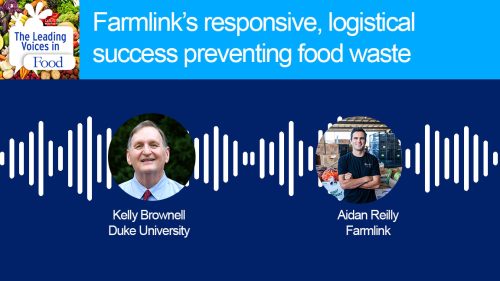 E288: Farmlink’s responsive, logistical success preventing food waste
E288: Farmlink’s responsive, logistical success preventing food waste E287: Food policy insights from government agency insider Jerold Mande
E287: Food policy insights from government agency insider Jerold Mande E286: How ‘least cost diet’ models fuel food security policy
E286: How ‘least cost diet’ models fuel food security policy E285: Gut instincts, food, and decision making
E285: Gut instincts, food, and decision making E284: The Science of How Food Both Nourishes and Harms Us
E284: The Science of How Food Both Nourishes and Harms Us E283: Taylor Hanson’s Food On The Move
E283: Taylor Hanson’s Food On The Move E282: Are healthy, environmentally sustainable diets economically achievable for everyone?
E282: Are healthy, environmentally sustainable diets economically achievable for everyone? E281: Is ultra-processed food still food?
E281: Is ultra-processed food still food? E280: Industry user fees could fix a food safety loophole for FDA
E280: Industry user fees could fix a food safety loophole for FDA E279: Feed Us With Trees – the surprising importance of nuts
E279: Feed Us With Trees – the surprising importance of nuts E278: Here’s how screen time affects our kids’ eating, activity, and mental health
E278: Here’s how screen time affects our kids’ eating, activity, and mental health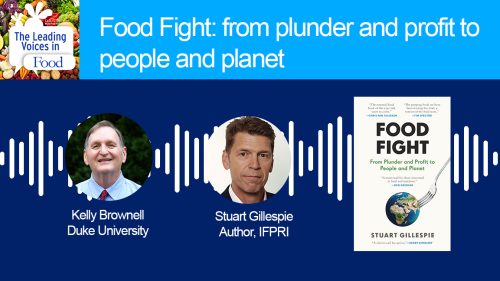 E277: Food Fight – from plunder and profit to people and planet
E277: Food Fight – from plunder and profit to people and planet E276: Climate Change – A little less beef is part of the solution
E276: Climate Change – A little less beef is part of the solution E275: Against the Grain – A Plea for Regenerative Ag
E275: Against the Grain – A Plea for Regenerative Ag E274: Sweet and Deadly – Coca-Cola in the spotlight
E274: Sweet and Deadly – Coca-Cola in the spotlight E273: Feeding innovation by taste testing alternative proteins
E273: Feeding innovation by taste testing alternative proteins E272: Why getting food date labeling right is so darn tough
E272: Why getting food date labeling right is so darn tough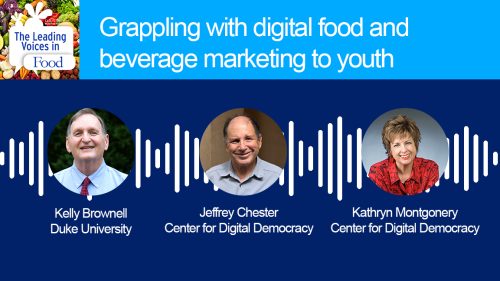 E271: Grappling with digital food and beverage marketing to youth
E271: Grappling with digital food and beverage marketing to youth E270: Do food labels influence kids shopping choices?
E270: Do food labels influence kids shopping choices? E269: Children, screen time and wellbeing – many reasons for concern
E269: Children, screen time and wellbeing – many reasons for concern E268: Why Corporate Control of Agriculture is Cause for Concern
E268: Why Corporate Control of Agriculture is Cause for Concern E267: Nzatu uses bees and ancient grains to uplift African farmers
E267: Nzatu uses bees and ancient grains to uplift African farmers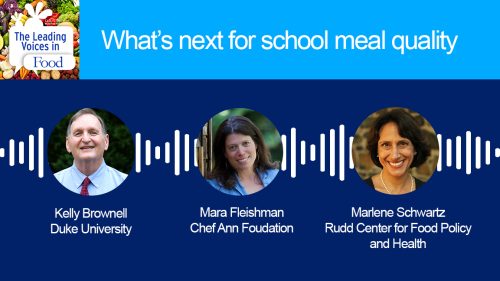 E266: What’s next for school meal quality?
E266: What’s next for school meal quality?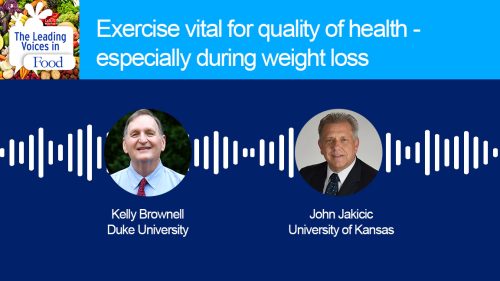 E265: Exercise vital for quality of health – especially during weight loss
E265: Exercise vital for quality of health – especially during weight loss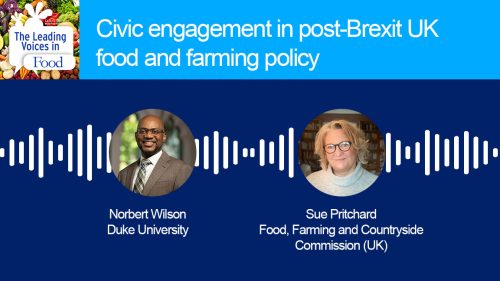 E264: Citizen engagement in post-Brexit UK food and farming policy
E264: Citizen engagement in post-Brexit UK food and farming policy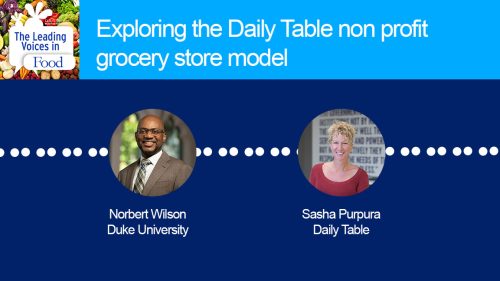 E263: Explore the Daily Table non profit grocery store model
E263: Explore the Daily Table non profit grocery store model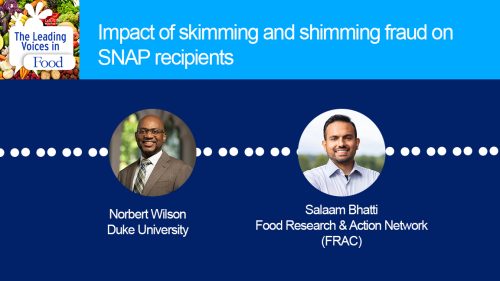 E262: Impact of skimming and shimming fraud on SNAP recipients
E262: Impact of skimming and shimming fraud on SNAP recipients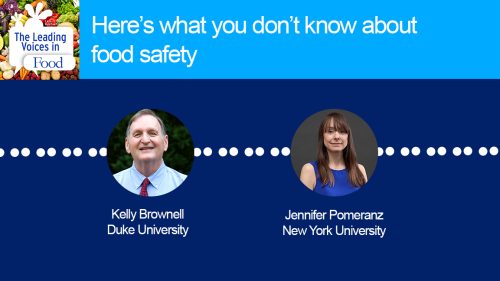 E261: Here’s what you don’t know about food safety
E261: Here’s what you don’t know about food safety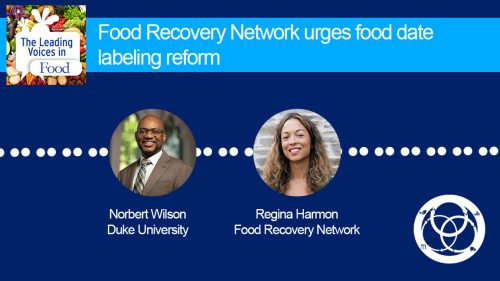 E260: Food Recovery Network Urges Food Date Labeling Reform
E260: Food Recovery Network Urges Food Date Labeling Reform E259: Your state of the science on weight loss drugs
E259: Your state of the science on weight loss drugs E258: Do ‘market driven epidemics’ drive your food choices?
E258: Do ‘market driven epidemics’ drive your food choices? E257: Embracing convergence in the RECIPES Network
E257: Embracing convergence in the RECIPES Network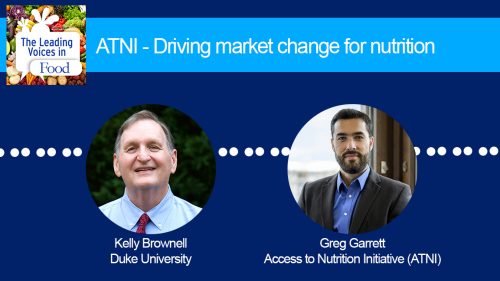 E256: ATNI – driving market change towards nutrition
E256: ATNI – driving market change towards nutrition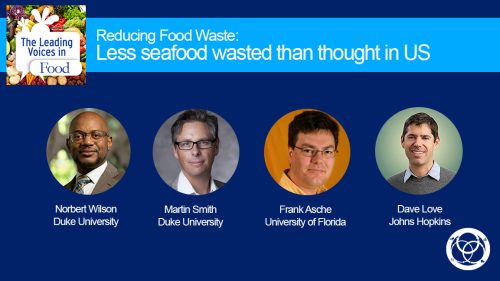 E255: Reducing food waste: Less seafood wasted than thought in US
E255: Reducing food waste: Less seafood wasted than thought in US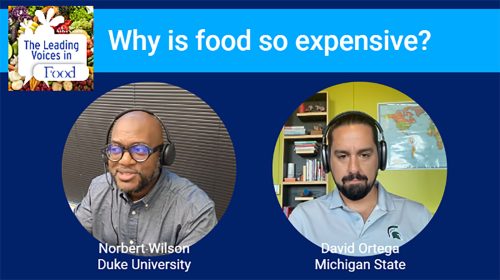 E254: Why is food so expensive?
E254: Why is food so expensive?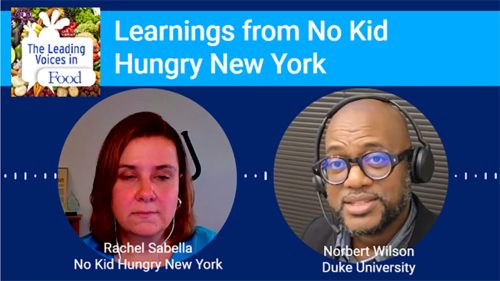 E253: Learnings from No Kid Hungry in New York
E253: Learnings from No Kid Hungry in New York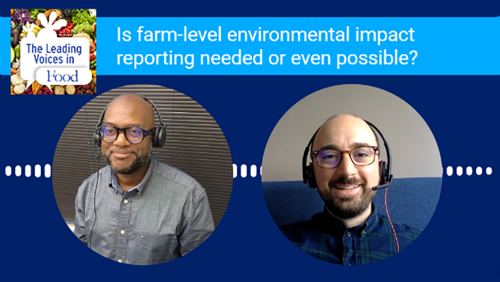 E252: Is farm-level environmental impact reporting needed or even possible?
E252: Is farm-level environmental impact reporting needed or even possible?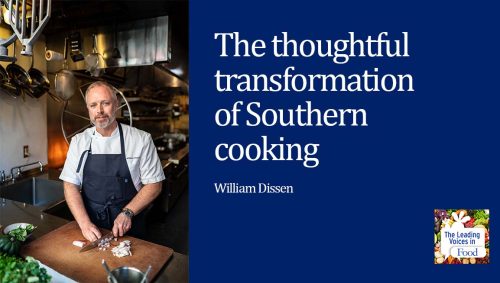 E251: The thoughtful transformation of Southern cooking
E251: The thoughtful transformation of Southern cooking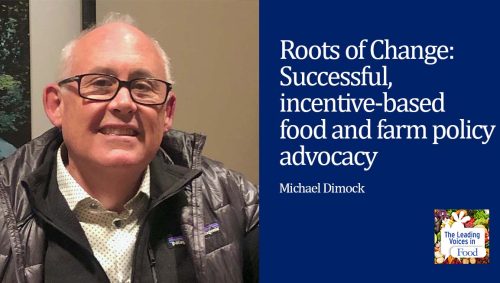 E250: Roots of Change – Successful, incentive-based food and farm policy advocacy
E250: Roots of Change – Successful, incentive-based food and farm policy advocacy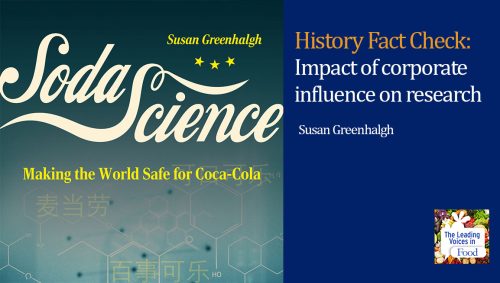 E249: History Fact Check: Impact of Corporate Influence on Research
E249: History Fact Check: Impact of Corporate Influence on Research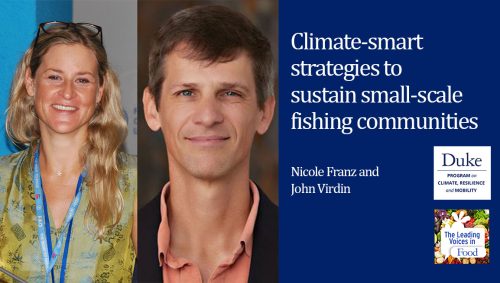 E248: Climate-smart strategies for small-scale fishing communities
E248: Climate-smart strategies for small-scale fishing communities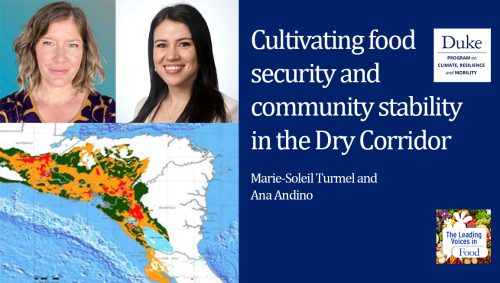 E247: Cultivating food security and community stability in the Dry Corridor
E247: Cultivating food security and community stability in the Dry Corridor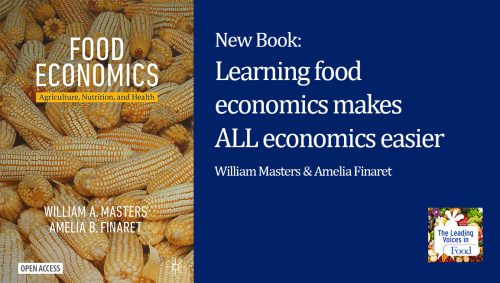 E246: New Book – Learning food economics makes ALL economics easier
E246: New Book – Learning food economics makes ALL economics easier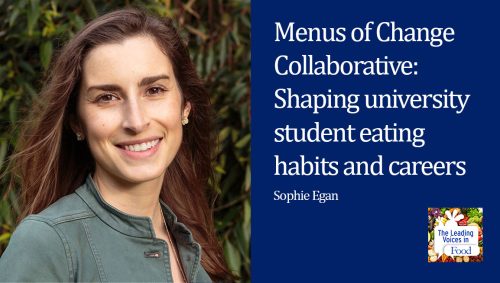 E245: Menus of Change Collaborative – shaping university student eating habits and careers
E245: Menus of Change Collaborative – shaping university student eating habits and careers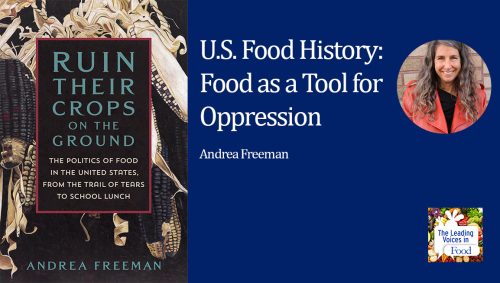 E244: US Food History – Food as a tool for oppression
E244: US Food History – Food as a tool for oppression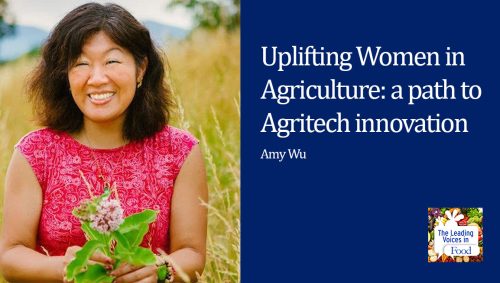 E243: Uplifting women in agriculture: a pathway to innovation
E243: Uplifting women in agriculture: a pathway to innovation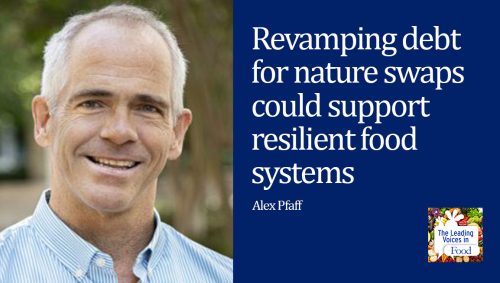 E242: Revamping debt for nature swaps could support resilient food systems
E242: Revamping debt for nature swaps could support resilient food systems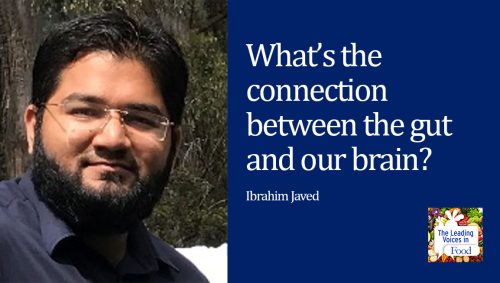 E241: What is the connection between the gut and our brain?
E241: What is the connection between the gut and our brain? E240: Do food companies manipulate us with sports sponsorships?
E240: Do food companies manipulate us with sports sponsorships?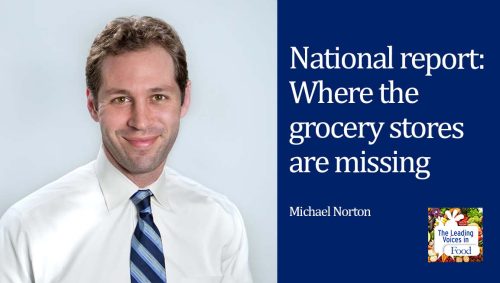 E239: National report – where the grocery stores are missing
E239: National report – where the grocery stores are missing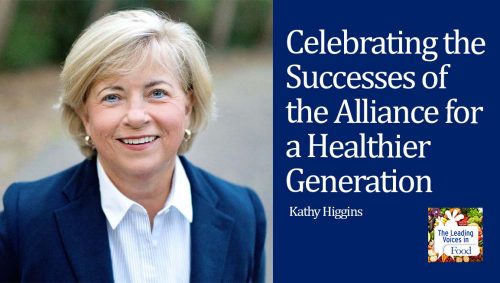 E238: Celebrating the Successes of the Alliance for a Healthier Generation
E238: Celebrating the Successes of the Alliance for a Healthier Generation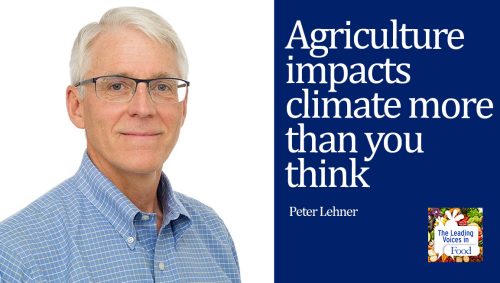 E237: Agriculture impacts climate more than you think
E237: Agriculture impacts climate more than you think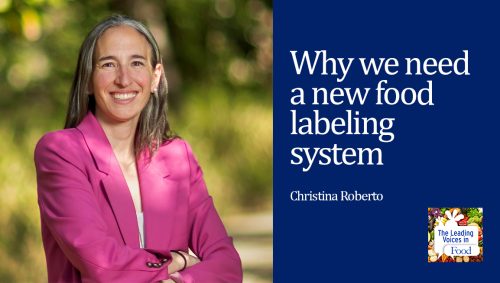 E236: Why we need a new food labeling system
E236: Why we need a new food labeling system E235: A successful interactive obesity treatment approach
E235: A successful interactive obesity treatment approach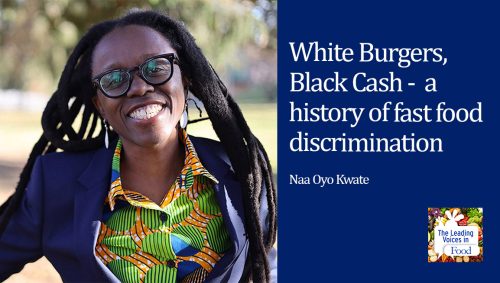 E234: White Burgers, Black Cash – a history of fast food discrimination
E234: White Burgers, Black Cash – a history of fast food discrimination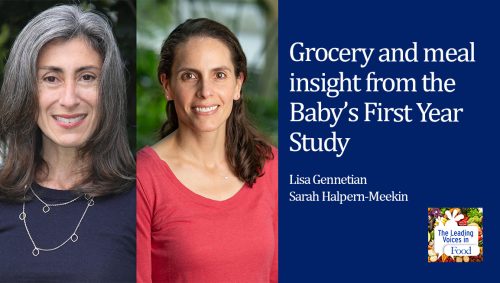 E233: Grocery and meal insight from the Baby’s First Years project
E233: Grocery and meal insight from the Baby’s First Years project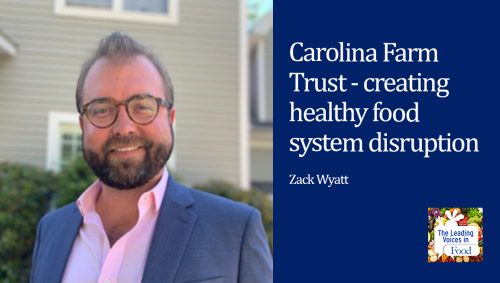 E232: Carolina Farm Trust creating healthy food system disruption
E232: Carolina Farm Trust creating healthy food system disruption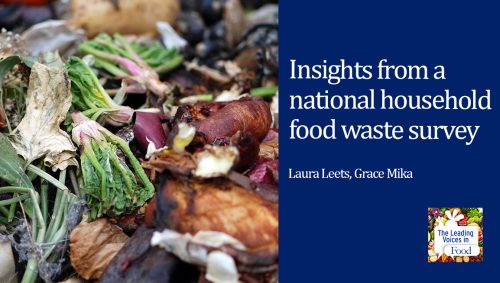 E231: Insight from a national household food waste study
E231: Insight from a national household food waste study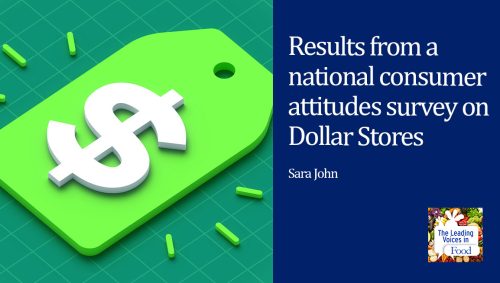 E230: Results from a national consumer attitudes survey on dollar stores
E230: Results from a national consumer attitudes survey on dollar stores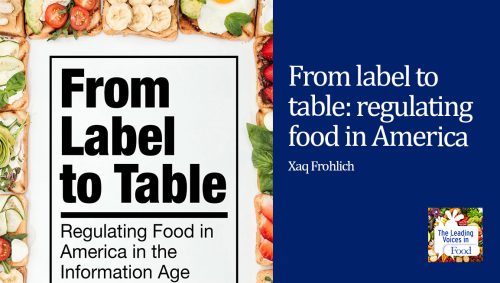 E229: From label to table: Regulating food in America
E229: From label to table: Regulating food in America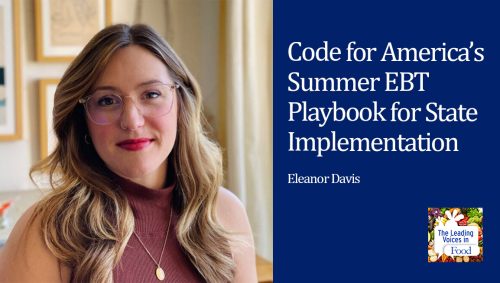 E228: Code for America’s Summer EBT Playbook for State Implementation
E228: Code for America’s Summer EBT Playbook for State Implementation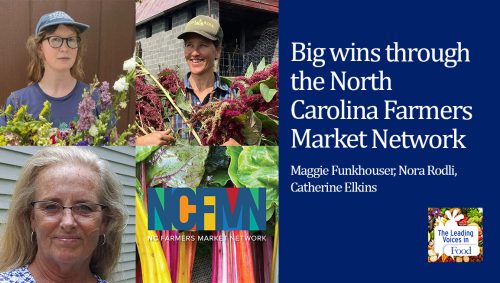 E227: Big wins through the North Carolina Farmers Market Network
E227: Big wins through the North Carolina Farmers Market Network E226: Hope for regeneration: photographic documentary of rangeland conservation
E226: Hope for regeneration: photographic documentary of rangeland conservation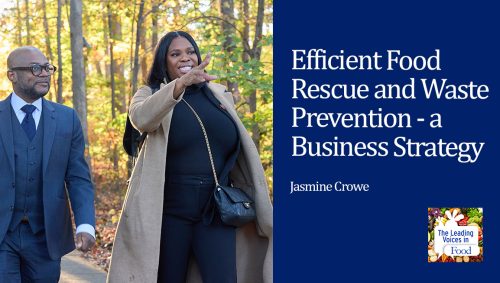 E225: Efficient Food Recovery and Waste Prevention – a Business Strategy
E225: Efficient Food Recovery and Waste Prevention – a Business Strategy E224: Mississippi Delta History Describe Food Power Against and For Blacks in US
E224: Mississippi Delta History Describe Food Power Against and For Blacks in US E223: Food Policy Lessons from Removing Trans Fats from our Diet
E223: Food Policy Lessons from Removing Trans Fats from our Diet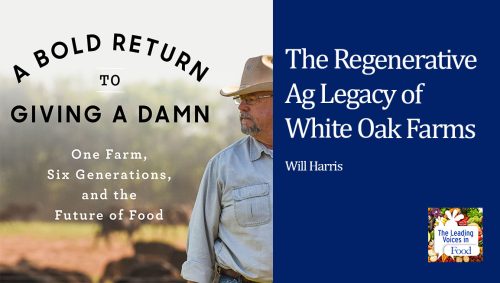 E222: The Regenerative Ag Legacy of White Oak Pastures
E222: The Regenerative Ag Legacy of White Oak Pastures E221: Understanding Poverty, Wellbeing, and Food Security for US Children
E221: Understanding Poverty, Wellbeing, and Food Security for US Children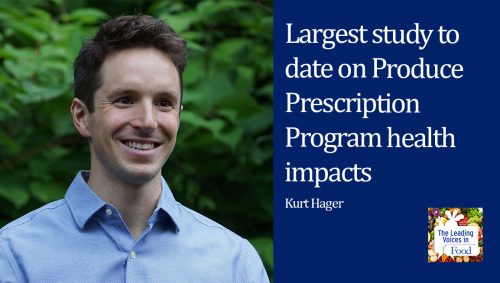 E220: Largest study to date on Produce Prescription Program health impacts
E220: Largest study to date on Produce Prescription Program health impacts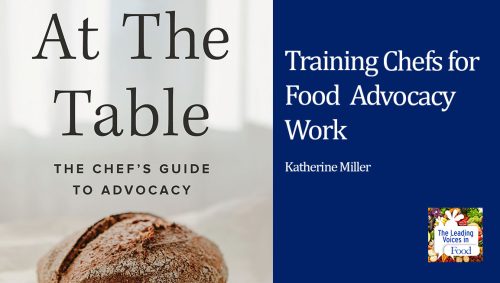 E219: Training Chefs for Food Advocacy
E219: Training Chefs for Food Advocacy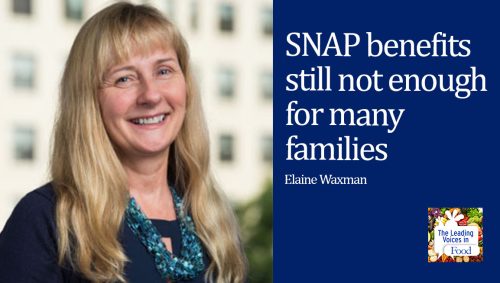 E218: SNAP benefits still not enough for many families
E218: SNAP benefits still not enough for many families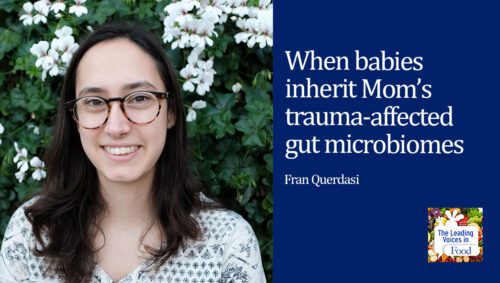 E217: When babies inherit Mom’s trauma-affected gut microbiome
E217: When babies inherit Mom’s trauma-affected gut microbiome E216: Who are the biggest beef eaters of all?
E216: Who are the biggest beef eaters of all?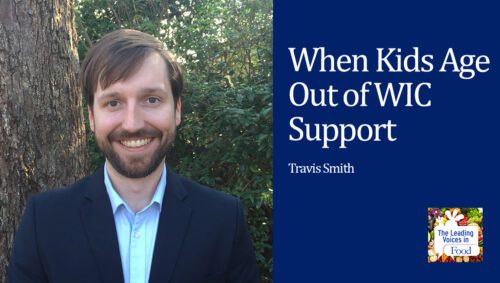 E215: When Kids Age Out of WIC Support
E215: When Kids Age Out of WIC Support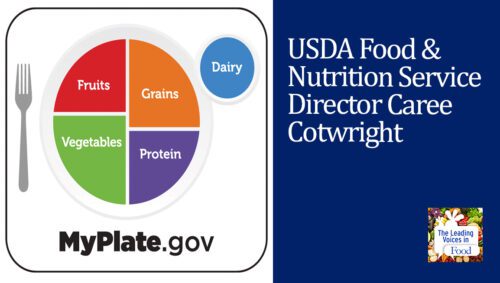 E214: Championing MyPlate – USDA’s Director of Food & Nutrition Service Caree Cotwright
E214: Championing MyPlate – USDA’s Director of Food & Nutrition Service Caree Cotwright E213: Righting the Wrongs of Heirs Property
E213: Righting the Wrongs of Heirs Property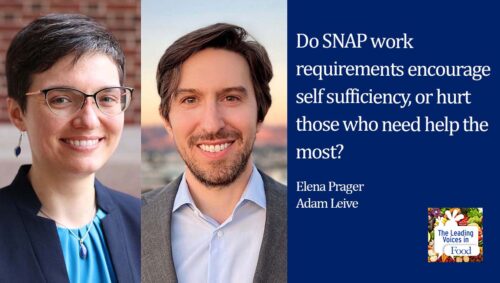 E212: Do SNAP work requirements encourage self sufficiency or hurt those who need help the most?
E212: Do SNAP work requirements encourage self sufficiency or hurt those who need help the most? E211: Soil Wealth Areas: a Tool to Spur Investment in Regenerative and Organic Ag
E211: Soil Wealth Areas: a Tool to Spur Investment in Regenerative and Organic Ag E210: Clinical Trial Evidence: Metabolic Effect of Sweeteners
E210: Clinical Trial Evidence: Metabolic Effect of Sweeteners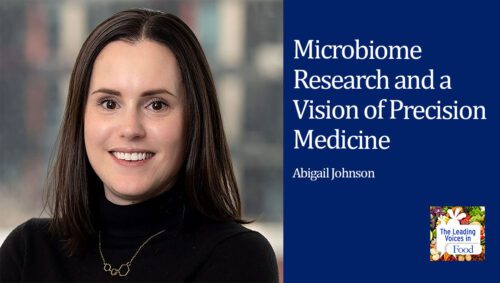 E209: Microbiome Research and a Vision of Precision Medicine
E209: Microbiome Research and a Vision of Precision Medicine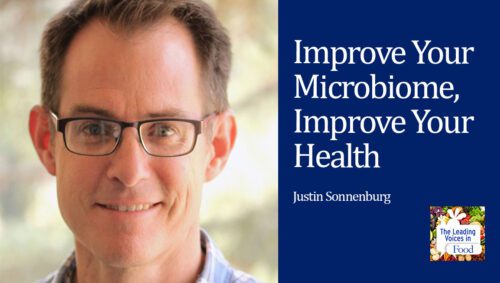 E208: Improve Your Microbiome – Improve Your Health
E208: Improve Your Microbiome – Improve Your Health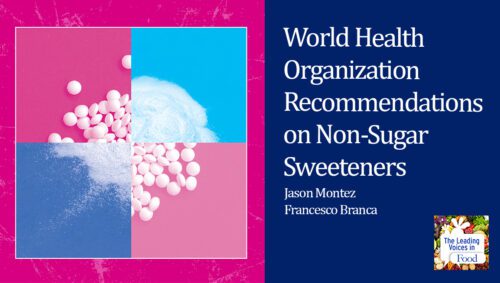 E207: World Health Organization’s Recommendations on Non-Sugar Sweeteners
E207: World Health Organization’s Recommendations on Non-Sugar Sweeteners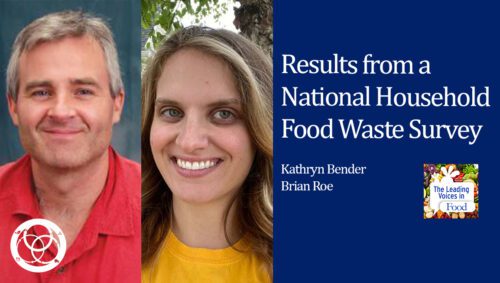 E206: Results from a National Household Food Waste Survey
E206: Results from a National Household Food Waste Survey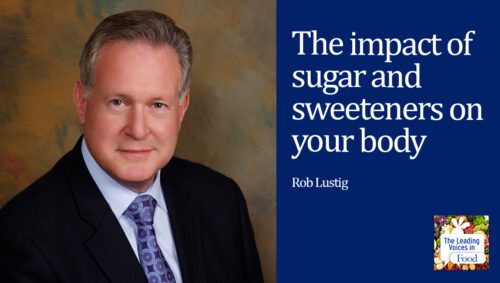 E205: Here’s what sugar and zero-calorie sweeteners do to your body
E205: Here’s what sugar and zero-calorie sweeteners do to your body E204: The troubling unknowns of non-caloric sweeteners
E204: The troubling unknowns of non-caloric sweeteners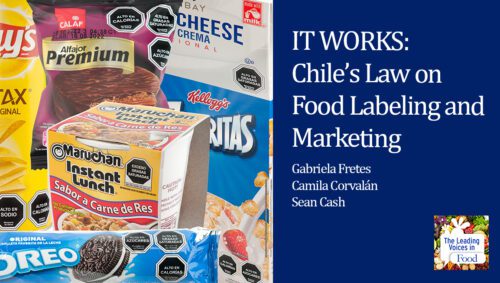 E203: It works – Chile’s Law on Food Labeling and Marketing
E203: It works – Chile’s Law on Food Labeling and Marketing E202: Impact of non-caloric sweeteners on the microbiome – what we know now
E202: Impact of non-caloric sweeteners on the microbiome – what we know now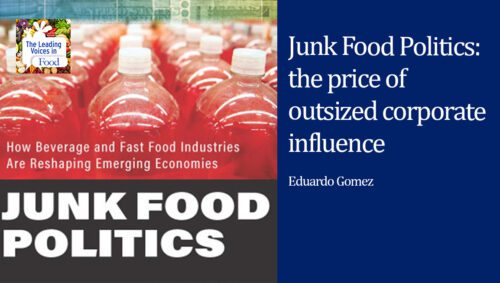 E201: Junk Food Politics – the price of outsized corporate influence
E201: Junk Food Politics – the price of outsized corporate influence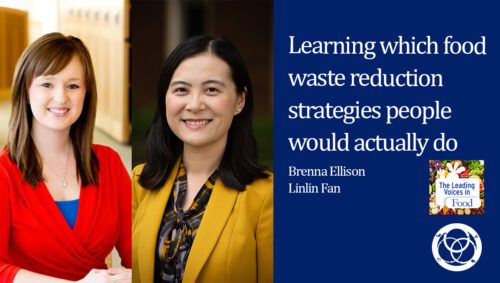 E200: Learning which food waste reduction strategies people would actually do
E200: Learning which food waste reduction strategies people would actually do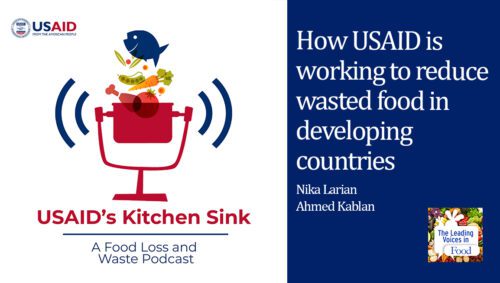 E199: How USAID is working to reduce wasted food in developing countries
E199: How USAID is working to reduce wasted food in developing countries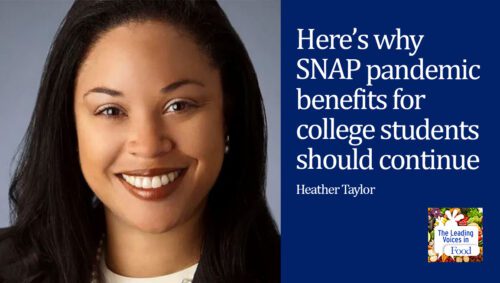 E198: Why SNAP pandemic benefits for college students should continue
E198: Why SNAP pandemic benefits for college students should continue E197: USDA plans for online WIC Benefits
E197: USDA plans for online WIC Benefits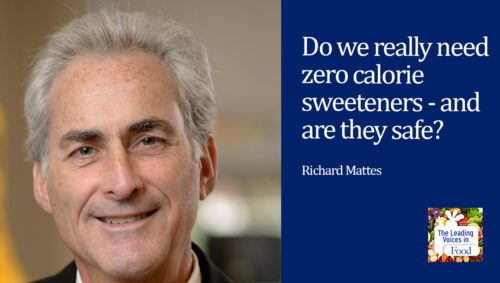 E196: Why do we need zero calorie sweeteners, and are they safe?
E196: Why do we need zero calorie sweeteners, and are they safe? E195: How USDA is tackling food waste and loss
E195: How USDA is tackling food waste and loss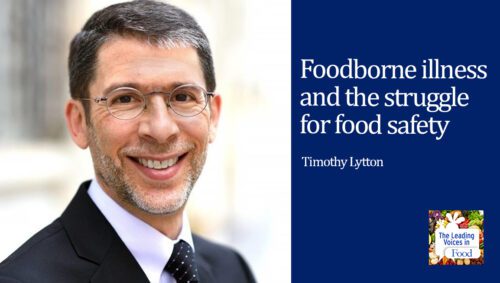 E194: Foodborne illness and the struggle for food safety
E194: Foodborne illness and the struggle for food safety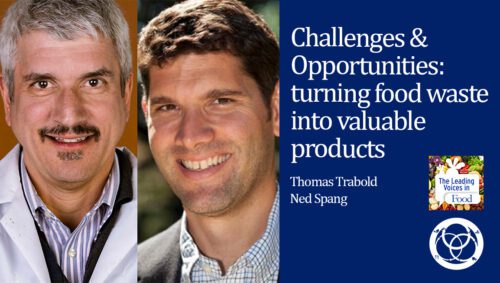 E193: Challenges and opportunities: turning food waste into valuable products
E193: Challenges and opportunities: turning food waste into valuable products E192: How to achieve food equity with SNAP
E192: How to achieve food equity with SNAP E191: Is today’s food waste a consequence of historical public policy?
E191: Is today’s food waste a consequence of historical public policy? E190: Insights from 2nd Global Survey of School Meals
E190: Insights from 2nd Global Survey of School Meals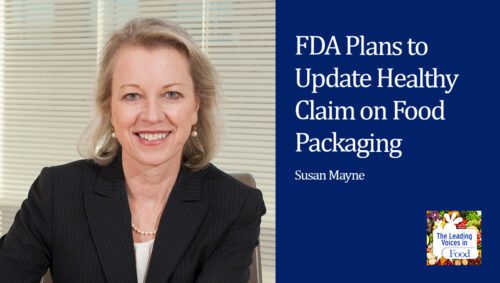 E189: FDA Plans to Update Health Claim on Food Packaging
E189: FDA Plans to Update Health Claim on Food Packaging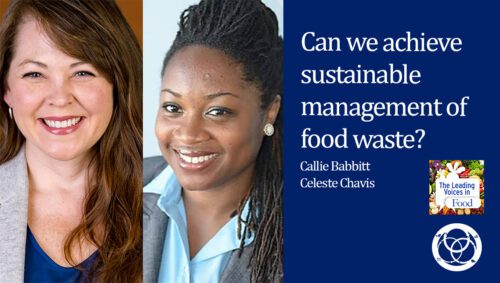 E188: Can we achieve sustainable management of food waste?
E188: Can we achieve sustainable management of food waste? E187: FDA role in national strategy to end hunger
E187: FDA role in national strategy to end hunger E186: Deep dive into challenges people face accessing food pantries
E186: Deep dive into challenges people face accessing food pantries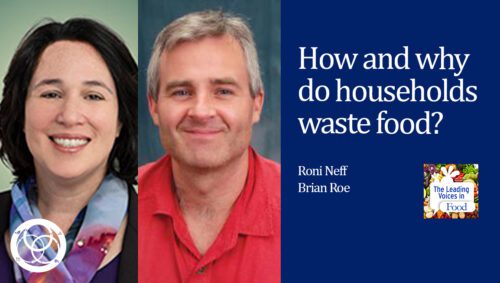 E185: How and why do households waste food?
E185: How and why do households waste food?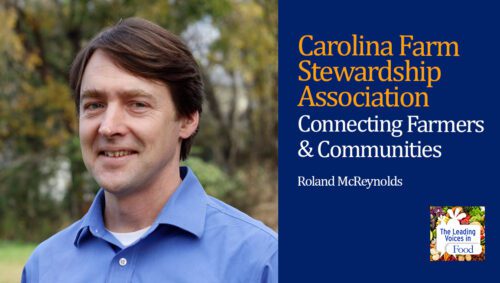 E184: Carolina Farm Stewardship Association – Connecting Farmers & Communities
E184: Carolina Farm Stewardship Association – Connecting Farmers & Communities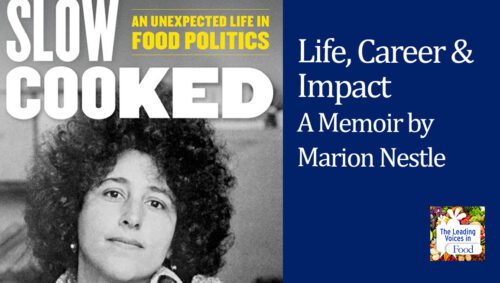 E182: Memoir and Marion Nestle – Slow Cooked
E182: Memoir and Marion Nestle – Slow Cooked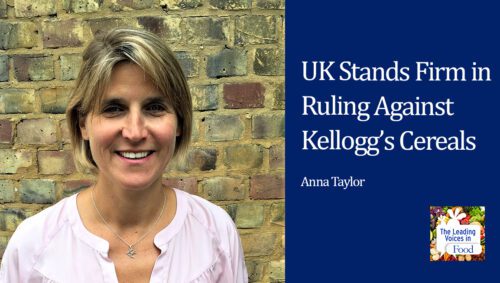 E181: UK Stands Firm in Ruling Against Kellogg Cereals
E181: UK Stands Firm in Ruling Against Kellogg Cereals E180: Chris Carter and the Spirit of Soul Food
E180: Chris Carter and the Spirit of Soul Food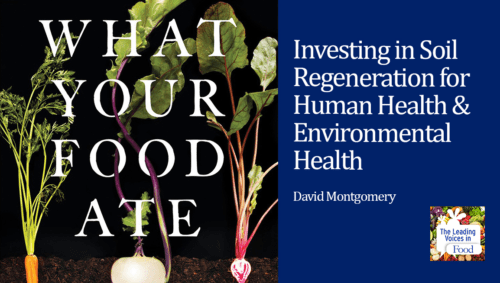 E179: Investing in Soil Regeneration for Human Health & Environmental Health
E179: Investing in Soil Regeneration for Human Health & Environmental Health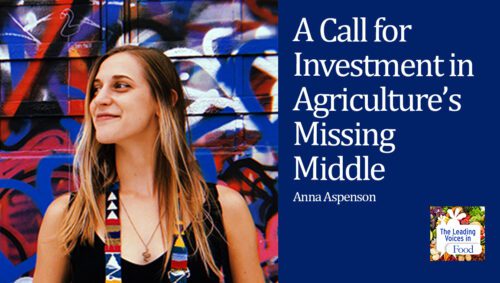 E178: A Call to Invest in Agriculture’s Missing Middle
E178: A Call to Invest in Agriculture’s Missing Middle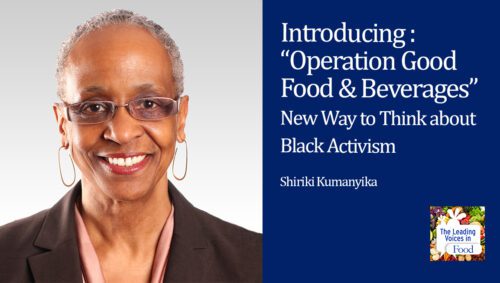 E177: Introducing Operation Good Food & Beverages – New Way to Think about Black Activism
E177: Introducing Operation Good Food & Beverages – New Way to Think about Black Activism E176: Insights from a nationwide survey of hunger relief organizations during COVID
E176: Insights from a nationwide survey of hunger relief organizations during COVID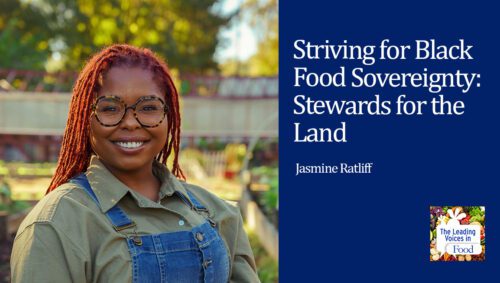 E175: Striving for Black Food Sovereignty – Stewards for the Land
E175: Striving for Black Food Sovereignty – Stewards for the Land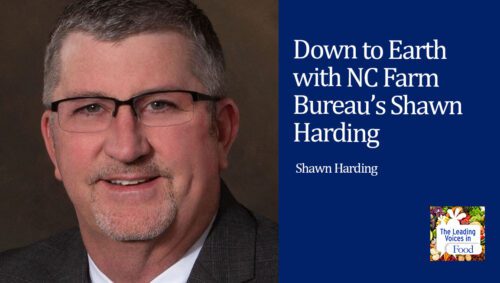 E174: Down to Earth with NC Farm Bureau’s Shawn Harding
E174: Down to Earth with NC Farm Bureau’s Shawn Harding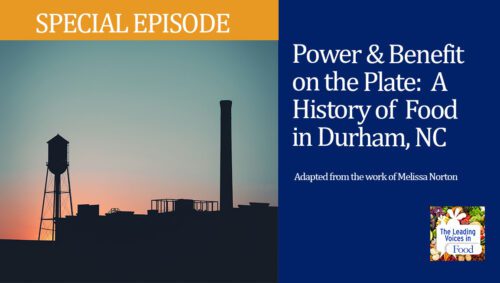 E173: Special Episode | Power & Benefit on the Plate: A History of Food in Durham, NC
E173: Special Episode | Power & Benefit on the Plate: A History of Food in Durham, NC E172: The Power & Potential of Co-ops for Economic Development Through Food
E172: The Power & Potential of Co-ops for Economic Development Through Food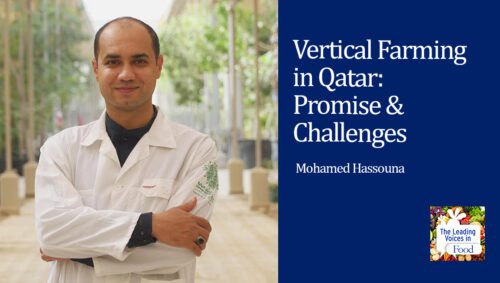 E171: Vertical Farming in Qatar – Promise & Challenges
E171: Vertical Farming in Qatar – Promise & Challenges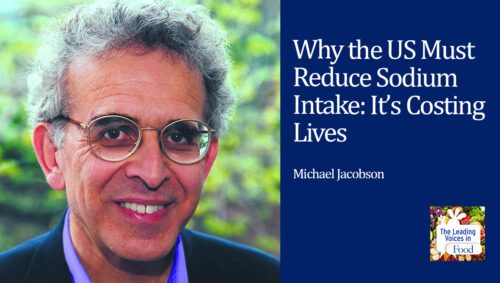 E170: Why the US Must Reduce Sodium Intake: It’s Costing Lives
E170: Why the US Must Reduce Sodium Intake: It’s Costing Lives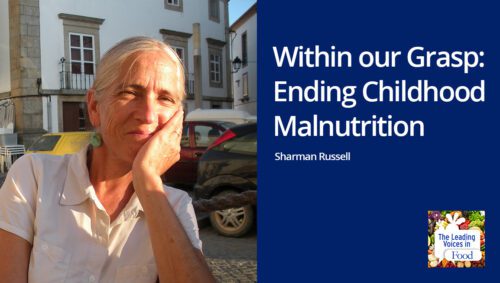 E169: Ending Childhood Malnutrition is Within our Grasp
E169: Ending Childhood Malnutrition is Within our Grasp E168: Nutrition Security now a Clear Focus for USDA
E168: Nutrition Security now a Clear Focus for USDA E167: Muller Shepherding Regenerative and Restorative Agricultural Practices
E167: Muller Shepherding Regenerative and Restorative Agricultural Practices E166: New Efforts to Combat Diabetes and Obesity Stigma in Clinical Settings
E166: New Efforts to Combat Diabetes and Obesity Stigma in Clinical Settings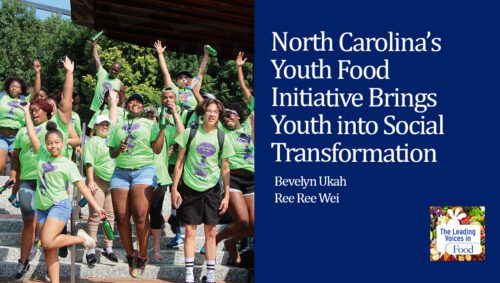 E165: North Carolina Youth Food Initiative Brings Young People into Social Transformation
E165: North Carolina Youth Food Initiative Brings Young People into Social Transformation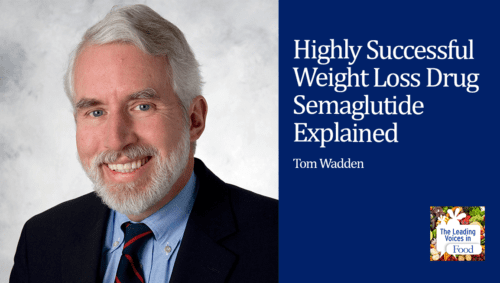 E164: Highly Successful Weight Loss Drug Semaglutide Explained
E164: Highly Successful Weight Loss Drug Semaglutide Explained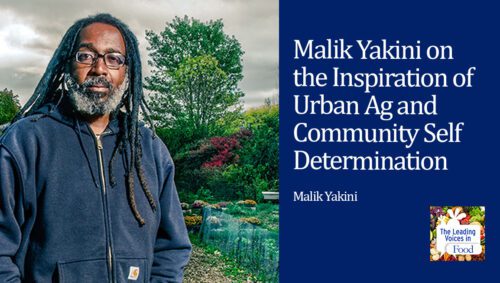 E163: Malik Yakini on the Inspiration of Urban Ag and Community Self Determination
E163: Malik Yakini on the Inspiration of Urban Ag and Community Self Determination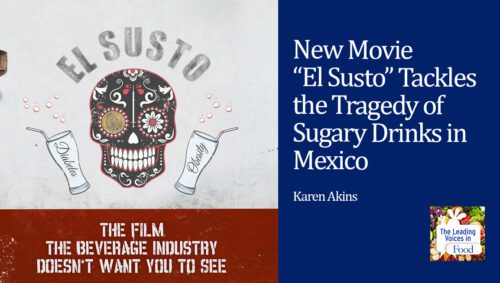 E161: New Movie “El Susto” Tackles the Tragedy of Sugary Drinks in Mexico
E161: New Movie “El Susto” Tackles the Tragedy of Sugary Drinks in Mexico E160: Deep Community Connection at the San Diego Food System Alliance
E160: Deep Community Connection at the San Diego Food System Alliance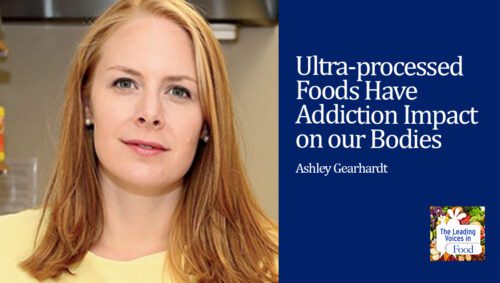 E159: Ultra-processed Foods Have Addiction Impact on our Bodies
E159: Ultra-processed Foods Have Addiction Impact on our Bodies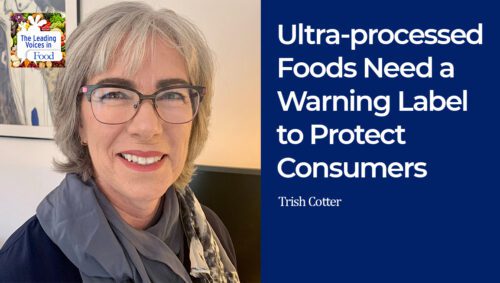 E162: Ultra-processed Foods Need a Warning Label to Protect Consumers
E162: Ultra-processed Foods Need a Warning Label to Protect Consumers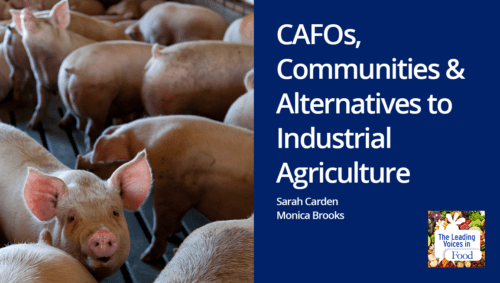 E158: CAFOs, Communities, and Alternatives to Industrial Agriculture
E158: CAFOs, Communities, and Alternatives to Industrial Agriculture E157: Adam Zipkin on Transitioning to an Agricultural System that Benefits Everyone
E157: Adam Zipkin on Transitioning to an Agricultural System that Benefits Everyone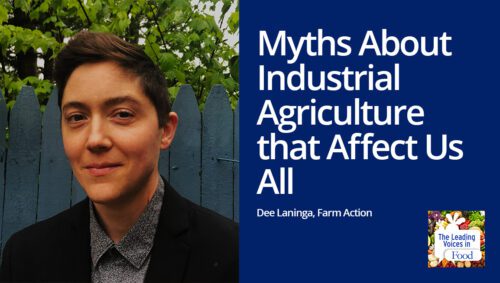 E156: Myths About Industrial Agriculture That Affect Us All
E156: Myths About Industrial Agriculture That Affect Us All E155: How Industry and Farming Practices Contribute to Antibiotic Resistant Superbugs
E155: How Industry and Farming Practices Contribute to Antibiotic Resistant Superbugs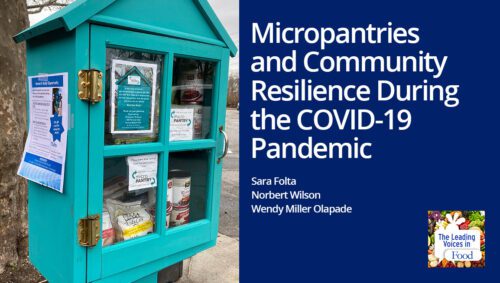 E154: Micropantries and Community Resilience during the COVID-19 Pandemic
E154: Micropantries and Community Resilience during the COVID-19 Pandemic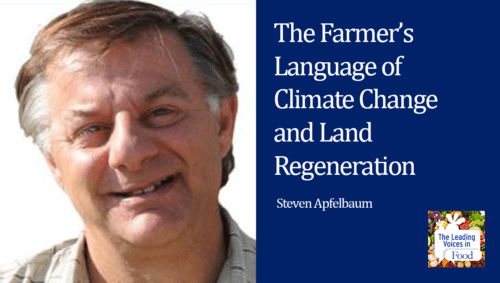 E153: The Farmer’s Language of Climate Change and Land Regeneration
E153: The Farmer’s Language of Climate Change and Land Regeneration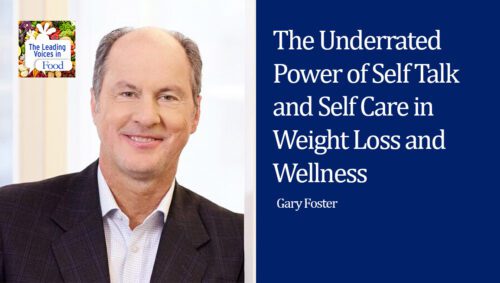 E152: The Underrated Power of Self Talk and Self Care in Weight Loss and Wellness
E152: The Underrated Power of Self Talk and Self Care in Weight Loss and Wellness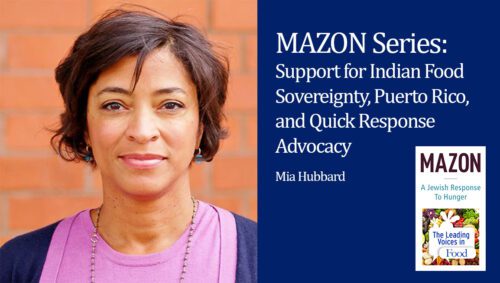 E151: MAZON’s support for Indian Food Sovereignty, Puerto Rico, and Quick Response Food Advocacy
E151: MAZON’s support for Indian Food Sovereignty, Puerto Rico, and Quick Response Food Advocacy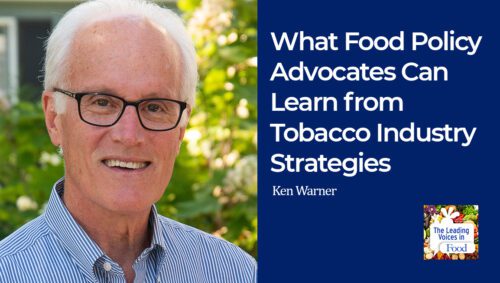 E150: What Food Policy Advocates Can Learn from Tobacco Industry Strategies
E150: What Food Policy Advocates Can Learn from Tobacco Industry Strategies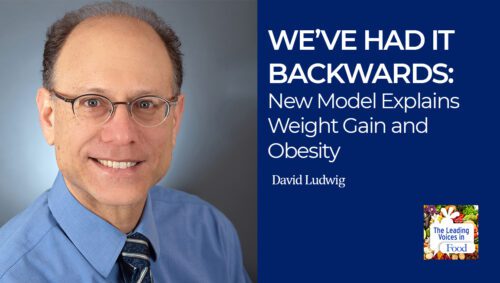 E149: “We’ve had it backwards” – New model explains weight gain and obesity
E149: “We’ve had it backwards” – New model explains weight gain and obesity E148: Weight Loss Study Drives New Insight into Role of Carbohydrates
E148: Weight Loss Study Drives New Insight into Role of Carbohydrates E147: Farmer-scientist Measures the Real Benefits of Regenerative Agriculture
E147: Farmer-scientist Measures the Real Benefits of Regenerative Agriculture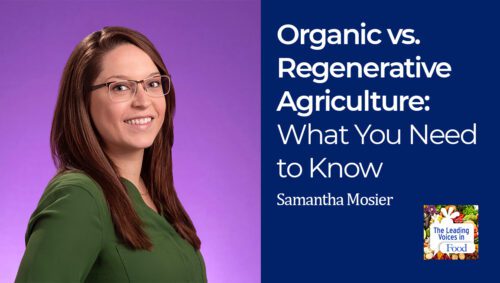 E146: Organic Vs Regenerative Agriculture – What You Need to Know
E146: Organic Vs Regenerative Agriculture – What You Need to Know E145: A Strategy to Improve SNAP Impact Through the Next Farm Bill
E145: A Strategy to Improve SNAP Impact Through the Next Farm Bill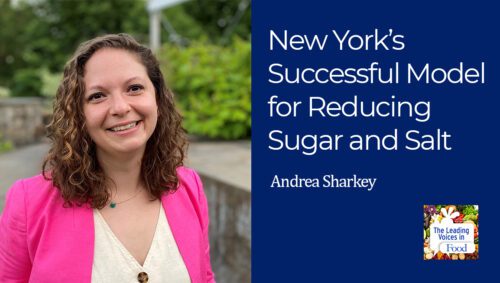 E144: New York’s Successful Model for Reducing Sugar and Salt
E144: New York’s Successful Model for Reducing Sugar and Salt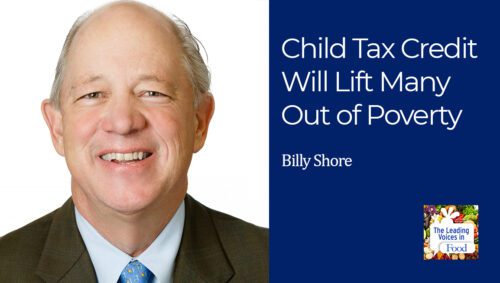 E143: Improved Child Tax Credit Will Lift Many Out of Poverty
E143: Improved Child Tax Credit Will Lift Many Out of Poverty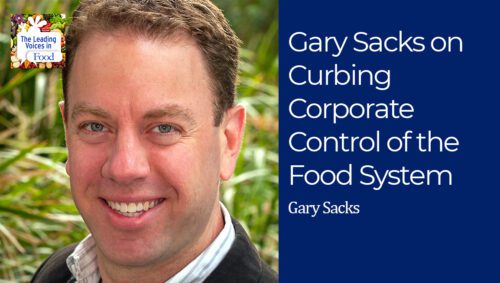 E141: Gary Sacks on Curbing Corporate Control of the Food System
E141: Gary Sacks on Curbing Corporate Control of the Food System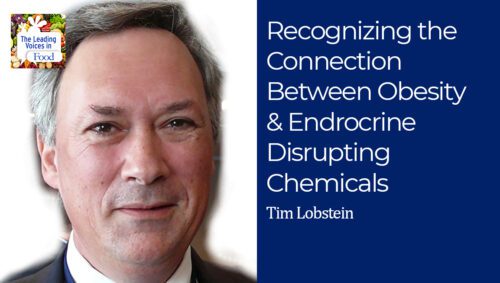 E142: Recognizing the Connection Between Obesity and Endocrine Disrupting Chemicals
E142: Recognizing the Connection Between Obesity and Endocrine Disrupting Chemicals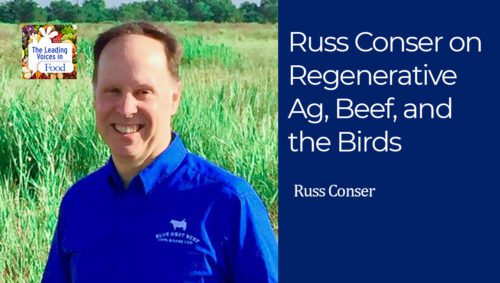 E140: Russ Conser on Regenerative Ag, Beef, and the Birds
E140: Russ Conser on Regenerative Ag, Beef, and the Birds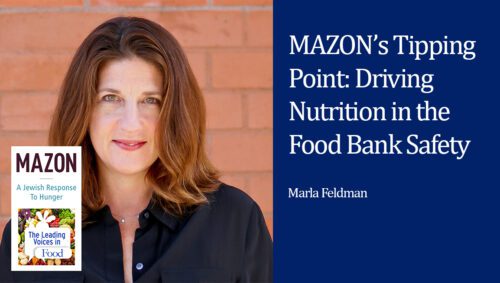 E139: MAZON’s Tipping Point – Driving Nutrition in the Food Bank Safety Net
E139: MAZON’s Tipping Point – Driving Nutrition in the Food Bank Safety Net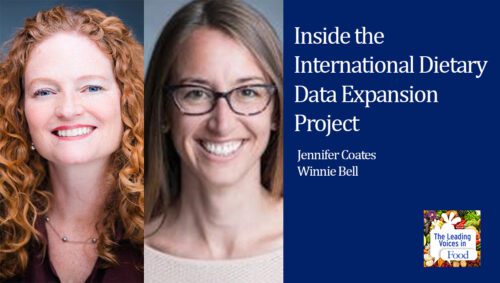 E138: Inside the International Dietary Data Expansion Project
E138: Inside the International Dietary Data Expansion Project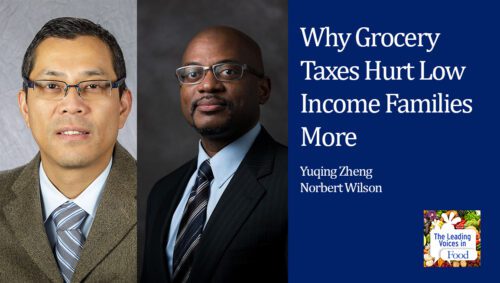 E137: Why Grocery Taxes Hurt Low Income Families More – Evidence for Policymakers
E137: Why Grocery Taxes Hurt Low Income Families More – Evidence for Policymakers E136: When North Carolina Schools Offer Free Meals Academic Success Follows
E136: When North Carolina Schools Offer Free Meals Academic Success Follows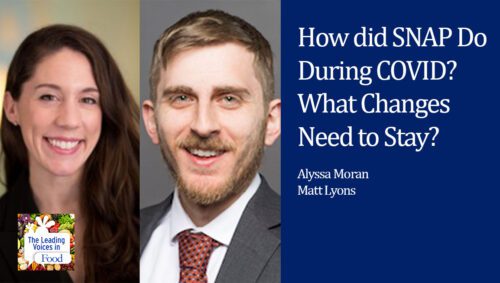 E135: How did SNAP do during COVID and What Changes Need to Stay?
E135: How did SNAP do during COVID and What Changes Need to Stay?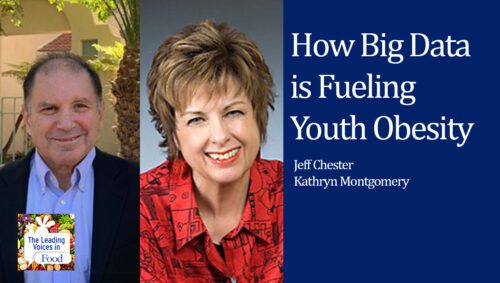 E134: How Big Data is Fueling Youth Obesity
E134: How Big Data is Fueling Youth Obesity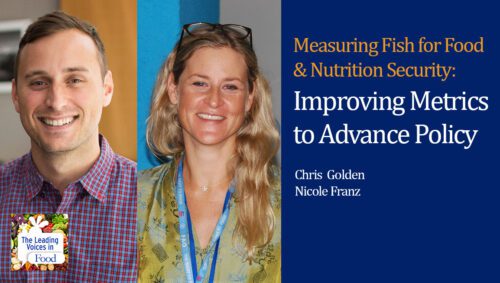 E133: Measuring Fish for Food & Nutrition Security – Improving Metrics to Advance Policy
E133: Measuring Fish for Food & Nutrition Security – Improving Metrics to Advance Policy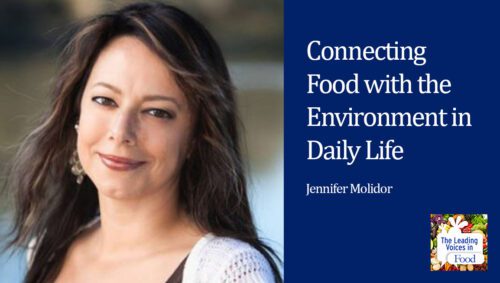 E132: Connecting Food with our Environment in Daily Life
E132: Connecting Food with our Environment in Daily Life E131: Fisheries Need Stronger Role in Food Policy and Food Security Planning
E131: Fisheries Need Stronger Role in Food Policy and Food Security Planning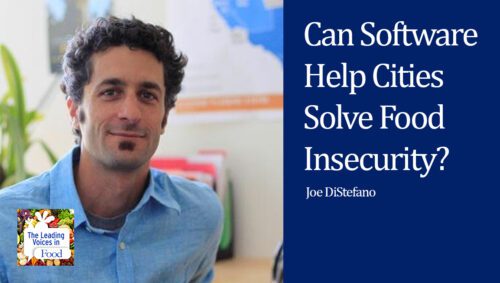 E130: Can Software Help Cities Solve Food Insecurity?
E130: Can Software Help Cities Solve Food Insecurity?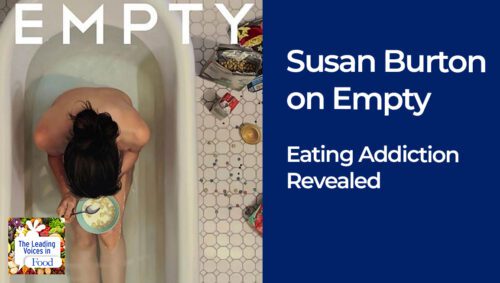 E129: An Eating Addiction Revealed – Susan Burton on Empty
E129: An Eating Addiction Revealed – Susan Burton on Empty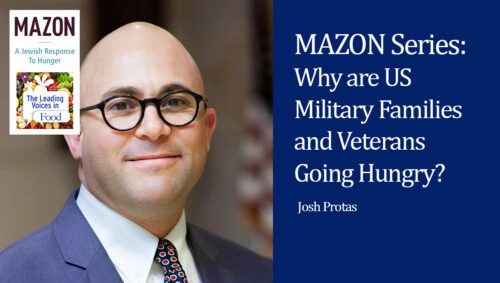 E128: MAZON Series – Why are Some US Military Families and Veterans Going Hungry?
E128: MAZON Series – Why are Some US Military Families and Veterans Going Hungry?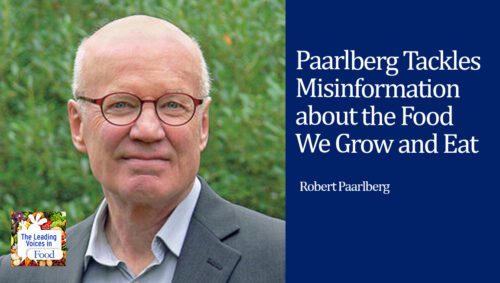 E127: Paarlberg Tackles Misinformation about Food We Grow and Eat
E127: Paarlberg Tackles Misinformation about Food We Grow and Eat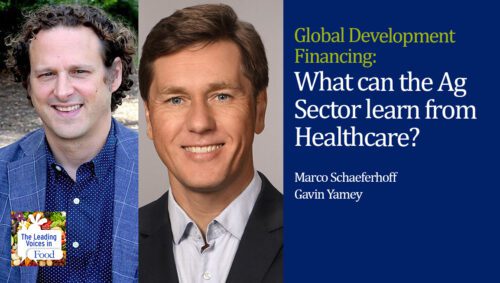 E126: Global Development Financing – What Can the Agriculture Sector Learn from Healthcare
E126: Global Development Financing – What Can the Agriculture Sector Learn from Healthcare E125: Women, Food Insecurity and the Feminization of Poverty in the US
E125: Women, Food Insecurity and the Feminization of Poverty in the US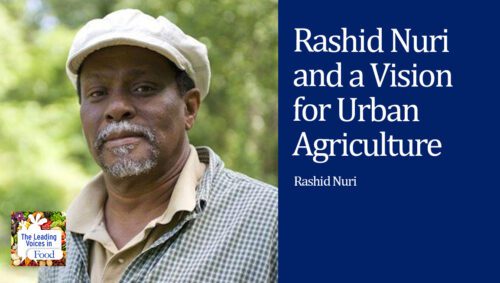 E123: Rashid Nuri and a Vision for Urban Agriculture
E123: Rashid Nuri and a Vision for Urban Agriculture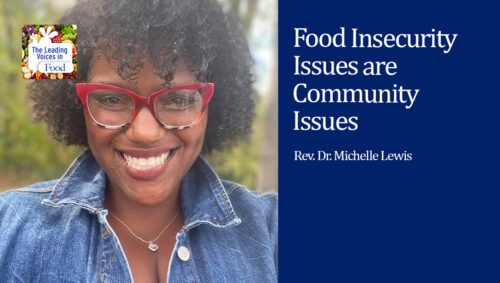 E124: Food Insecurity Issues are Community Issues
E124: Food Insecurity Issues are Community Issues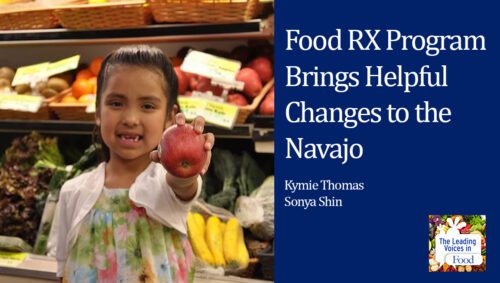 E122: Food RX Program Brings Helpful Changes to the Navajo
E122: Food RX Program Brings Helpful Changes to the Navajo E121: Marcia Chatelain on the Golden Arches and Black America
E121: Marcia Chatelain on the Golden Arches and Black America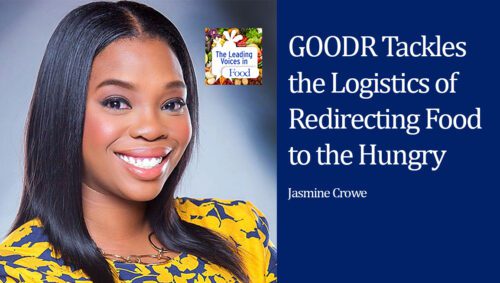 E120: GOODR Tackles the Logistics of Redirecting Healthy Food to the Hungry
E120: GOODR Tackles the Logistics of Redirecting Healthy Food to the Hungry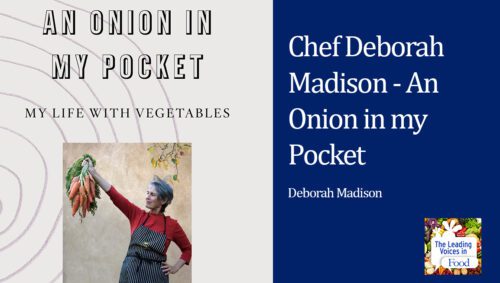 E119: Chef Deborah Madison – An Onion in my Pocket
E119: Chef Deborah Madison – An Onion in my Pocket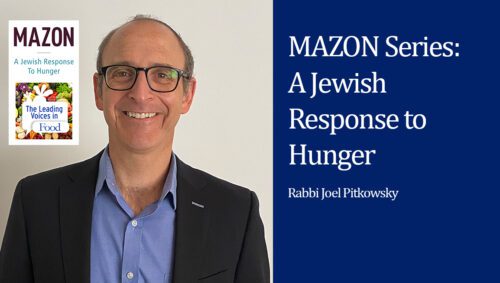 E118: Joel Pitkowsky on MAZON – A Jewish Response to Hunger
E118: Joel Pitkowsky on MAZON – A Jewish Response to Hunger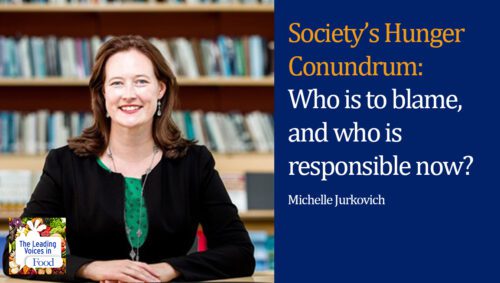 E117: Society’s Hunger Conundrum: Who is to blame, and who is responsible now?
E117: Society’s Hunger Conundrum: Who is to blame, and who is responsible now?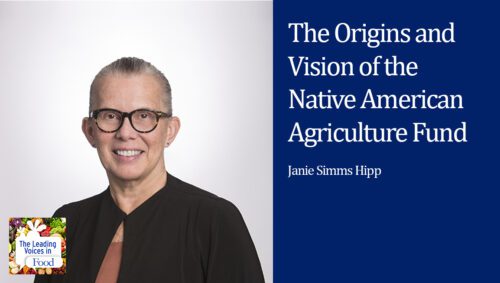 E116: The Origins and Vision for the Native American Agriculture Fund
E116: The Origins and Vision for the Native American Agriculture Fund E115: How Precision Diet Might Overcome Some Genetic Roadblocks
E115: How Precision Diet Might Overcome Some Genetic Roadblocks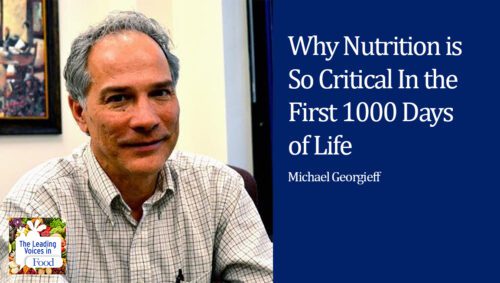 E114: Why Nutrition is So Important In the First 1000 Days of Life
E114: Why Nutrition is So Important In the First 1000 Days of Life E113: The Power of Policy and Parents in School Meals
E113: The Power of Policy and Parents in School Meals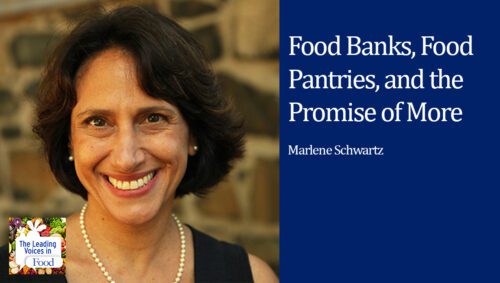 E112: Food Banks, Food Pantries, and the Promise of More
E112: Food Banks, Food Pantries, and the Promise of More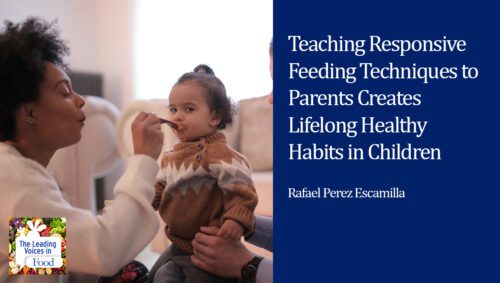 E111: Teaching Responsive Feeding to Parents Create Lifelong Healthy Habits in Children
E111: Teaching Responsive Feeding to Parents Create Lifelong Healthy Habits in Children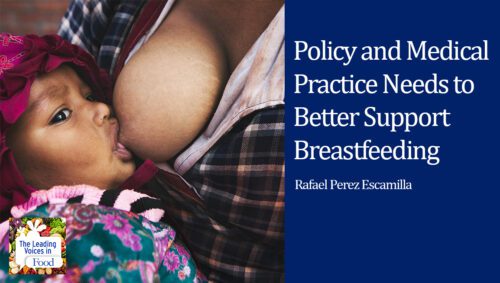 E110: Policy and Medical Practice Need to Better Support Breastfeeding
E110: Policy and Medical Practice Need to Better Support Breastfeeding E109: The FABLE of International Sustainable Development
E109: The FABLE of International Sustainable Development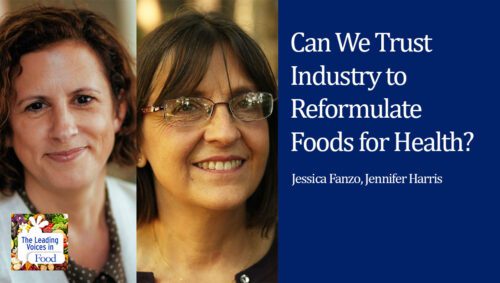 E108: Can we Trust Industry to Reformulate Food for Health?
E108: Can we Trust Industry to Reformulate Food for Health?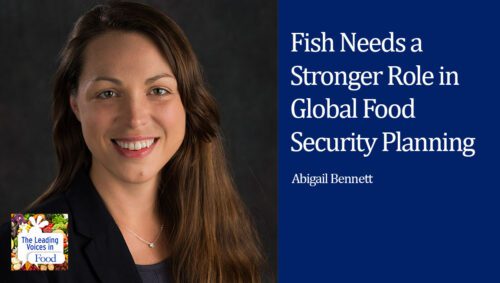 E107: Fish Need a Stronger Role in Global Food Security Planning
E107: Fish Need a Stronger Role in Global Food Security Planning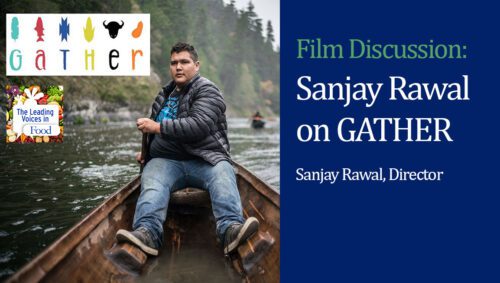 E103: Film Discussion – Sanjay Rawal on GATHER
E103: Film Discussion – Sanjay Rawal on GATHER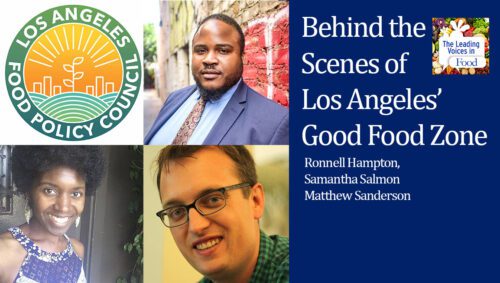 E106: Behind the Scenes of LA’s Good Food Zone Policy
E106: Behind the Scenes of LA’s Good Food Zone Policy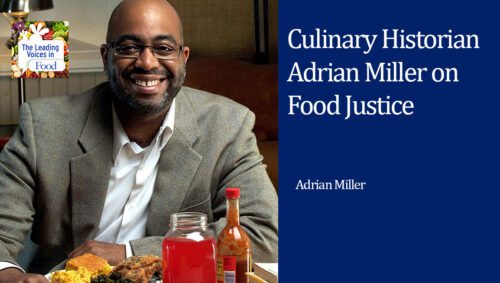 E105: Culinary Historian Adrian Miller on Food Justice
E105: Culinary Historian Adrian Miller on Food Justice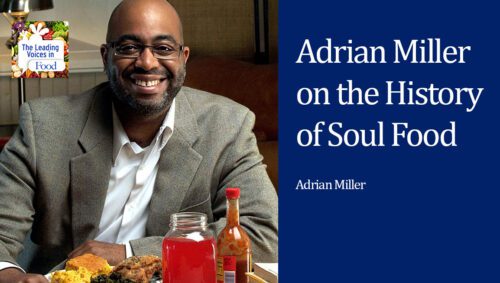 E104: Adrian Miller on the History of Soul Food
E104: Adrian Miller on the History of Soul Food E102: Lyla June on Returning to Native American Agricultural Traditions
E102: Lyla June on Returning to Native American Agricultural Traditions E101: Virginia Takes Equity Approach to Community Development Through Food
E101: Virginia Takes Equity Approach to Community Development Through Food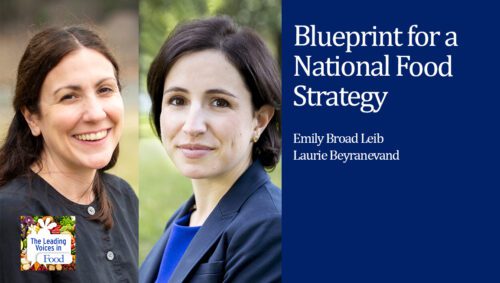 E100: Blueprint for a National US Food Strategy
E100: Blueprint for a National US Food Strategy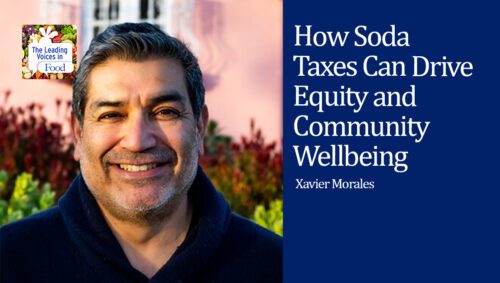 E99: How Soda Taxes Can Drive Equity and Community Wellbeing
E99: How Soda Taxes Can Drive Equity and Community Wellbeing E98: The COVID-19 Pandemic Response of No Kid Hungry
E98: The COVID-19 Pandemic Response of No Kid Hungry E97: Can a New Commission Jumpstart Progress Towards Zero Hunger?
E97: Can a New Commission Jumpstart Progress Towards Zero Hunger?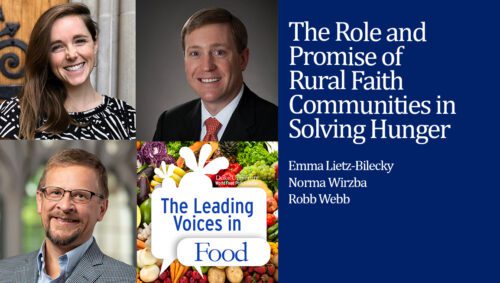 E96: The Role & Promise of Rural Faith Communities in Solving Hunger
E96: The Role & Promise of Rural Faith Communities in Solving Hunger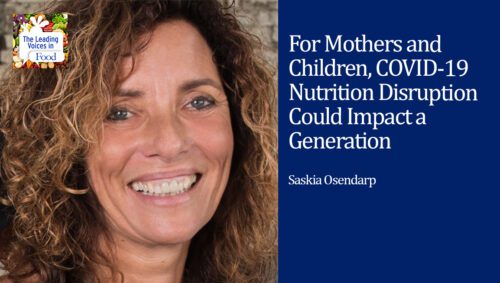 E95: COVID-19 Disruptions to Nutrition for Mothers and Children Could Cost the World a Generation
E95: COVID-19 Disruptions to Nutrition for Mothers and Children Could Cost the World a Generation E94: 8 Ways White Bias Can Misdirect Food System Work
E94: 8 Ways White Bias Can Misdirect Food System Work E88: How to Sugarproof Your Kids
E88: How to Sugarproof Your Kids E87: The Hidden Dangers of Sugar for your Kids
E87: The Hidden Dangers of Sugar for your Kids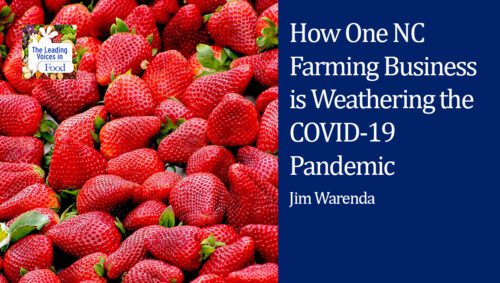 E86: How One NC Farming Business is Weathering the COVID-19 Pandemic
E86: How One NC Farming Business is Weathering the COVID-19 Pandemic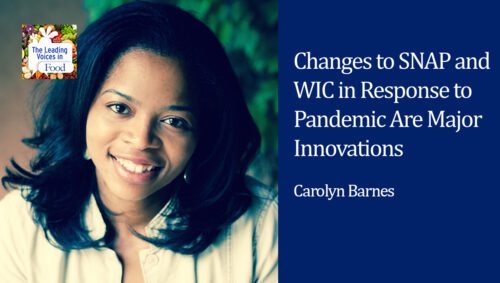 E85: Changes to SNAP and WIC in Response to the Pandemic are Innovations
E85: Changes to SNAP and WIC in Response to the Pandemic are Innovations E84: COVID Highlights Need to Change Food Security Strategy
E84: COVID Highlights Need to Change Food Security Strategy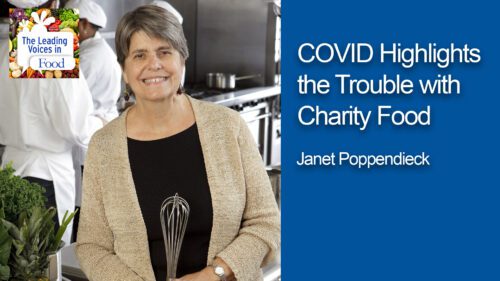 E80: Janet Poppendieck – COVID Highlights the Problems with Charity Food
E80: Janet Poppendieck – COVID Highlights the Problems with Charity Food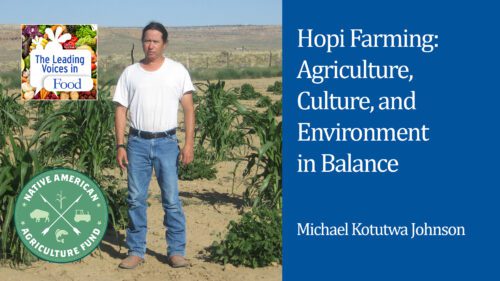 E83: Hopi Farming – Agriculture, Culture, and Environment in Balance
E83: Hopi Farming – Agriculture, Culture, and Environment in Balance E82: Rediscovering Navajo Indigenous Agricultural Wisdom
E82: Rediscovering Navajo Indigenous Agricultural Wisdom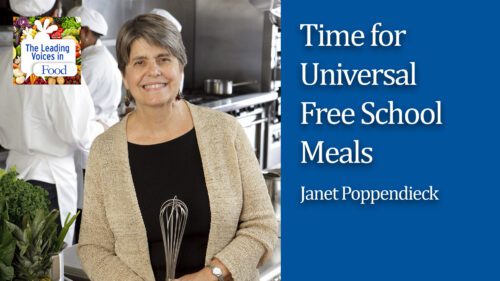 E81: Time for Universal Free School Meals
E81: Time for Universal Free School Meals E79: Andy Fisher on Exploring the Connection Between Industry and Food Banks
E79: Andy Fisher on Exploring the Connection Between Industry and Food Banks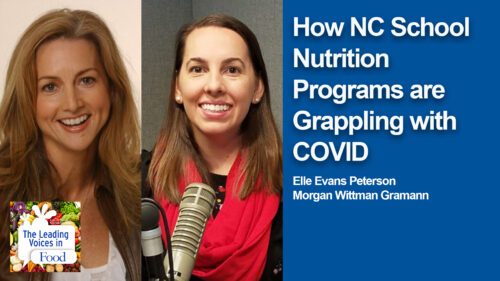 E78: How NC School Nutrition Programs are Grappling with Covid
E78: How NC School Nutrition Programs are Grappling with Covid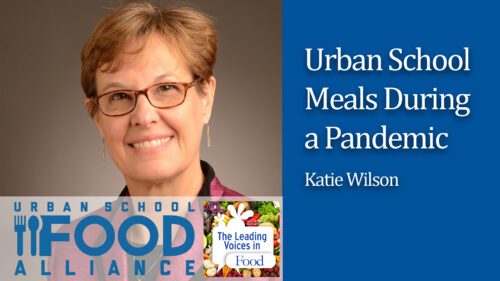 E77: School Meals During a Pandemic – What Works with Katie Wilson
E77: School Meals During a Pandemic – What Works with Katie Wilson E76: Food Fights – A Civil Conversation About Contemporary Food Debates
E76: Food Fights – A Civil Conversation About Contemporary Food Debates E75: Land Grant University Gold for North Carolina
E75: Land Grant University Gold for North Carolina E73: Weight Stigma 101 with Rebecca Pearl
E73: Weight Stigma 101 with Rebecca Pearl E71: Louise Metz on Weight Inclusive Medical Care
E71: Louise Metz on Weight Inclusive Medical Care E67: Weight Bullying Backfires and Causes Harm
E67: Weight Bullying Backfires and Causes Harm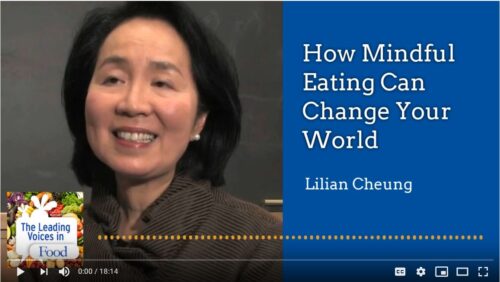 E74: How Eating Mindfully Can Change Your World
E74: How Eating Mindfully Can Change Your World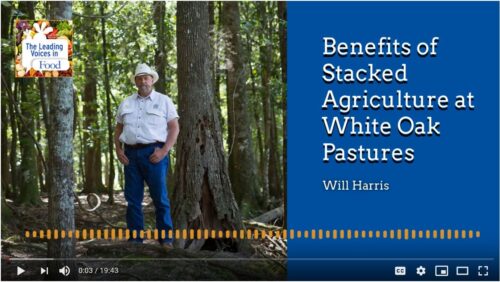 E72: Will Harris on White Oak Pastures Success with Regenerative Ag
E72: Will Harris on White Oak Pastures Success with Regenerative Ag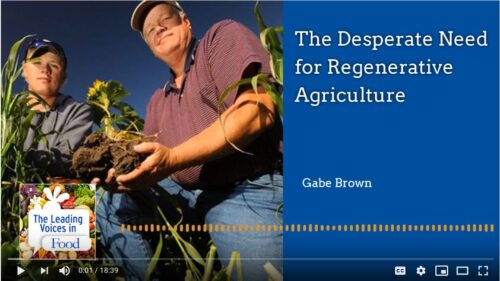 E69: Gabe Brown on the Desperate Need for Regenerative Agriculture
E69: Gabe Brown on the Desperate Need for Regenerative Agriculture E70: Myths and Misperceptions about the Pork Industry
E70: Myths and Misperceptions about the Pork Industry E61: Awilo Ochieng Pernet on the Global Complexity of Food Safety
E61: Awilo Ochieng Pernet on the Global Complexity of Food Safety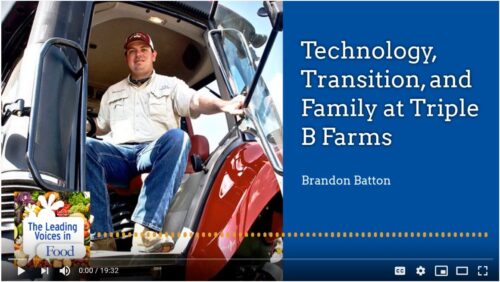 E64: Technology, Transition and Family at Triple B Farms
E64: Technology, Transition and Family at Triple B Farms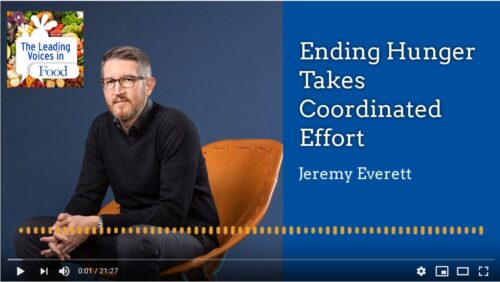 E66: Jeremy Everett: Ending Hunger Takes Coordinated Action
E66: Jeremy Everett: Ending Hunger Takes Coordinated Action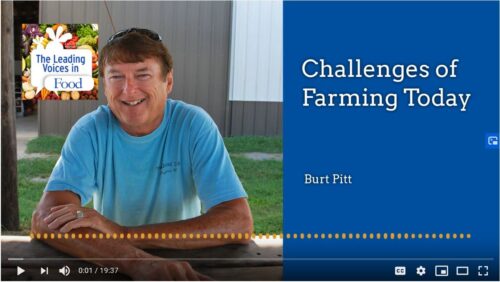 E62: Bert Pitt on Today’s Farming Challenges
E62: Bert Pitt on Today’s Farming Challenges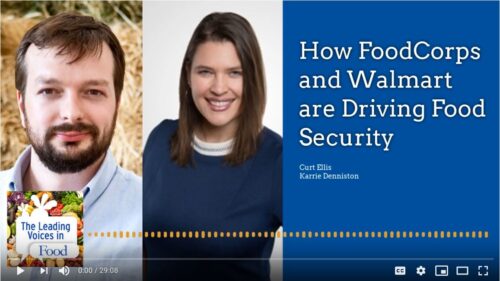 E57: How FoodCorps and Walmart are Driving Food Security in the US
E57: How FoodCorps and Walmart are Driving Food Security in the US E60: A Visit to Middlecreek Farms in the Blacklands of North Carolina
E60: A Visit to Middlecreek Farms in the Blacklands of North Carolina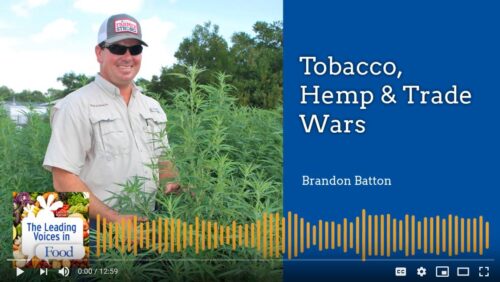 E68: Tobacco, Hemp & Trade Wars
E68: Tobacco, Hemp & Trade Wars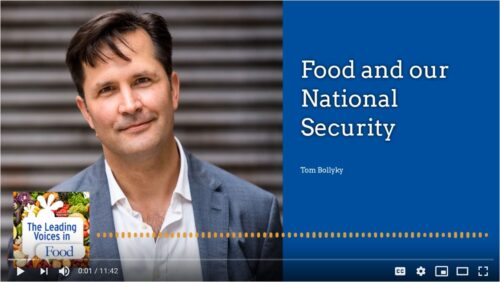 E57: Tom Bollyky on How Food Drives International Instability
E57: Tom Bollyky on How Food Drives International Instability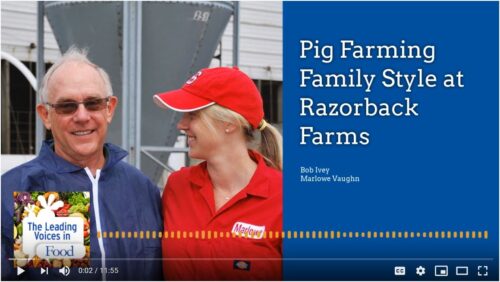 E58: Pig Farming Family Style at Razorback Farms
E58: Pig Farming Family Style at Razorback Farms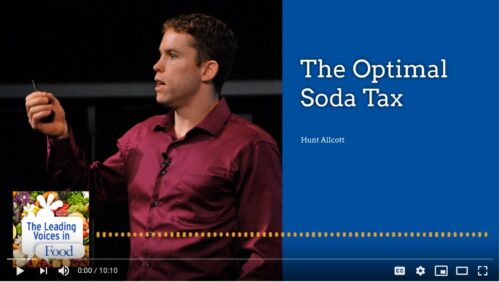 E59: Hunt Allcott on the Optimum Soda Tax
E59: Hunt Allcott on the Optimum Soda Tax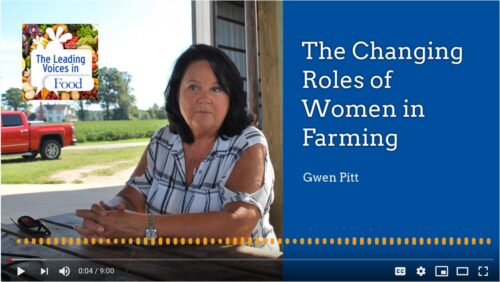 E56: Gwen Pitt on the Changing Roles of Women in Farming
E56: Gwen Pitt on the Changing Roles of Women in Farming E55: Allan Savory on Regenerative Agriculture
E55: Allan Savory on Regenerative Agriculture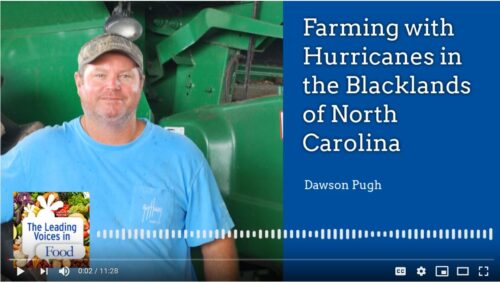 E54: Farming with Hurricanes in the Blacklands of North Carolina
E54: Farming with Hurricanes in the Blacklands of North Carolina E53: Michael Osterholm on Food Safety and Killer Germs
E53: Michael Osterholm on Food Safety and Killer Germs E52: Hogs and Hurricanes in North Carolina
E52: Hogs and Hurricanes in North Carolina E51: Neena Prasad on the Sound Benefits of Soda Taxes
E51: Neena Prasad on the Sound Benefits of Soda Taxes E50: Gwen’s Cotton
E50: Gwen’s Cotton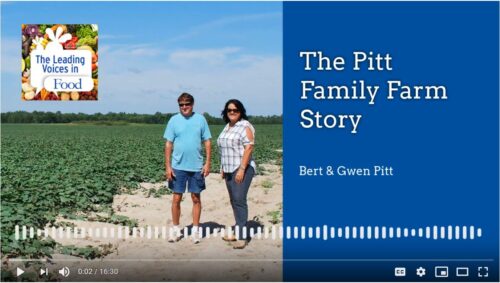 E49: Pitt Family Farm Story
E49: Pitt Family Farm Story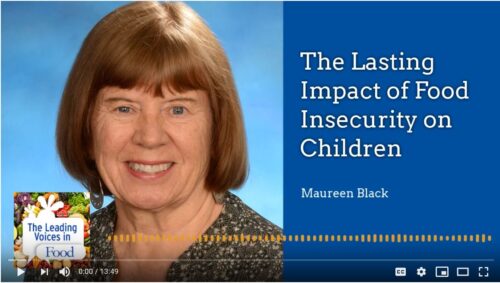 E48: Maureen Black on Lasting Impact of Food Insecurity on Children
E48: Maureen Black on Lasting Impact of Food Insecurity on Children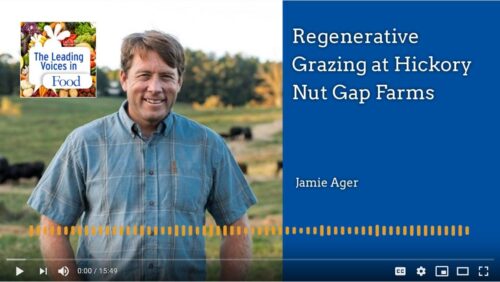 E47: Hickory Nut Gap Farm’s Jamie Ager on Regenerative Grazing
E47: Hickory Nut Gap Farm’s Jamie Ager on Regenerative Grazing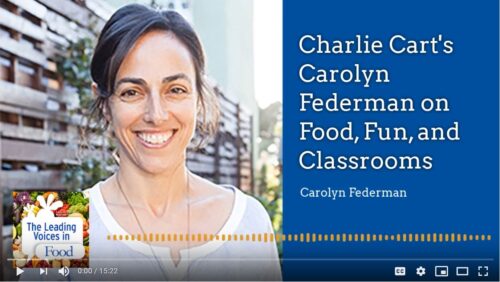 E46: Charlie Cart’s Carolyn Federman on Food, Fun, and Classrooms
E46: Charlie Cart’s Carolyn Federman on Food, Fun, and Classrooms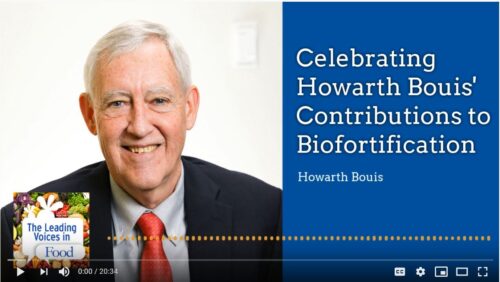 E45: Celebrating Howarth Bouis’ Contributions to Biofortification
E45: Celebrating Howarth Bouis’ Contributions to Biofortification E40: Cruel Impact of Weight Stigma
E40: Cruel Impact of Weight Stigma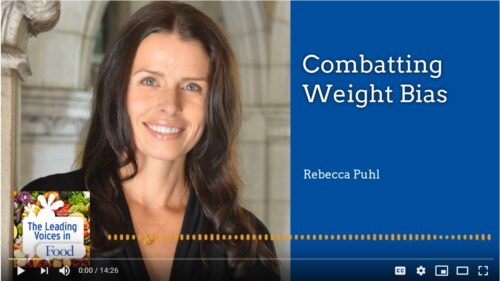 E41: Combatting Weight Bias
E41: Combatting Weight Bias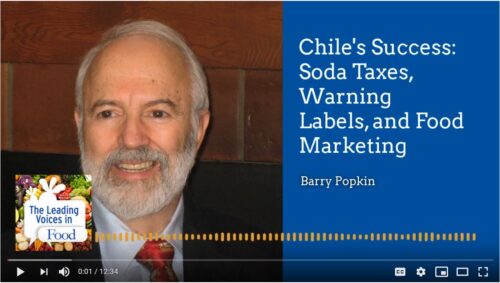 E44: Chile’s Health Strategy: Warning Labels, Soda Taxes, and Marketing Limits
E44: Chile’s Health Strategy: Warning Labels, Soda Taxes, and Marketing Limits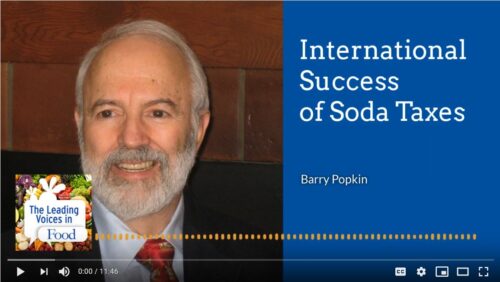 E43: Barry Popkin on the International Success of Soda Taxes
E43: Barry Popkin on the International Success of Soda Taxes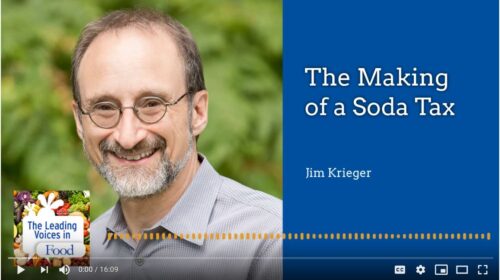 E42: Jim Krieger on the Making of a Soda Tax
E42: Jim Krieger on the Making of a Soda Tax E39: Rick Larrick on the Hidden Energy Cost of our Food
E39: Rick Larrick on the Hidden Energy Cost of our Food E38: Diego Rose on Environmental Sustainability and our Food
E38: Diego Rose on Environmental Sustainability and our Food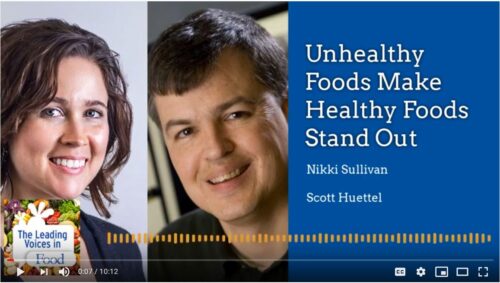 E37: Unhealthy Foods Make Healthy Foods Stand Out
E37: Unhealthy Foods Make Healthy Foods Stand Out E36: Amy Kircher on Food Fraud, Pomegranates & Baby Formula
E36: Amy Kircher on Food Fraud, Pomegranates & Baby Formula E29: Linda Bartoshuk on Supertasters, Yuck, and the Future of Food Nutrition
E29: Linda Bartoshuk on Supertasters, Yuck, and the Future of Food Nutrition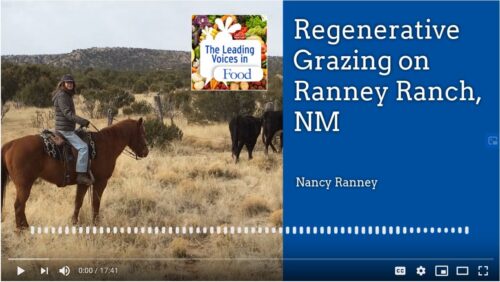 E28: Nancy Ranney on Regenerative Grazing in New Mexico
E28: Nancy Ranney on Regenerative Grazing in New Mexico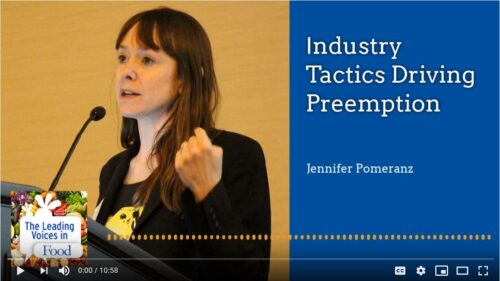 E35: Jennifer Pomeranz on Food Policy and Industry Tactics Driving Preemption
E35: Jennifer Pomeranz on Food Policy and Industry Tactics Driving Preemption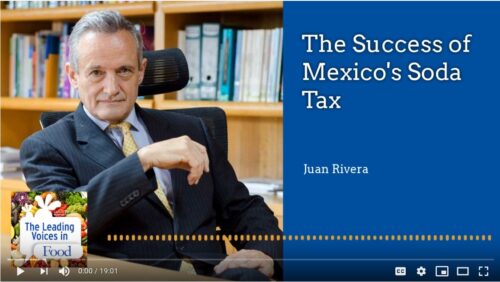 E34: Juan Rivera on the Success of Mexico’s Soda Tax
E34: Juan Rivera on the Success of Mexico’s Soda Tax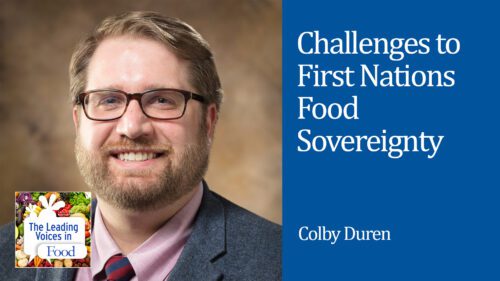 E21: Colby Duren on Challenges to First Nations Food Sovereignty
E21: Colby Duren on Challenges to First Nations Food Sovereignty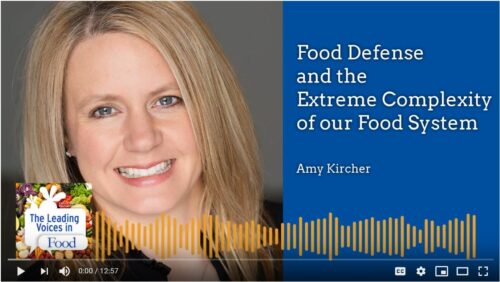 E33: Food Defense and the Extreme Complexity of our Food Supply Chain
E33: Food Defense and the Extreme Complexity of our Food Supply Chain E32: Food Defense 101 with Amy Kircher
E32: Food Defense 101 with Amy Kircher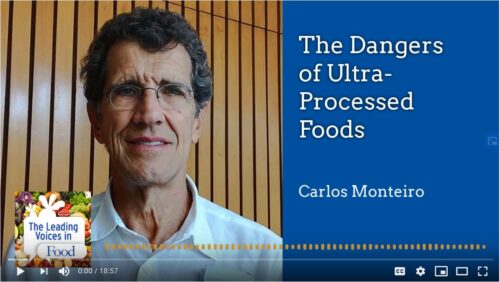 E24: Carlos Monteiro on the Dangers of Ultra-processed Foods
E24: Carlos Monteiro on the Dangers of Ultra-processed Foods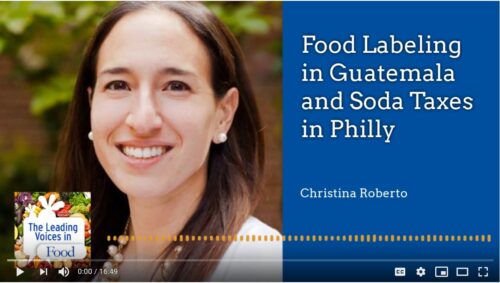 E30: Christina Roberto on Food Labeling in Guatemala and Soda Taxes in Philly
E30: Christina Roberto on Food Labeling in Guatemala and Soda Taxes in Philly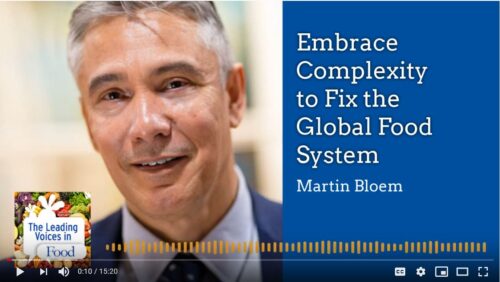 E19: Martin Bloem – Embrace Complexity to Fix the Food System
E19: Martin Bloem – Embrace Complexity to Fix the Food System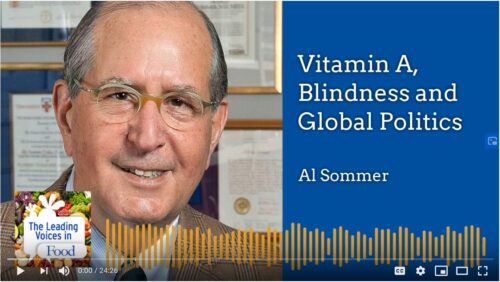 E23: Al Sommer on Vitamin A, Blindness and Global Politics
E23: Al Sommer on Vitamin A, Blindness and Global Politics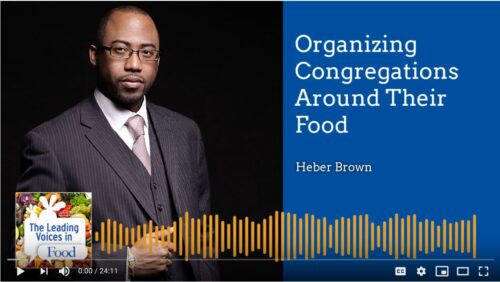 E22: Heber Brown on Organizing Communities Around Their Food
E22: Heber Brown on Organizing Communities Around Their Food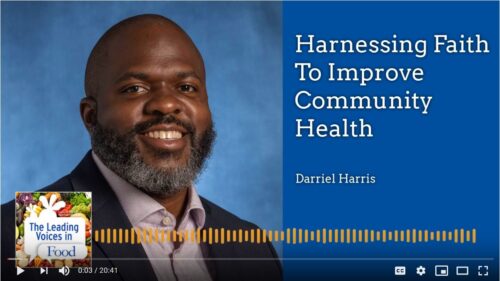 E20: Darriel Harris on Harnessing Faith to Improve Community Health
E20: Darriel Harris on Harnessing Faith to Improve Community Health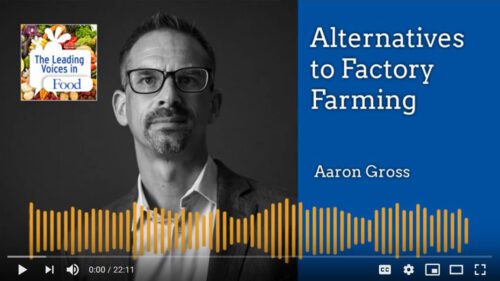 E26: Aaron Gross on Factory Farming and New Ways to Support Farmers
E26: Aaron Gross on Factory Farming and New Ways to Support Farmers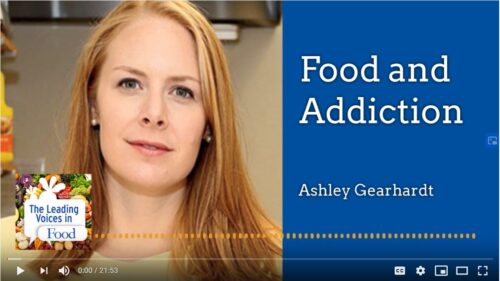 E18: Ashley Gearhardt on Food Addiction and You…Yes, You.
E18: Ashley Gearhardt on Food Addiction and You…Yes, You. E27: William Dietz on Obesity, Undernutrition & Climate Change
E27: William Dietz on Obesity, Undernutrition & Climate Change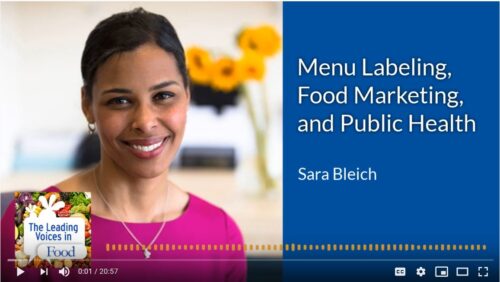 E16: Sara Bleich on Menu Labeling, Marketing and Public Health
E16: Sara Bleich on Menu Labeling, Marketing and Public Health E17: Cheryl Queen on Corporate Responsibility and Power in the Food Industry
E17: Cheryl Queen on Corporate Responsibility and Power in the Food Industry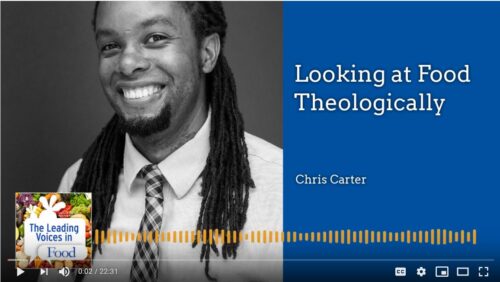 E25: Christopher Carter on Looking at Food Theologically
E25: Christopher Carter on Looking at Food Theologically E14: Nurya Love Parish on a Calling to Steward our Lands
E14: Nurya Love Parish on a Calling to Steward our Lands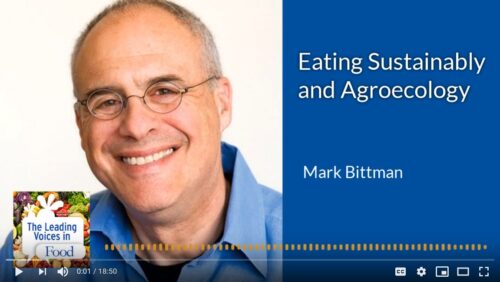 E13: Mark Bittman on Eating Sustainably and Agroecology
E13: Mark Bittman on Eating Sustainably and Agroecology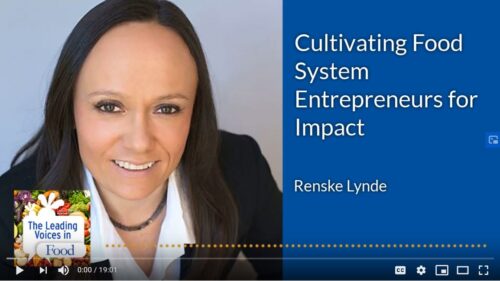 E12: Renske Lynde on Cultivating Food System Entrepreneurs for Impact
E12: Renske Lynde on Cultivating Food System Entrepreneurs for Impact E11: Kornegay Farms’ Kim LeQuire on the Blessings of a Life in Agriculture
E11: Kornegay Farms’ Kim LeQuire on the Blessings of a Life in Agriculture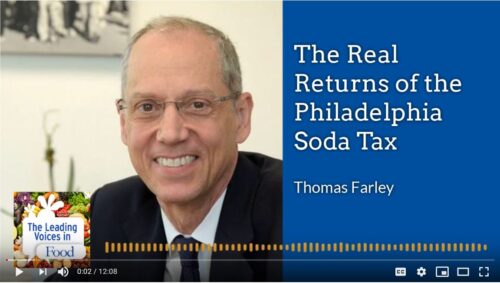 E7: Thomas Farley on the Real Returns of the Philadelphia Soda Tax
E7: Thomas Farley on the Real Returns of the Philadelphia Soda Tax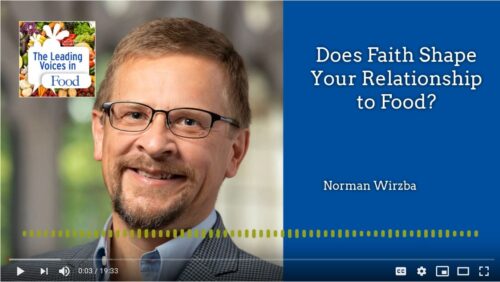 E08: Norman Wirzba: Does Faith Shape your Relationship to Food?
E08: Norman Wirzba: Does Faith Shape your Relationship to Food? E6: Shiriki Kumanyika on the Disparities in our Food
E6: Shiriki Kumanyika on the Disparities in our Food E3: Marion Hetherington on Kids, Vegetables and Appetite
E3: Marion Hetherington on Kids, Vegetables and Appetite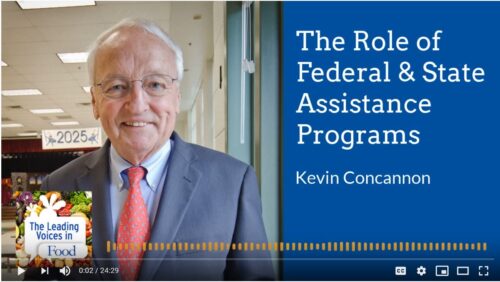 E5: Kevin Concannon on the Role of Federal & State Food Assistance Programs
E5: Kevin Concannon on the Role of Federal & State Food Assistance Programs E4: Billy Shore on Politics, Food and our Children’s Future
E4: Billy Shore on Politics, Food and our Children’s Future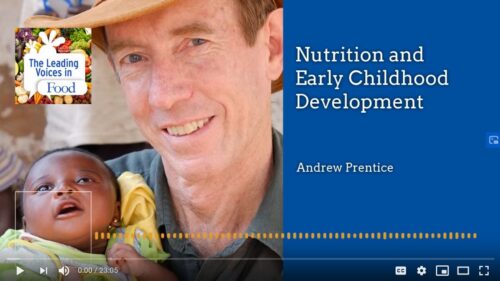 E2: Andrew Prentice on the Genetic Legacy of our Nutrition
E2: Andrew Prentice on the Genetic Legacy of our Nutrition E15: Hisham Moharram Talks Agripreneurship and The Good Tree
E15: Hisham Moharram Talks Agripreneurship and The Good Tree E9: A’dae Romero-Briones on First Nations Food Systems
E9: A’dae Romero-Briones on First Nations Food Systems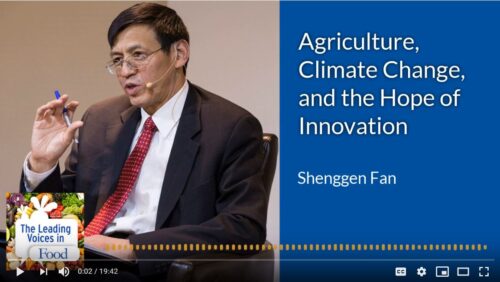 E6: Shenggen Fan on Hunger, Climate Change and the Hope of Innovation
E6: Shenggen Fan on Hunger, Climate Change and the Hope of Innovation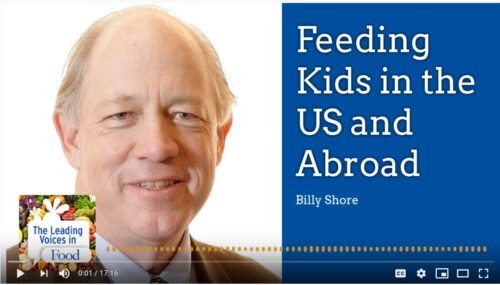 E1: Billy Shore on Feeding Kids in the US and Abroad
E1: Billy Shore on Feeding Kids in the US and Abroad